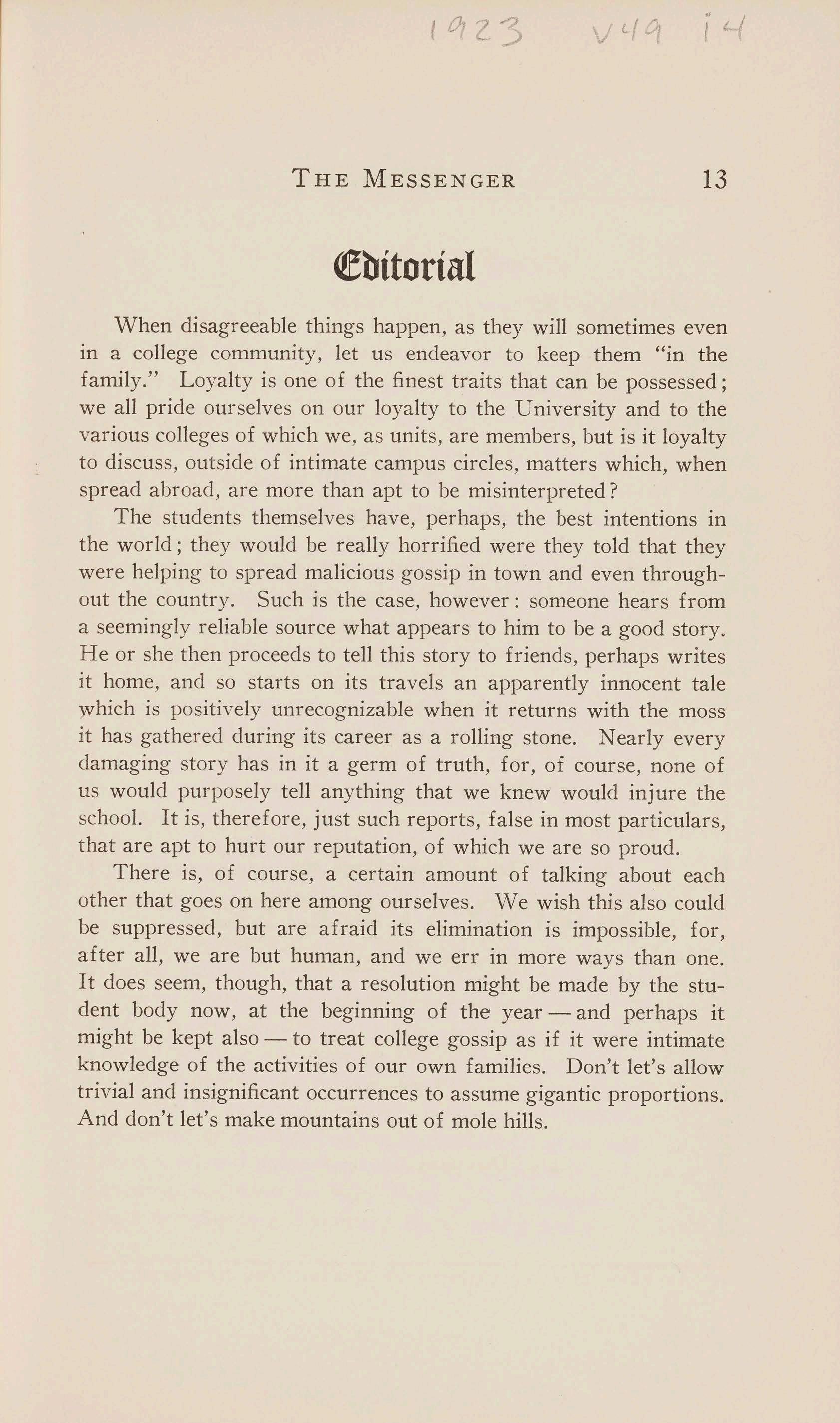

~bttortal
When disagreeable things happen, as they will sometimes even in a college community, let us endeavor to keep them "in the family." Loyalty is one of the finest traits that can be possessed; we all pride ourse lves on our loyalty to the University and to the various colleges of which we, as units, are members, but is it loyalty to discuss, outside of intimate campus circles, matters which, when spread abroad, are more than apt to be misinterpreted?
The students themselves have, perhaps, the best intentions in the world; they would be really horrified were they told that they were helping to spread malicious gossip in town and even throughout the country. Such is the case, however: someone hears from a seemingly reliable source what appears to him to be a good story. He or she then proceeds to tell this story to friends, perhaps writes it home, and so starts on its travels an apparently innocent tale which is positive ly unrecognizable when it returns with the moss it has gathered cluring its career as a rolling stone. Nearly every damaging story has in it a germ of truth, for, of course, none of us would purposely tell anything that we knew would injure the school. It is , therefore, just such reports, false in most particulars, that are apt to hurt our reputation, of which we are so proud.
There is, of course, a certain amount of talking about each other that goes on here among ourselves. We wish this also could be suppressed, but are afraid its elimination is impossible, for, after all, we are but human, and we err in more ways than one. It does seem, though, that a resolution might be made by the student body now, at the beginning of the year - and perhaps it might be kept also -to treat college gossip as if it were intimate knowledge of the activities of our own families. Don't let's allow trivial and insignificant occurrences to assume gigantic proportions. And don't let's make mountains out of mole hills.
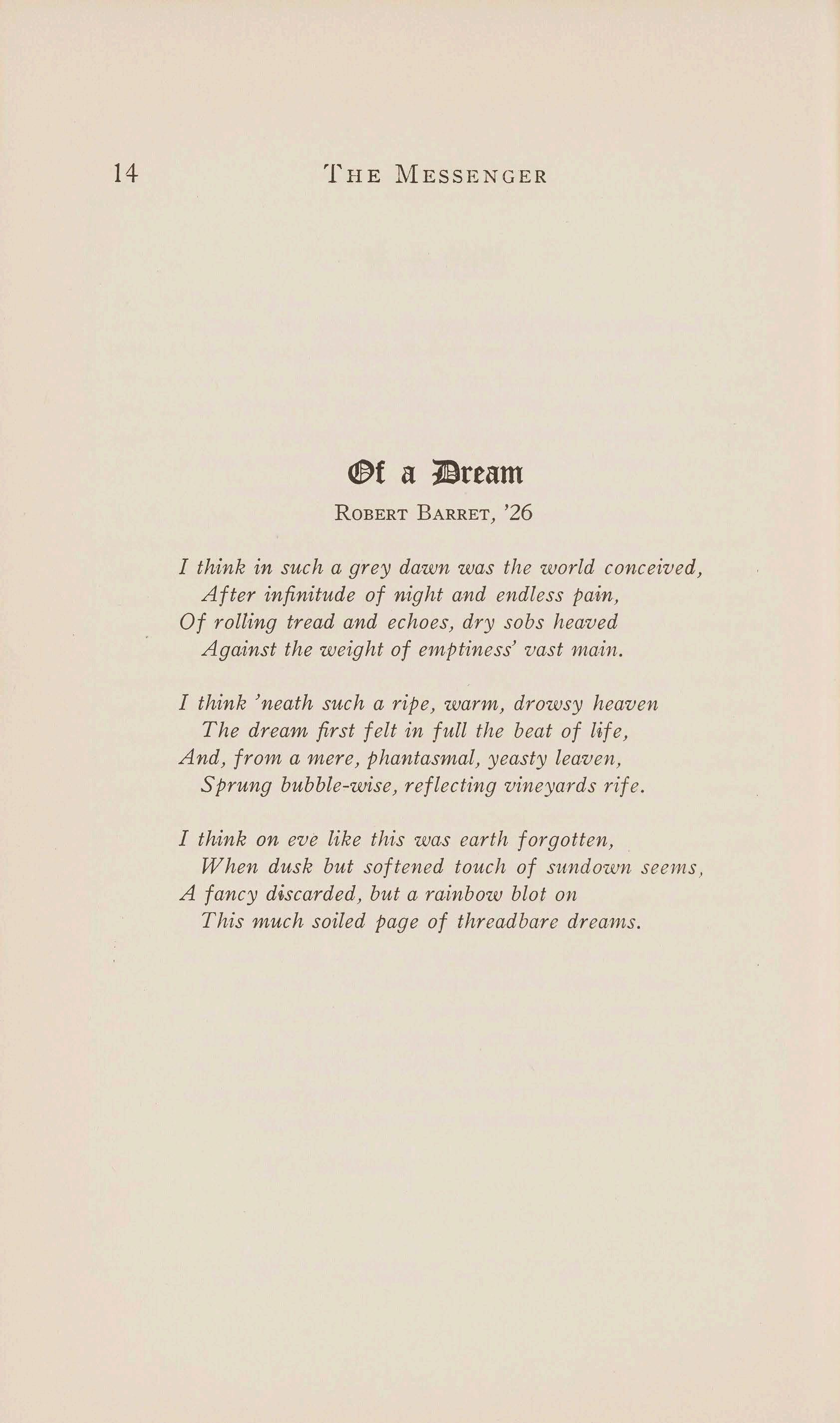
®f a i)ream
ROBERT BARRET, '26
I think in such a grey dawn was the world conceived, After infinitude of night and endless pain, Of rolling tread and echoes, dry sobs heaved Against the weight of emptiness' vast main.
I think 'neath such a ripe, warm, drowsy heaven The dream first felt in full the beat of life, And, from a mere, phantasmal, yeasty leaven, Sprung bubble-wise, reflecting vineyards rife.
I think on eve like this was earth forgotten, When dusk but softened touch of sundown seems, A fancy discarded, but a rainbow blot on This much soiled page of threadbare dreams.
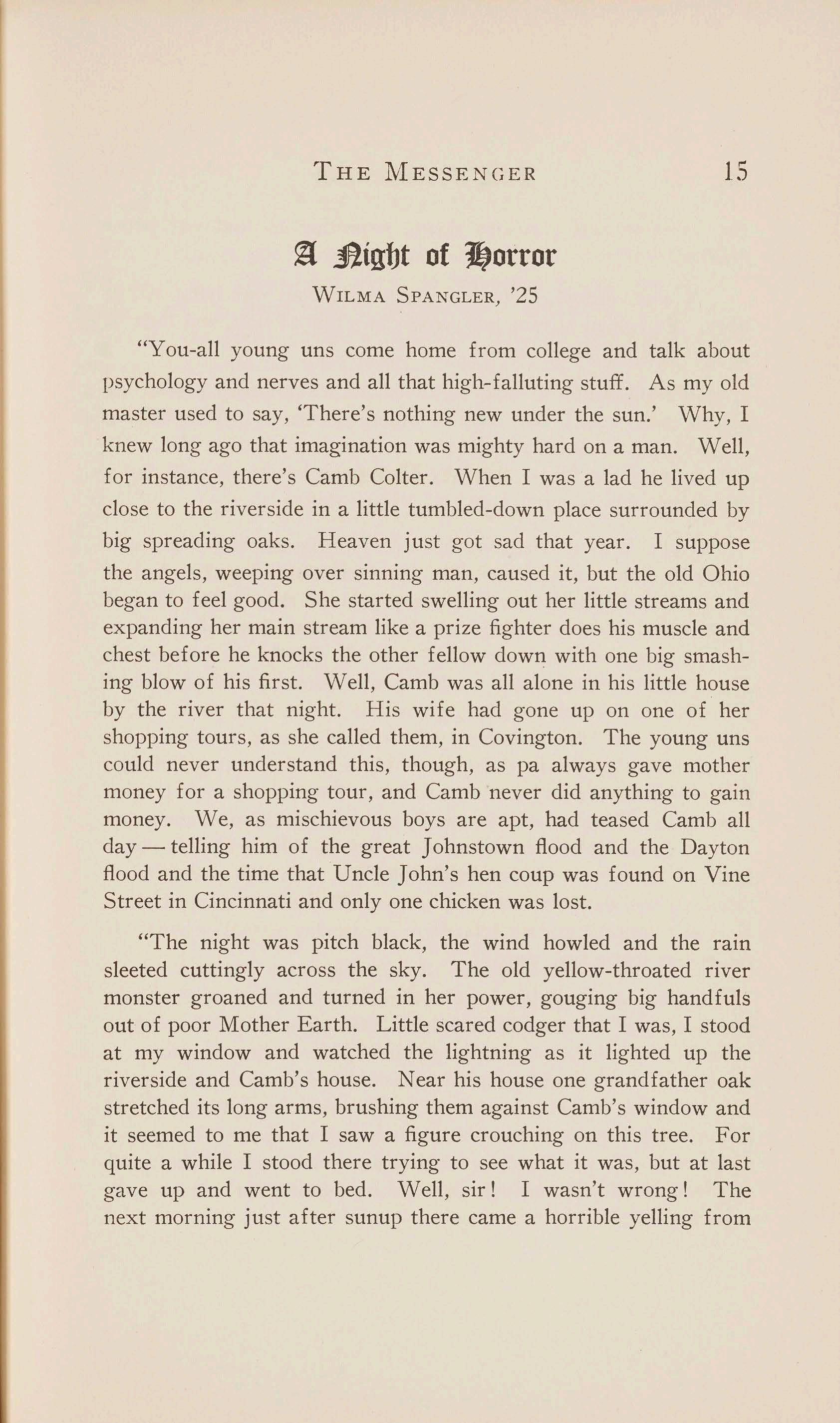
Jligbt of l!}orror
WILMA SPANGLER, '25
"You-all young uns come home from college and talk about psychology and nerves and all that high-falluting stuff. As my old master used to say, 'There's nothing new under the sun.' Why, I knew long ago that imagination was mighty hard on a man. Well, for instance, there's Camb Colter. \i\Then I was a lad he lived up close to the riverside in a little tumbled-down place surrounded by big spreading oaks. Heaven just got sad that year. I suppose the angels, weeping over sinning man, caused it, but the old Ohio began to feel good. She started swelling out her little streams and expanding her main stream like a prize fighter does his muscle and chest before he knocks the other fell ow down with one big smashing blow of his first. Well, Camb was all alone in his little house by the river that night. His wife had gone up on one of her shopping tours, as she called them, in Covington. The young uns could never understand this, though, as pa always gave mother money for a shopping tour, and Camb never did anything to gain money. We, as mischievous boys are apt, had teased Camb all day - telling him of the great Johnstown flood and the Dayton flood and the time that Uncle John's hen coup was found on Vine Street in Cincinnati and only one chicken was lost.
"The night was pitch black, the wind howled and the rain sleeted cuttingly across the sky. The old yellow-throated river monster groaned and turned in her power, gouging big handfuls out of poor Mother Earth. Little scared codger that I was, I stood at my window and watched the lightning as it lighted up the riverside and Camb's house. Near his house one grandfather oak stretched its long arms, brushing them against Camb's window and it seemed to me that I saw a figure crouching on this tree. For quite a while I stood there trying to see what it was, but at last gave up and went to bed. Well, sir! I wasn't wrong! The next morning just after sunup there came a horrible yelling from
16
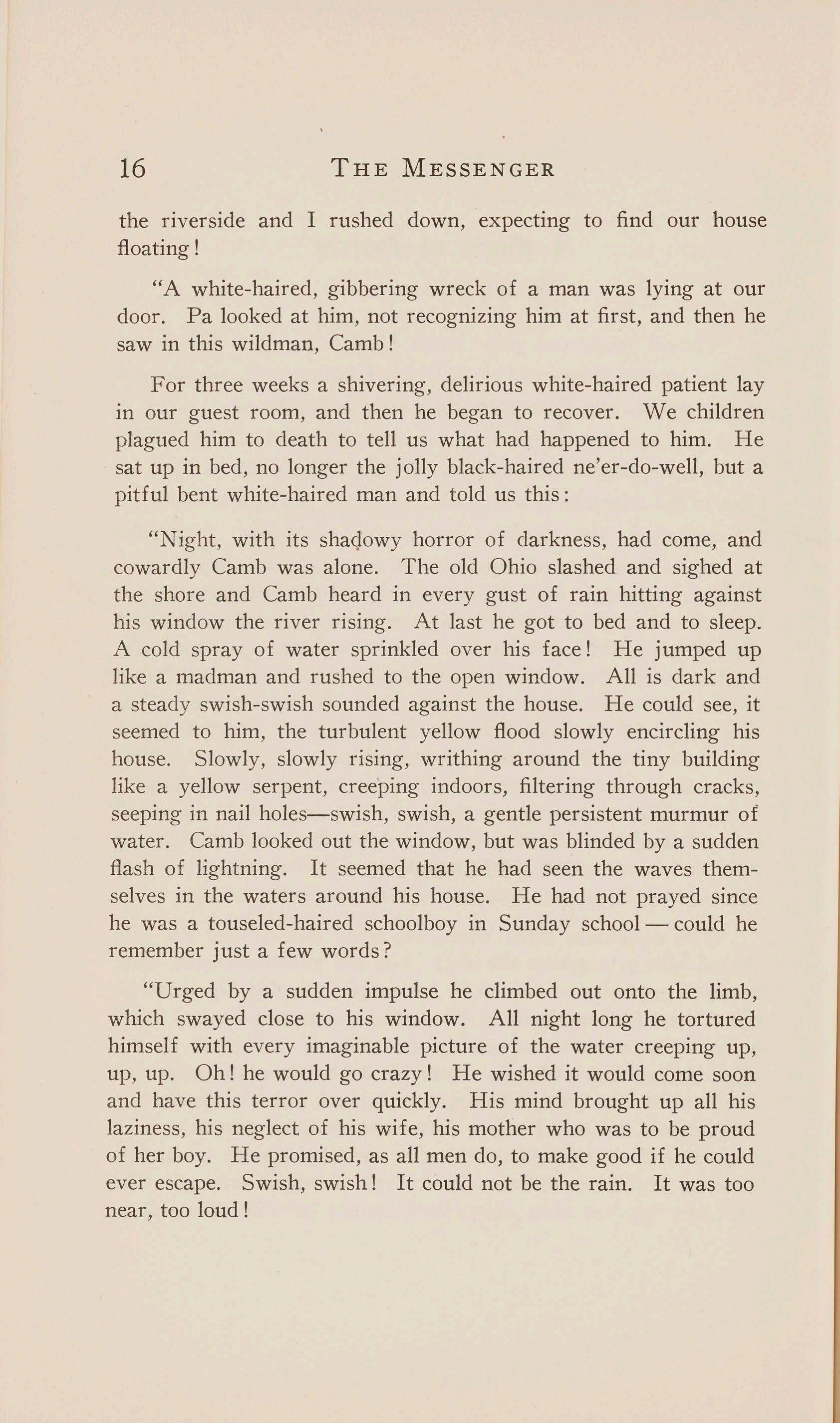
THE MESSENGER
the riverside and I rushed down, expecting to find our house floating!
"A white-haired, gibbering wreck of a man was lying at our door. Pa looked at him, not recognizing him at first, and then he saw in this wildman, Camb !
For three weeks a shivering, delirious white-haired patient lay m our guest room, and then he began to recover. We children plagued him to death to tell us what had happened to him. He sat up in bed, no longer the jolly black-haired ne'er-do-well, but a pitful bent white-haired man and told us this:
"Night, with its shatjowy horror of darkness, had come, and cowardly Camb was alone. The old Ohio slashed and sighed at the shore and Camb heard in every gust of rain hitting against his window the river rising. At last he got to bed and to sleep. A cold spray of water sprinkled over his face! He jumped up like a madman and rushed to the open window. All is dark and a stead y swish-swish sounded against the house. He could see, it seemed to him, the turbulent yellow flood slowly encircling his house. Slowly, slowly rising, writhing around the tiny building like a yellow serpent, creeping indoors, filtering through cracks, seeping in nail holes-swish, swish, a gentle persistent murmur of water. Camb looked out the window, but was blinded by a sudden flash of lightning. It seemed that he had seen the waves themselves in the waters around his house. He had not prayed since he was a touseled-haired schoolboy in Sunday school -could he remember just a few words?
"Urged by a sudden impulse he climbed out onto the limb, which swayed close to his window. All night long he tortured himself with every imaginable picture of the water creeping up, up , up . Oh! he would go crazy ! He wished it would come soon and have this terror over quickly. His mind brought up all his laziness, his neglect of his wife, his mother who was to be proud of her boy. He promised, as all men do, to make good if he could ever escape. Swish, swish! It could not be the rain. It was too near, too loud !
"The rain stopped towards morning, yet the persistent sound still lingered. Dawn was never so welcome; a seen horror is much easier to stand than a hidden one. Camb looked below. There lay the green ground with smiling daffodils swaying in the breeze. He could not understand! Swish, swish. He traced the noise to beside him, and there a stream of water was still running down the gutter pipe, a la st reminder of the rain!"
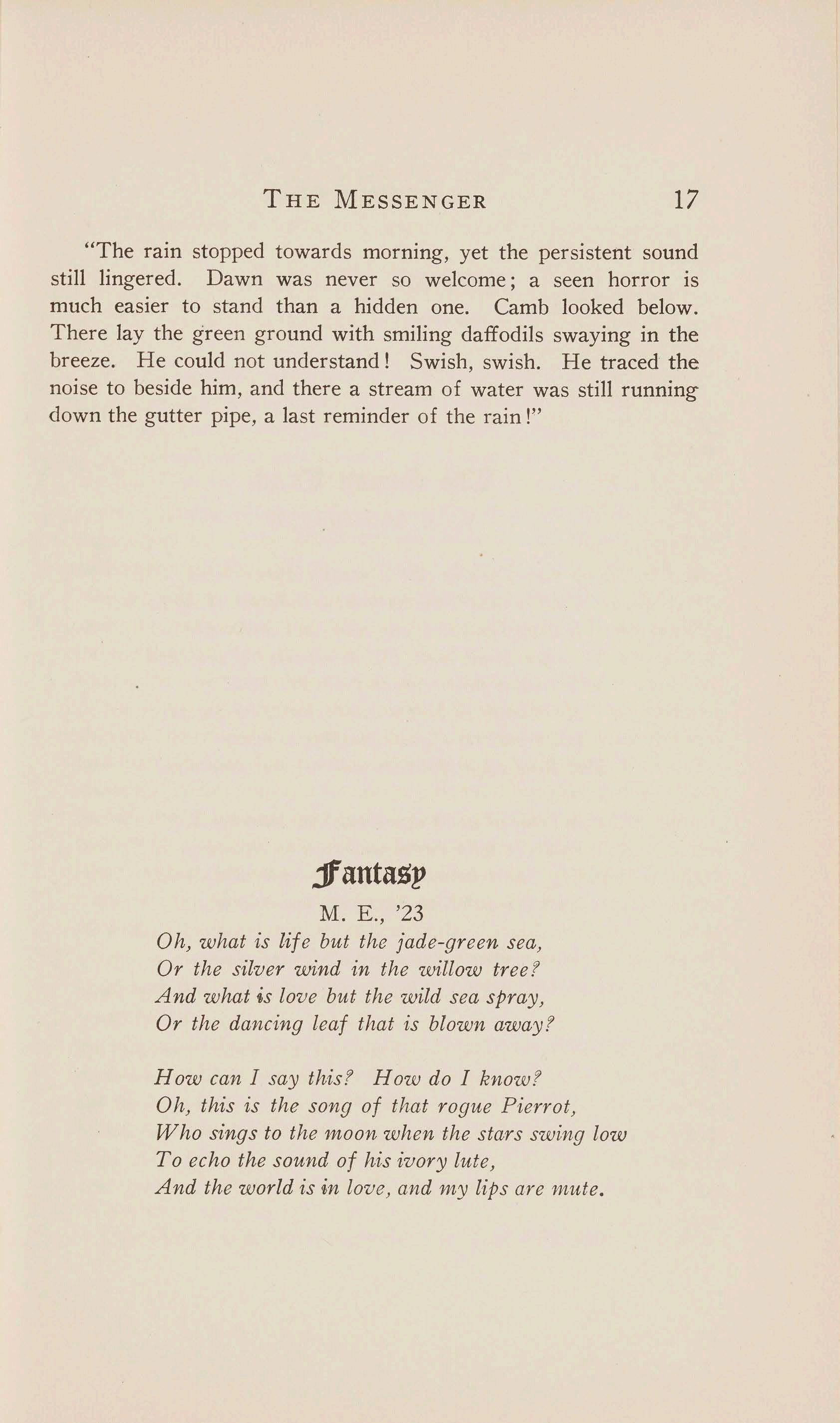
jfanta~!'
M. E., ' 23
Oh, what is life but the jade-green sea, Or the silver wind in the willow tree ? And what ts lov e but the wild s ea spray, Or the dancing leaf that is blown away ?
How can I say this ? How do I kno w?
Oh , this is the song of that rogue Pierrot , Who sings to the moon when the stars swing low To echo the sound of his ivory lute , And the world is in lov e, and my lips are mute.
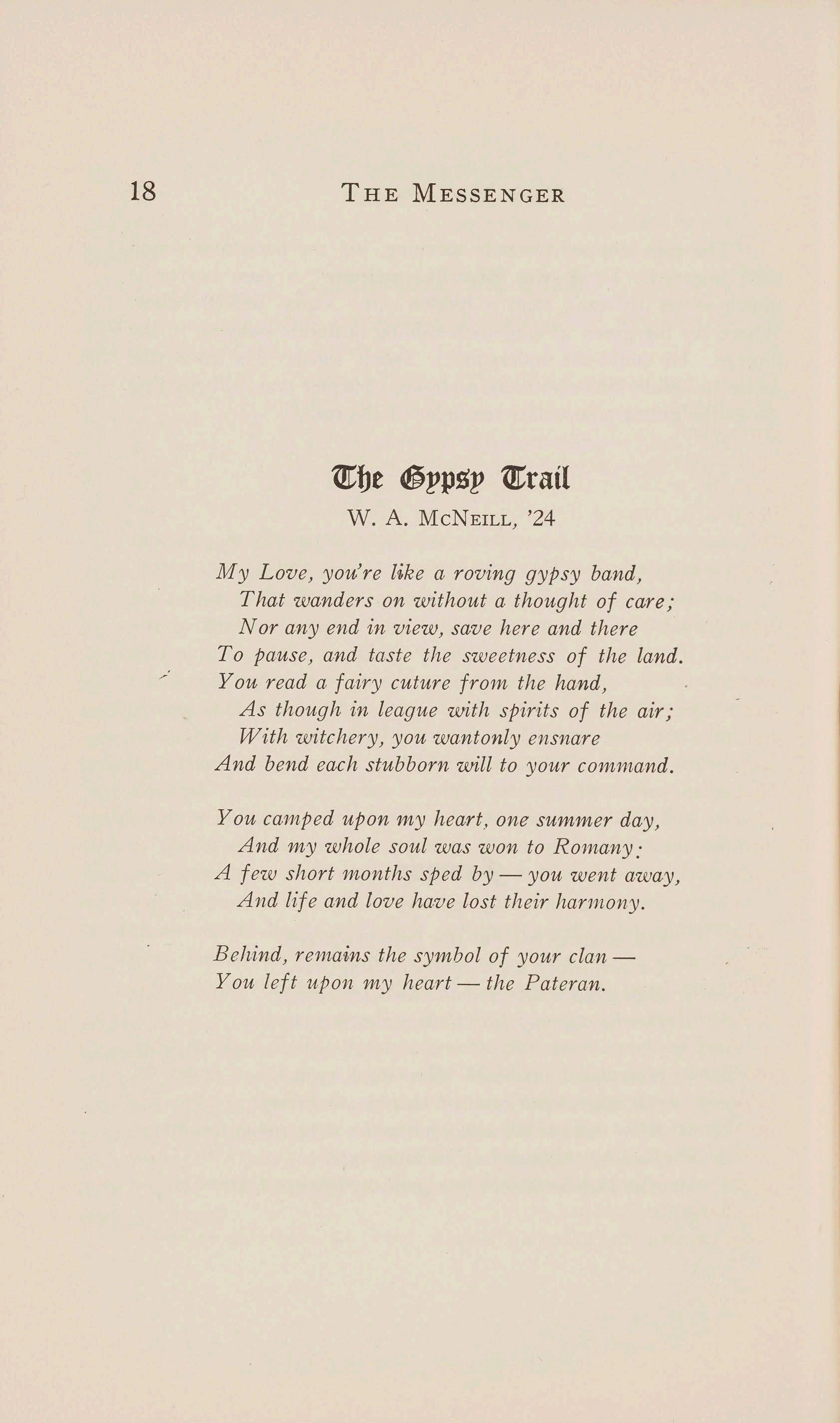
m'.bt~!'P~!' m'.rail
w. A. MCNEILL, '24
My Love , you're like a roving gypsy band, That wanders on without a thought of care; Nor any end in view, save here and there To pause , and taste the sweetness of the land. You read a fairy cuture from the hand, As though in league with spirits of the air; With witchery, you wantonly ensnare And bend each stubborn will to your command.
You caniped upon my heart , one summer day, And my whole soul was won to Romany: A few short months sped by-you went away, And life and love have lost their hannony .
Behind, remains the symbol of your clanYou left upon my heart - the Pateran.
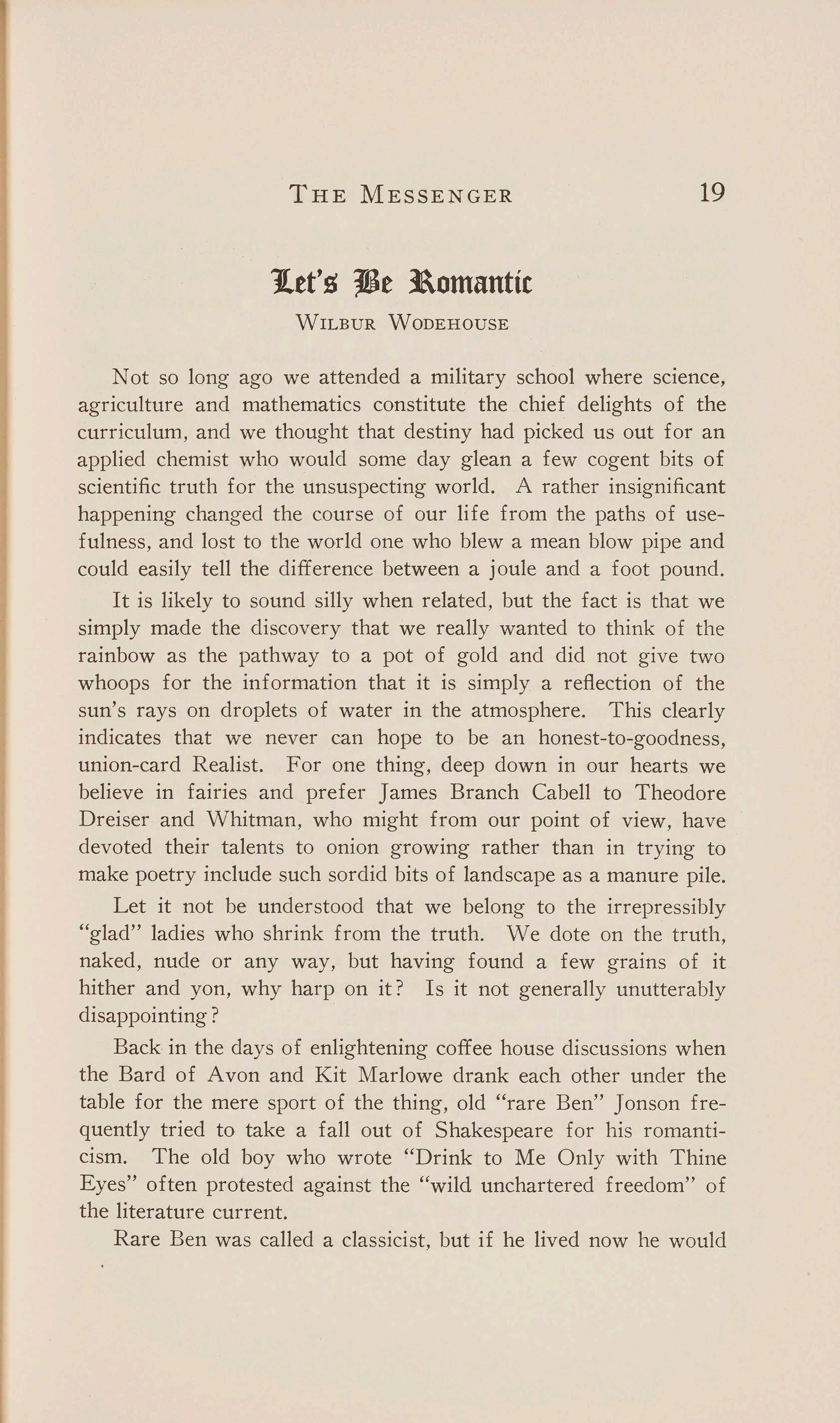
1Ltt'!i,St Romantic
WILBUR WODEHOUSE
Not so long ago we attended a military school where science, agriculture and mathematics constitute the chief delights of the curriculum, and we thought that destiny had picked us out for an applied chemist who would some day glean a few cogent bits of scientific truth for the unsuspecting world. A rather insignificant happening changed the course of our life from the paths of usefulness, and lost to the world one who blew a mean blow pipe and could easily tell the difference between a joule and a foot pound.
It is likely to sound silly when related, but the fact is that we simply made the discovery that we really wanted to think of the rainbow as the pathway to a pot of gold and did not give two whoops for the information that it is simply a reflection of the sun's rays on droplets of water in the atmosphere. This clearly indicates that we never can hope to be an honest-to-goodness, union-card Realist. For one thing, deep down in our hearts we believe in fairies and pref er James Branch Cabell to Theodore Dreiser and Whitman, who might from our point of view, have devoted their talents to onion growing rather than in trying to make poetry include such sordid bits of landscape as a manure pile.
Let it not be understood that we belong to the irrepressibly "glad" ladies who shrink from the truth. We dote on the truth, naked, nude or any way, but having found a few grains of it hither and yon, why harp on it? Is it not generally unutterably disappointing?
Back in the days of enlightening coffee house discussions when the Bard of Avon and Kit Marlowe drank each other under the table for the mere sport of the thing, old "rare Ben" Jonson frequently tried to take a fall out of Shakespeare for his romanticism. The old boy who wrote "Drink to Me Only with Thine Eyes" often protested against the "wild unchartered freedom" of the literature current.
Rare Ben was called a classicist, but if he lived now he would
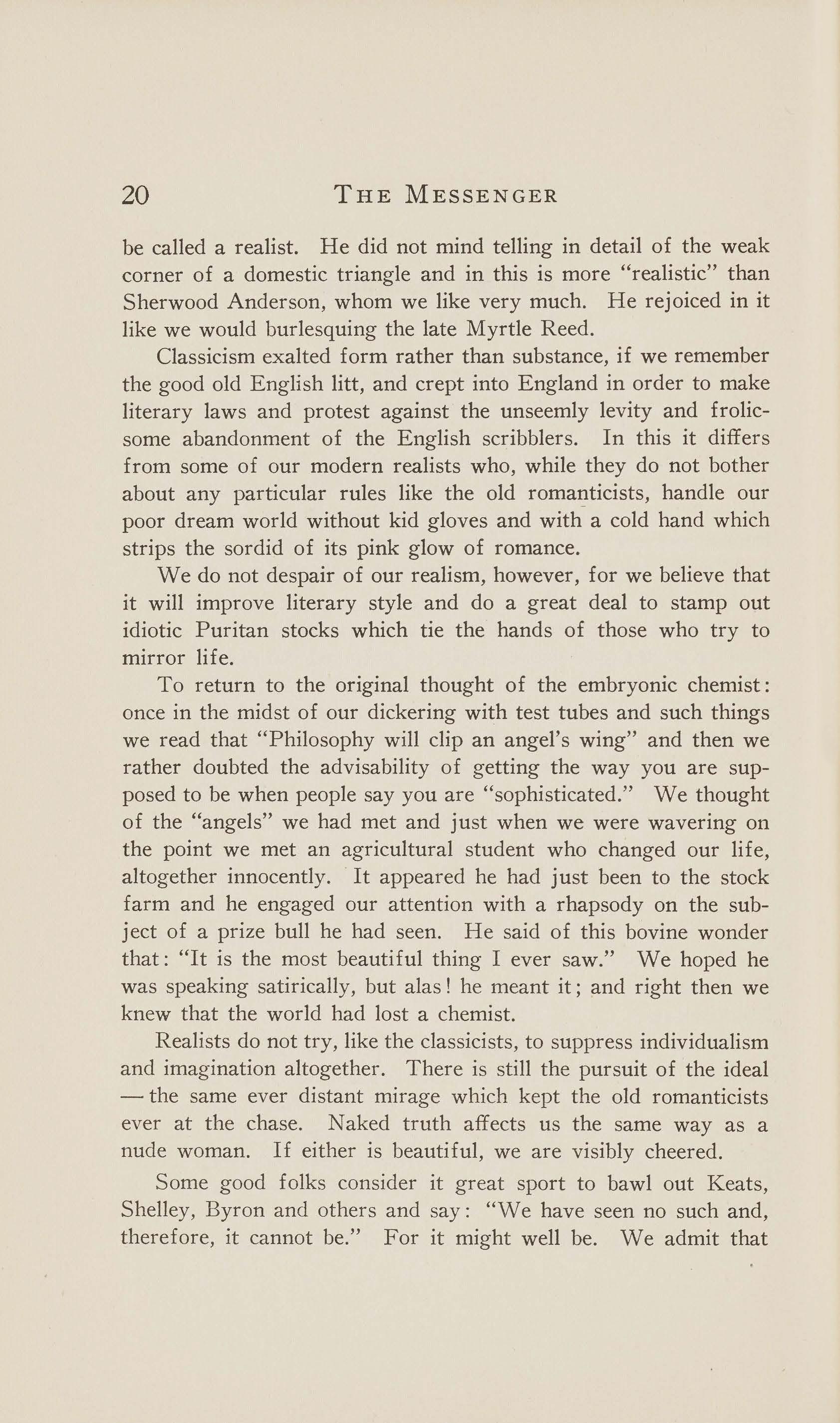
THE MESSENGER
be called a realist. He did not mind telling in detail of the weak corner of a domestic triangle and in this is more "realistic" than Sherwood Anderson, whom we like very much. He rejoiced in it like we would burlesquing the late Myrtle Reed.
Classicism exalted form rather than substance, if we remember the good old English litt, and crept into England in order to make literary laws and protest against the unseemly levity and frolicsome abandonment of the English scribblers. In this it differs from some of our modern realists who, while they do not bother about any particular rules like the old romal_!ticists, handle our poor dream world without kid gloves and with a cold hand which strips the sordid of its pink glow of romance.
We do not despair of our realism, however, for we believe that it will improve literary style and do a great deal to stamp out idiotic Puritan stocks which tie the hands of those who try to mirror life.
To return to the original thought of the embryonic chemist: once in the midst of our dickering with test tubes and such things we read that "Philosophy will clip an angel's wing" and then we rather doubted the advisability of getting the way you are supposed to be when people say you are "sophisticated ." We thought of the "angels" we had met and just when we were wavering on the point we met an agricultural student who changed our life, altogether innocently. It appeared he had just been to the stock farm and he engaged our attention with a rhapsody on the subject of a prize bull he had seen. He said of this bovine wonder that: "It is the most beautiful thing I ever saw." We hoped he was speaking satirically, but alas! he meant it; and right then we knew that the world had lost a chemist.
Realists do not try, like the classicists, to suppress individualism and imagination altogether. There is still the pursuit of the ideal -the same ever distant mirage which kept the old romanticists ever at the chase. Naked truth affects us the same way as a nude woman. If either is beautiful, we are visibly cheered.
Some good folks consider it great sport to bawl out Keats, Shelley, Byron and others and say : "We have seen no such and, therefore, it cannot be " For it might well be. We admit that
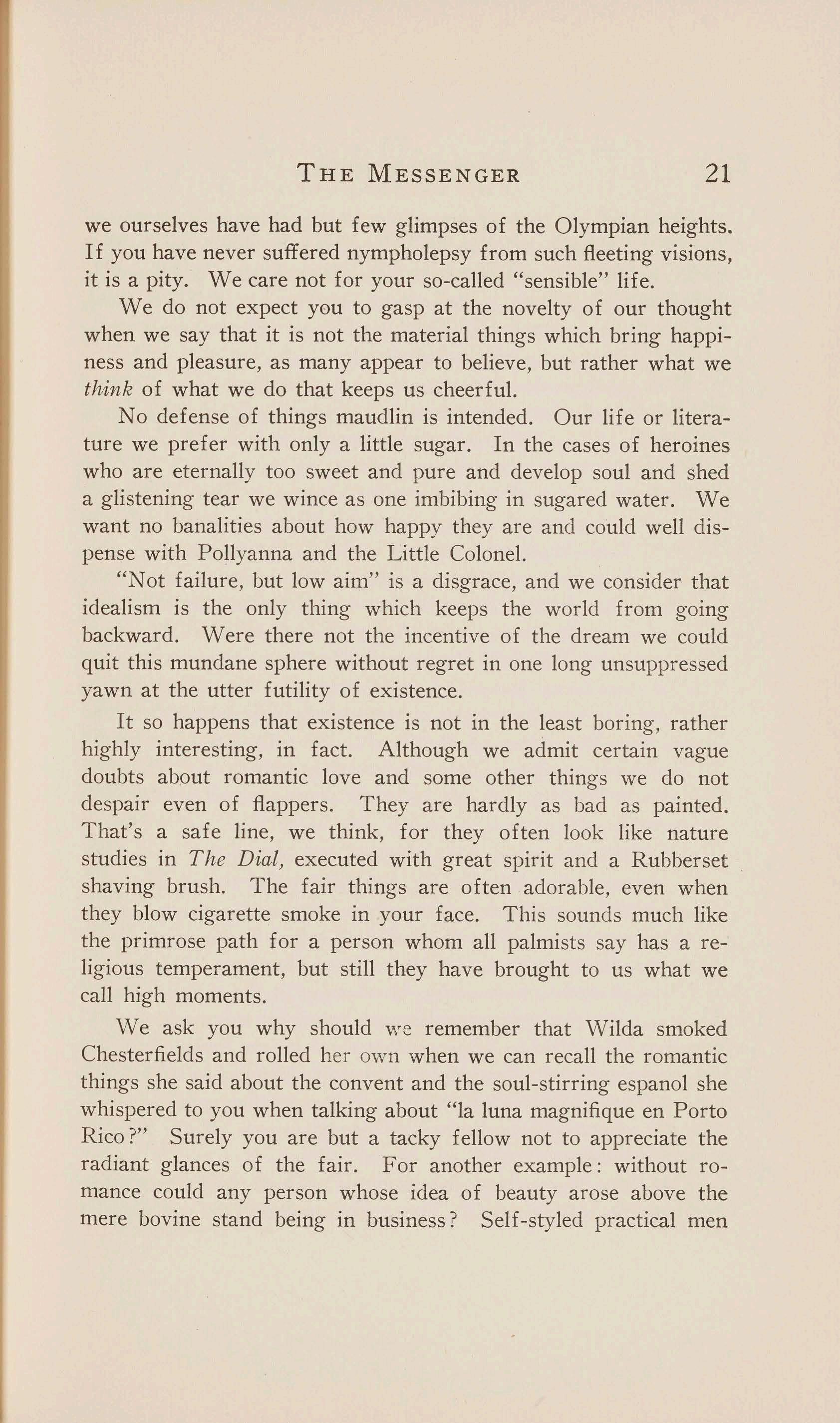
we ourselves have had but few glimpses of the Olympian heights. If you have never suffered nympholepsy from such fleeting visions, it is a pity. We care not for your so-called "sensible" life.
We do not expect you to gasp at the novelty of our thought when we say that it is not the material things which bring happiness and pleasure, as many appear to believe, but rather what we think of what we do that keeps us cheerful.
No defense of things maudlin is intended. Our life or literature we prefer with only a little sugar. In the cases of heroines who are eternally too sweet and pure and develop soul and shed a glistening tear we wince as one imbibing in sugared water. We want no banalities about how happy they are an d could well dispense with Pollyanna and the Little Colonel.
"Not failure, but low aim " is a disgrace, and we consider that idealism is the only thing which keeps the world from g oing backward. Were there not the incentive of the dream we could quit this mundane sphere without regret in one long un suppre ss ed yawn at the utter futility of existence.
It so happens that existence is not in the least b oring , rather highly interesting, in fact. Although we admit certain vague doubts about romantic love and some other thing s we do not despair even of flappers. They are hardly as ba d as painted. That's a safe line, we think, for they often look like nature studies in The Dial , executed with great spirit and a Rubberset shaving brush. The fair things are often adorable , even when they blow cigarette smoke in your face. This sound s much like the primrose path for a person whom all palmist s say has a religious temperament, but still they have brought to us what we call high moments.
We ask you why should w e remember that Wilda smoked Chesterfields and rolled h er own when we can recall the romantic things she said about the convent and the soul-stirring espanol she whispered to you when talking about "la luna magnifique en Porto Rico?" Surely you are but a tacky fell ow not to appreciate the radiant glances of the fair. For another example: without romance could any person whose idea of beauty arose above the mere bovine stand being in business? Self-styled practical men
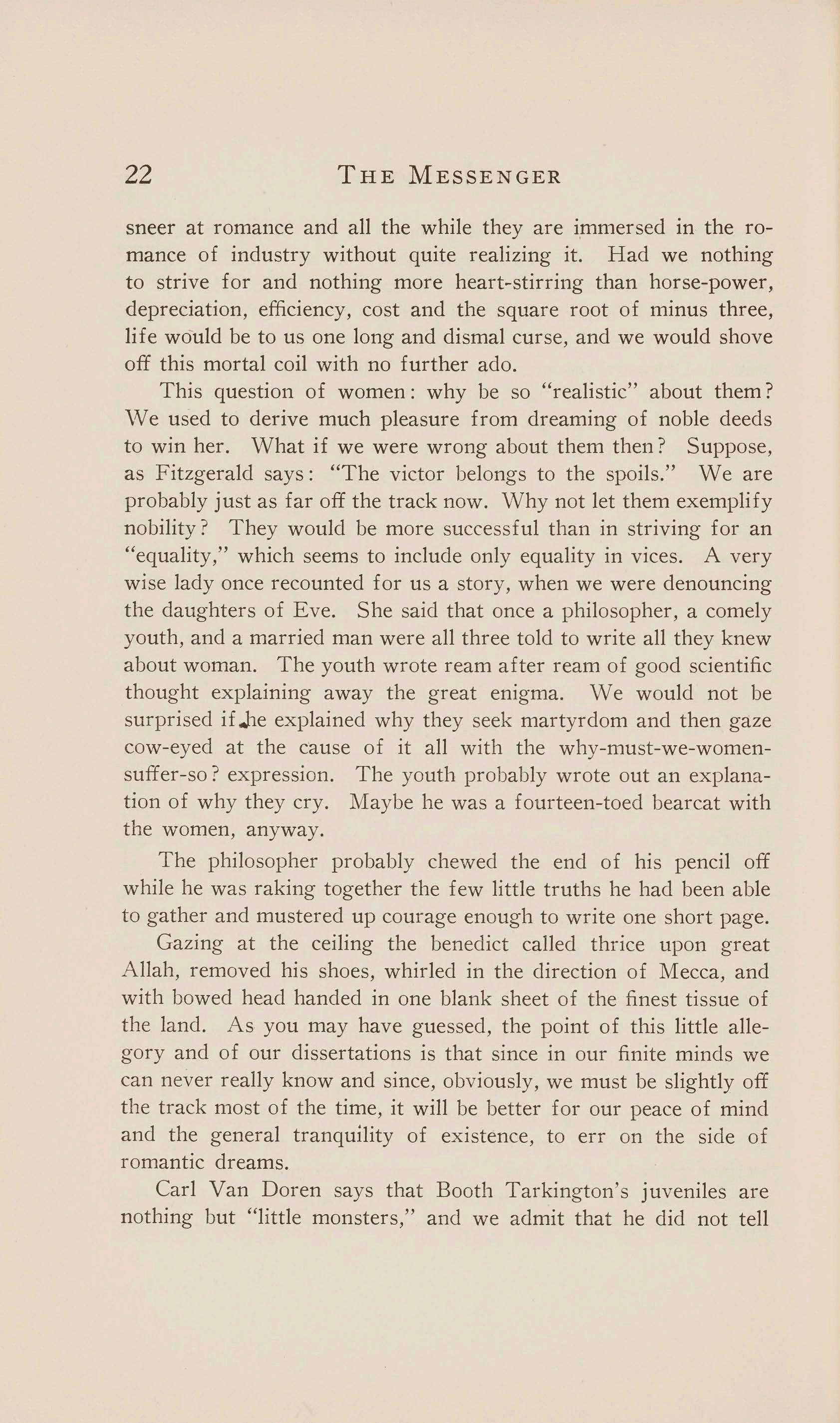
THE MESSENGER
sneer at romance and all the while they are i,mmersed in the romance of industry without quite realizing it. Had we nothing to strive for and nothing more heart-stirring than horse-power, depreciation, efficiency, cost and the square root of minus three, life would be to us one long and dismal curse, and we would shove off this mortal coil with no further ado.
This question of women: why be so "realistic" about them? \Ve used to derive much pleasure from dreaming of noble deeds to win her. What if we were wrong about them then? Suppose, as Fitzgerald says: "The victor belongs to the spoils." We are probably just as far off the track now. Why not let them exemplify nobility? They would be more successful than in striving for an "equality," which seems to include only equality in vices. A very wise lady once recounted for us a story, when we were denouncing the daughters of Eve. She said that once a philosopher, a comely youth, and a married man were all three told to write all they knew about woman. The youth wrote ream after ream of good scientific thought explaining away the great enigma. We would not be surprised if J1e explained why they seek martyrdom and then gaze cow-eyed at the cause of it all with the why-must-we-womensuffer-so? expression. The youth probably wrote out an explanation of why they cry. Maybe he was a fourteen-toed bearcat with the women, anyway.
The philosopher probably chewed the encl of his pencil off while he was raking together the few little truths he had been able to gather and mustered up courage enough to write one short page.
Gazing at the ceiling the benedict called thrice upon great Allah, removed his shoes, whirled in the direction of Mecca, and with bowed head handed in one blank sheet of the finest tissue of the land. As you may have guessed, the point of this little allegory and of our dissertations is that since in our finite minds we can never really know and since, obviously, we must be slightly off the track most of the time, it will be better for our peace of mind and the general tranquility of existence, to err on the side of romantic dreams.
Carl Van Doren says that Booth Tarkington's juveniles are nothing but "little monsters," and we admit that he did not tell
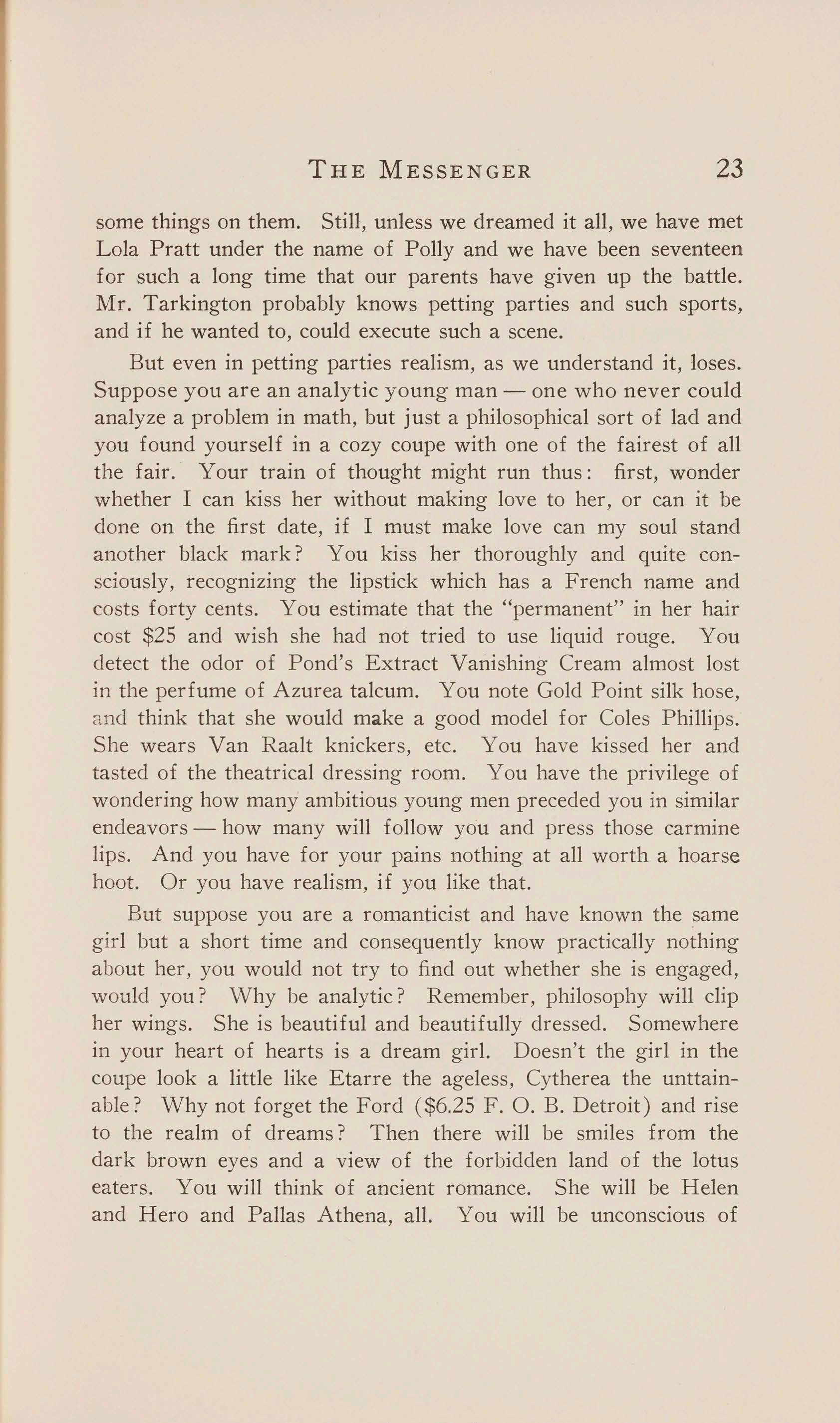
some things on them. Still, unless we dreamed it all, we have met Lola Pratt under the name of Polly and we have been seventeen for such a long time that our parents have given up the battle. Mr. Tarkington probably knows petting parties and such sports, and if he wanted to, could execute such a scene.
But even in petting parties realism, as we understand it, loses. Suppose you are an analytic young man -one who never could analyze a problem in math, but just a philosophical sort of lad and you found yourself in a cozy coupe with one of the fairest of all the fair. Your train of thought might run thus: first, wonder whether I can kiss her without making love to her, or can it be done on the first elate, if I must make love can my soul stand another black mark? You kiss her thoroughly and quite consciously, recognizing the lipstick which has a French name and costs forty cents. You estimate that the "permanent" in her hair cost $25 and wish she had not tried to use liquid rouge. You detect the odor of Pond's Extract Vanishing Cream almost lost in the perfume of Azurea talcum. You note Gold Point silk ho se, a n d think that she would make a good model for Coles Phillips. She wears Van Raalt knickers, etc. You have kissed her and tasted of the theatrical dressing room. You have the privilege of wondering how many ambitious young men preceded you in similar endeavors -how many will follow you and press those carmine lips. And you have for your pains nothing at all worth a hoarse hoot. Or you have realism, if you like that.
But suppose you are a romanticist and have known the same girl but a short time and consequently know practically nothing a bout her, you would not try to find out whether she is engaged, would you? Why be analytic? Remember, philosophy will clip her wings. She is beautiful and beautifully dressed. Somewhere in your heart of hearts is a dream girl. Doesn ' t the girl in the coupe look a little like Etarre the ageless, Cytherea the unttaina b le? Why not forget the Ford ($6.25 F. 0. B. Detroit) and rise to the realm of dreams? Then there will be smiles from the dark brown eyes and a view of the forbidden land of the lotus eaters. You will think of ancient romance. She will be Helen and Hero and Pallas Athena, all. You will be unconscious of
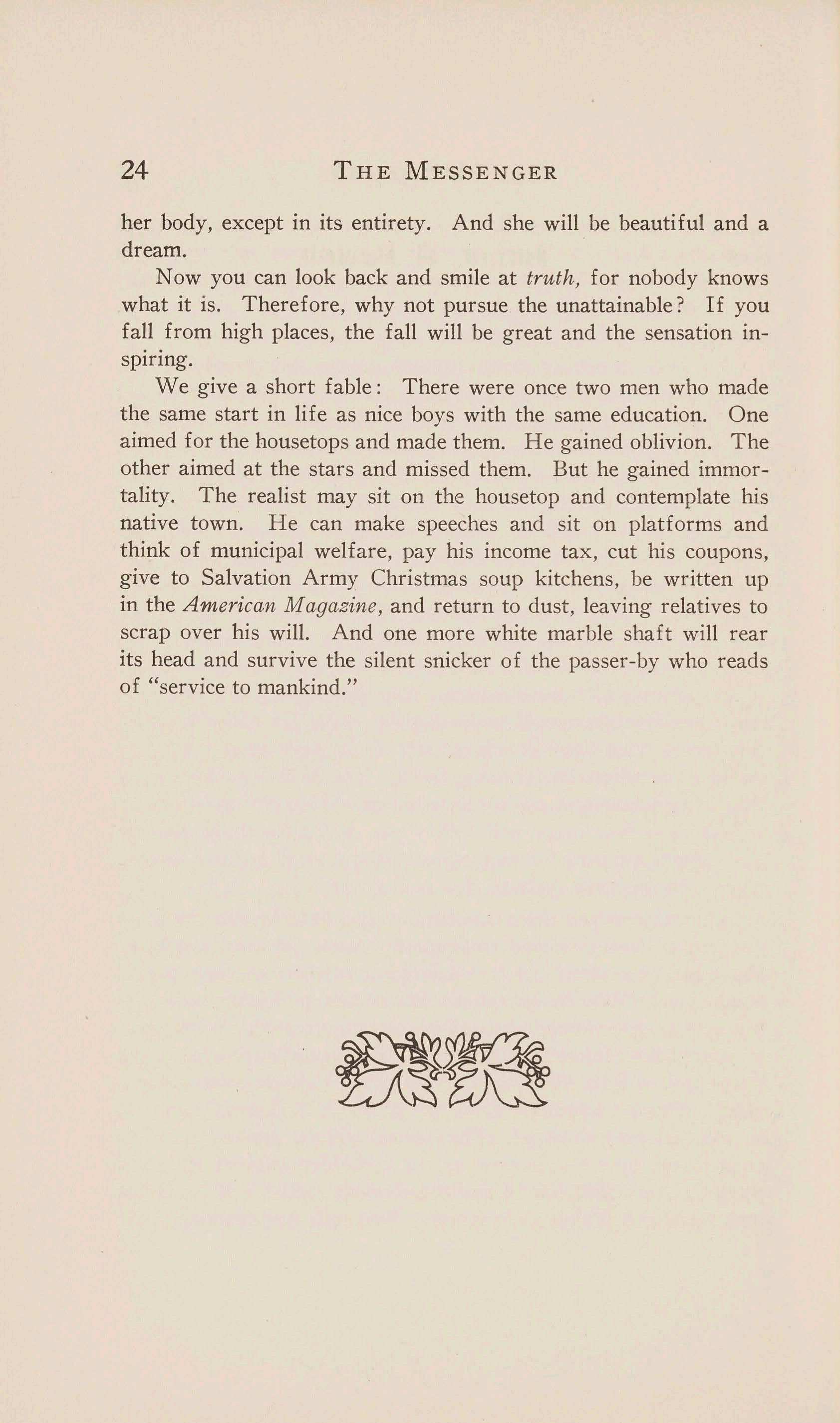
THE MESSENGER
her body, except in its entirety. And she will be beautiful and a dream.
Now you can look back and smile at truth, for nobody knows what it is. Therefore, why not pursue the unattainable? If you fall from high places, the fall will be great and the sensation insp1nng.
We give a short fable : There were once two men who made the same start in life as nice boys with the same education. One aimed for the housetops and made them. He gained oblivion. The other aimed at the stars and missed them. But he gained immortality. The realist may sit on the housetop and contemplate his native town. He can make speeches and sit on platforms and think of municipal welfare, pay his income tax, cut his coupons, give to Salvation Army Christmas soup kitchens, be written up in the American Magazine, and return to dust, leaving relatives to scrap over his will. And one more white marble shaft will rear its head and survive the silent snicker of the passer-by who reads of "service to mankind."
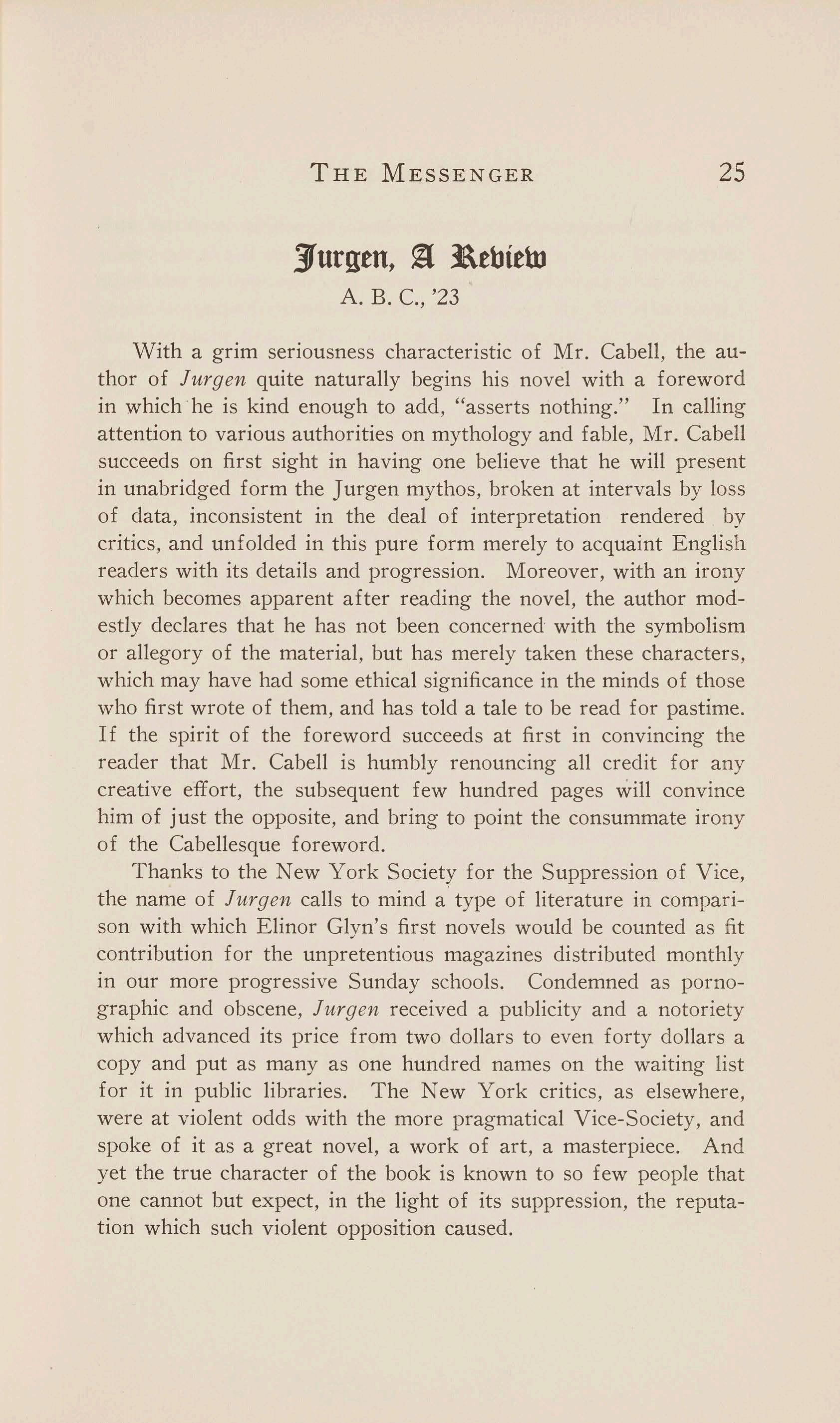
3furgen, l\ebiew
A. B. c., '23
With a grim seriousness characteristic of Mr. Cabell, the author of Jurgen quite naturally begins his novel with a foreword in which he is kind enough to add, "asserts nothing." In calling attention to various authorities on mythology and fable, Mr. Cabell succeeds on first sight in having one believe that he will present in unabridged form the Jurgen mythos, broken at intervals by loss of data, inconsistent in the deal of interpretation rendered by critics, and unfolded in this pure form merely to acquaint Englis h readers with its details and progression. Moreover, with an irony which becomes apparent after reading the novel, the author modestly declares that he has not been concerned with the symbolism or allegory of the material, but has merely taken these characters, which may have had some ethical significance in the minds of those who first wrote of them, and has told a tale to be read for pastime. If the spirit of the foreword succeeds at first in convincing the reader that Mr. Cabell is humbly renouncing all credit for any creative effort, the subsequent few hundred pages will convince him of just the opposite, and bring to point the consummate irony of the Cabellesque foreword.
Thanks to the New York Society for the Suppression of V ice, the name of Jurgen calls to mind a type of literature in com parison with which Elinor Glyn's first novels would be counted as fit contribution for the unpretentious magazines distributed monthl y in our more progressive Sunday schools. Condemned as pornographic and obscene, Jurgen received a publicity and a notoriety which advanced its price from two dollars to even forty dollars a copy and put as many as one hundred names on the waiting list for it in public libraries. The New York critics, as elsewhere , were at violent odds with the more pragmatical Vice-Society, and spoke of it as a great novel, a work of art, a masterpiece. And yet the true character of the book is known to so few people that one cannot but expect, in the light of its suppression, the reputation which such violent opposition caused.
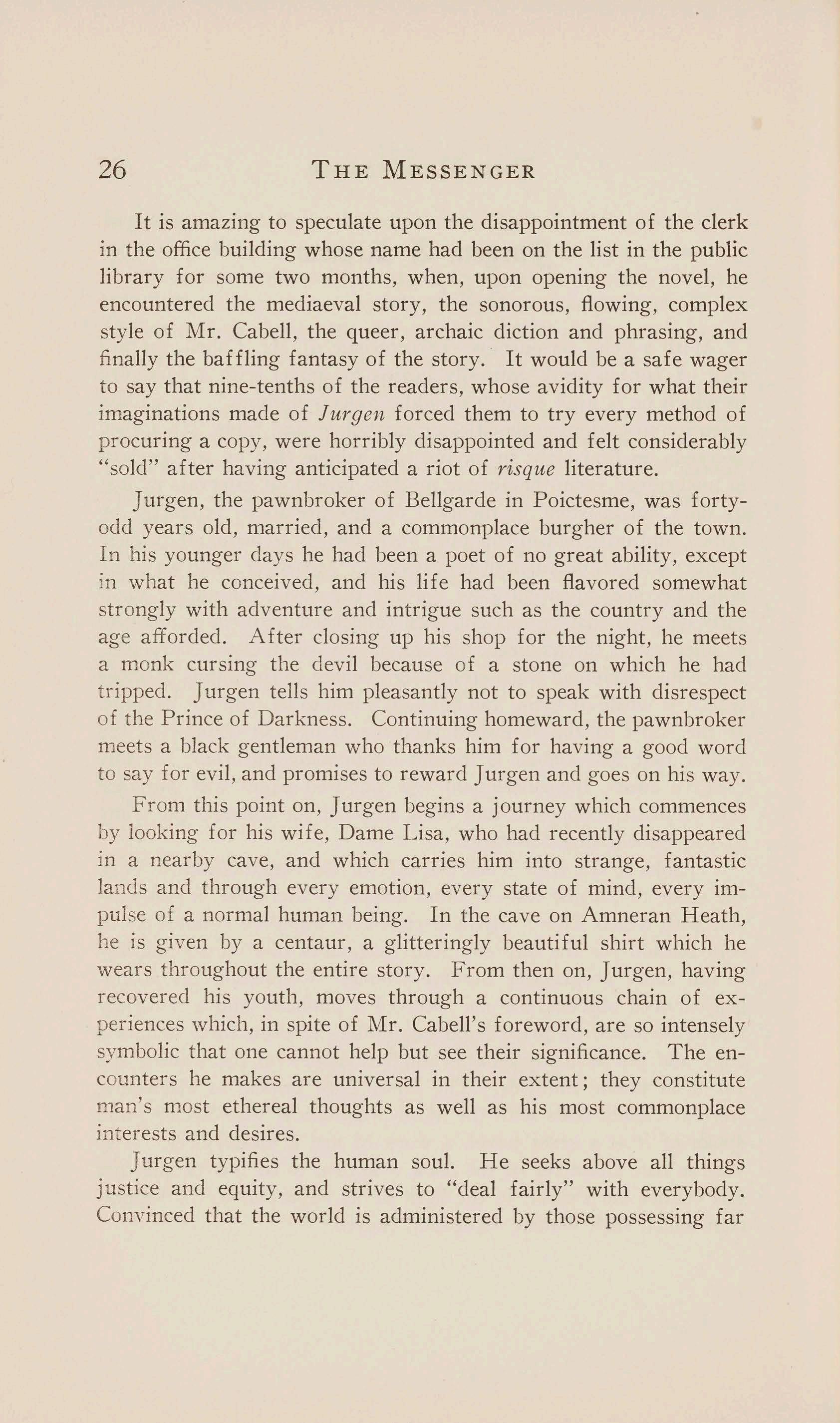
THE MESSENGER
It is amazing to speculate upon the disappointment of the clerk in the office building whose name had been on the list in the public library for some two months, when, upon opening the novel, he encountered the mediaeval story, the sonorous, flowing, complex style of Mr. Cabell, the queer, archaic diction and phrasing, and finally the baffling fantasy of the story. It would be a safe wager to say that nine-tenths of the readers, whose avidity for what their imaginations made of Jurgen forced them to try every method of proc uring a copy, were horribly disappointed and felt considerably "sold" after having anticipated a riot of risque literature.
Jurgen, the pawnbroker of Bellgarde in Poictesme, was fortyodd years old, married, and a commonplace burgher of the town. In his younger days he had been a poet of no great ability, except in what he conceived, and his life had been flavored somewhat strong ly with adventure and intrigue such as the country and the age afforded. After closing up his shop for the night, he meets a monk cursing the devil because of a stone on which he had tripped. Jurgen tells him pleasantly not to speak with disrespect of the Prince of Darkness. Continuing homeward, the pawnbroker meets a black gentleman who thanks him for having a good word to say for evil, and promises to reward Jurgen and goes on his way.
Fro m this point on, Jurgen begins a journey which commences by looking for his wife, Dame Lisa, who had recently disappeared in a nearby cave, and which carries him into strange, fantastic la nds and through every emotion, every state of mind, every impu lse of a normal human being. In the cave on Amneran Heath, he is given by a centaur, a glitteringly beautiful shirt which he wears throughout the entire story. From then on, Jurgen, having recovered his youth, moves through a continuous chain of expe riences which, in spite of Mr. Cabell's foreword, are so intensely symbo lic that one cannot help but see their significance. The encounters he makes are universal in their extent; they constitute man's most ethereal thoughts as well as his most commonplace interests and desires.
Jurgen typifies the human soul. He seeks above all things justice and equity, and strives to "deal fairly" with everybody. Convinced that the world is administered by those possessing far
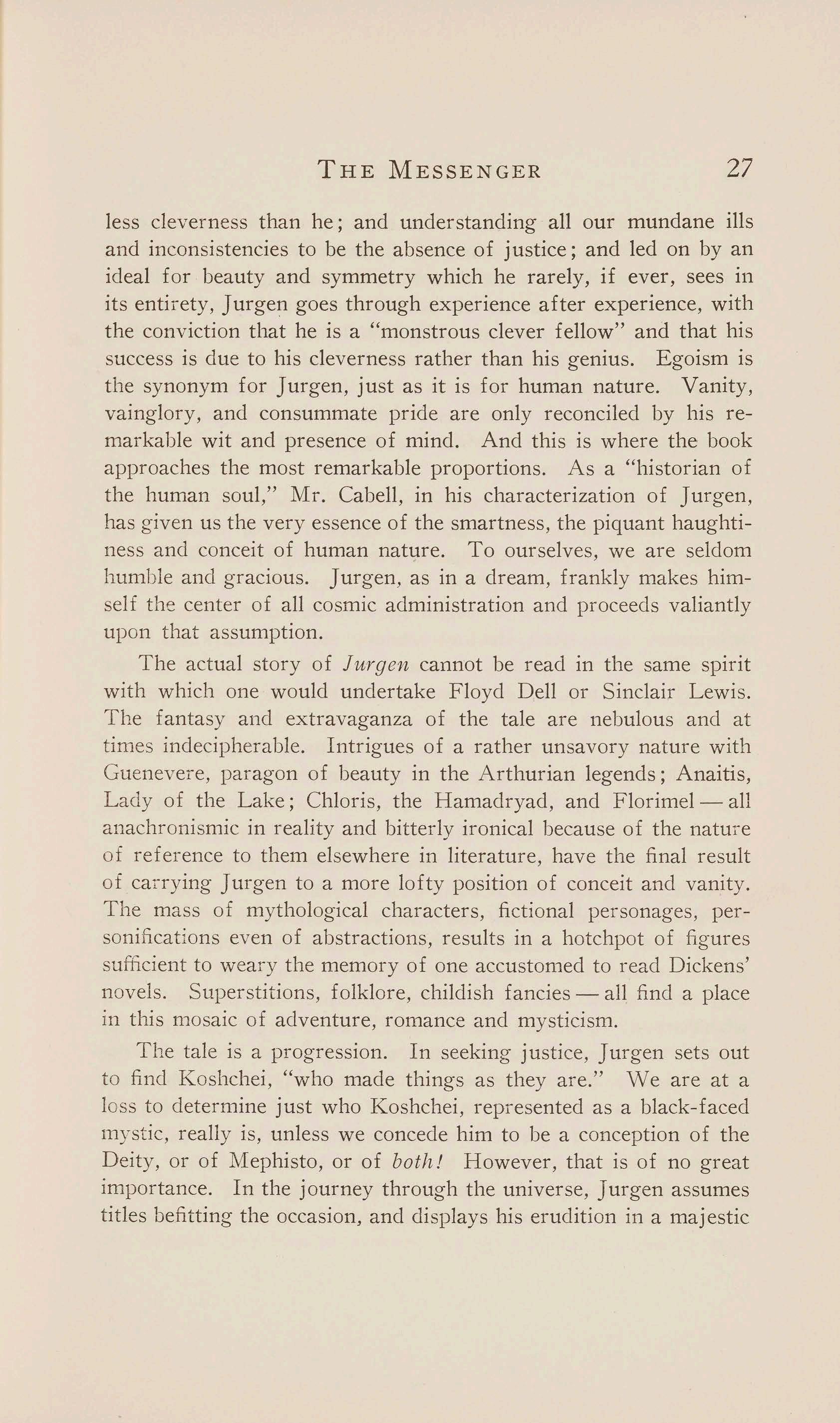
less cleverness than he; and understanding all our mundane ills and inconsistencies to be the absence of justice; and led on by an ideal for beauty and symmetry which he rarely, if ever, sees in its entirety, Jurgen goes through experience after experience, with the conviction that he is a "monstrous clever fell ow" and that his success is due to his cleverness rather than his genius. Egoism is the synonym for Jurgen, just as it is for human nature. Vanity, vainglory, and consummate pride are only reconciled by his remarkable wit and presence of mind. And this is where the book approaches the most remarkable proportions. As a "historian of the human soul," Mr. Cabell, in his characterization of Jurgen, has given us the very essence of the smartness, the piquant haughtiness and conceit of human nature. To ourselves, we are seldom hum b le and gracious. Jurgen, as in a dream, frankly makes himself th e center of all cosmic administration and proceeds valiantly up on that assumption.
The actual story of Jurgen cannot be read in the same spirit with which one would undertake Floyd Dell or Sinclair Lewis. The fantasy and extravaganza of the tale are nebulous and at times indecipherable. Intrigues of a rather unsavory nature with Gu en evere , paragon of beauty in the Arthurian legends; Anaitis, La dy of the Lake; Chloris, the Hamadryad, and Florimel - all a nachronismic in reality and bitterly ironical because of the natu r e o f refe r ence to them elsewhere in literature, have the final result o f ca r rying Jurgen to a more lofty position of conceit and vanit y . The mass of mythological characters, fictional personage s , personificat ions ev en of abstractions, results in a hotchpot of figures sufficient to wear y the memory of one accustomed to read Dickens' n ovels. Superstitions , folklore, childish fancies -all find a place in this mosaic of adventure, romance and mysticism.
The tale is a progression. In seeking justice , Jurgen sets out t o find Koshchei , "who made things as they are." vVe are at a los s to determine just who Koshchei, represented as a black-faced mystic, really is, unless we concede him to be a conception of the Deity, or of Mephisto, or of both! However, that is of no great importance. In the journey through the universe, Jurgen assumes titles befitting the occasion, and displays his erudition in a majestic
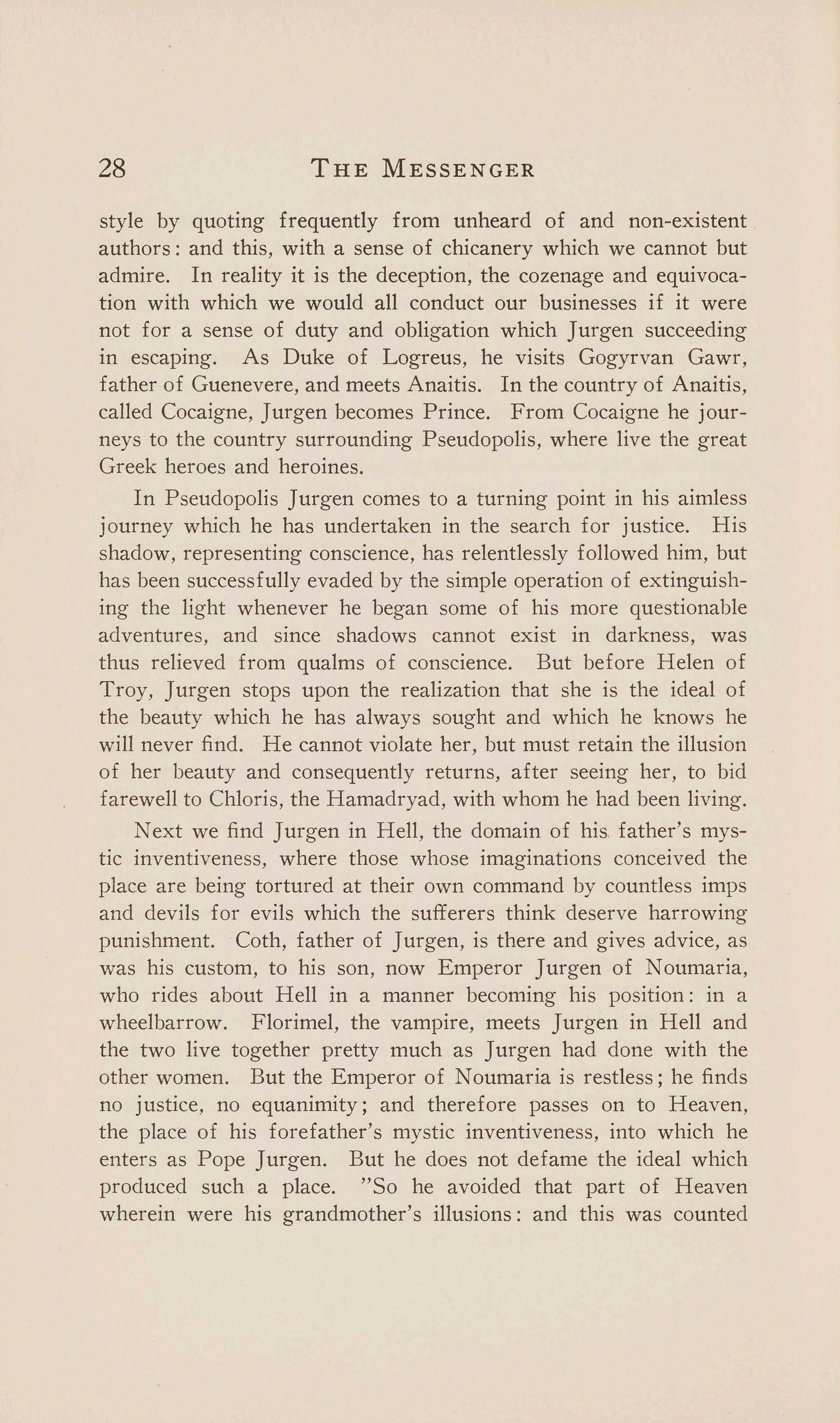
THE MESSENGER
style by quoting frequently from unheard of and non-existent authors: and this, with a sense of chicanery which we cannot but admire. In reality it is the deception, the cozenage and equivocation with which we would all conduct our businesses if it were not for a sense of duty and obligation which Jurgen succeeding in escaping. As Duke of Logreus, he visits Gogyrvan Gawr, father of Guenevere, and meets Anaitis. In the country of Anaitis, called Cocaigne, Jurgen becomes Prince. From Cocaigne he journeys to the country surrounding Pseudopolis, where live the great Greek heroes and heroines.
In Pseudopolis Jurgen comes to a turning point in his aimless journey which he has undertaken in the search for justice. His shadow, representing conscience, has relentlessly followed him, but has been successfully evaded by the simple operation of extinguishing the light whenever he began some of his more questionable adventures, and since shadows cannot exist in darkness, was thus relieved from qualms of conscience. But before Helen of Troy, Jurgen stops upon the realization that she is the ideal of the beauty which he has always sought and which he knows he will never find. He cannot violate her, but must retain the illusion of her beauty and consequently returns, after seeing her, to bid farewell to Chloris, the Hamadryad , with whom he had been living.
Next we find Jurgen in Hell, the domain of his father's mystic inventiveness, where those whose imaginations conceived the place are being tortured at their own command by countless imps and devils for evils which the sufferers think deserve harrowing punishment. Coth, father of Jurgen, is there and gives advice, as was his custom, to his son, now Emperor Jurgen of N oumaria , who rides about Hell in a manner becoming his position: in a wheelbarrow. Florimel , the vampire, meets Jurgen in Hell and the two live together pretty much as Jurgen had done with the other women. But the Emperor of N oumaria is restless ; he finds no justice, no equanimity; and therefore passes on to Heaven, the place of his forefather's mystic inventiveness, into which he enters as Pope Jurgen. But he does not defame the ideal which produced such a place. "So he avoided that part of Heaven wherein were his grandmother's illusions: and this was counted
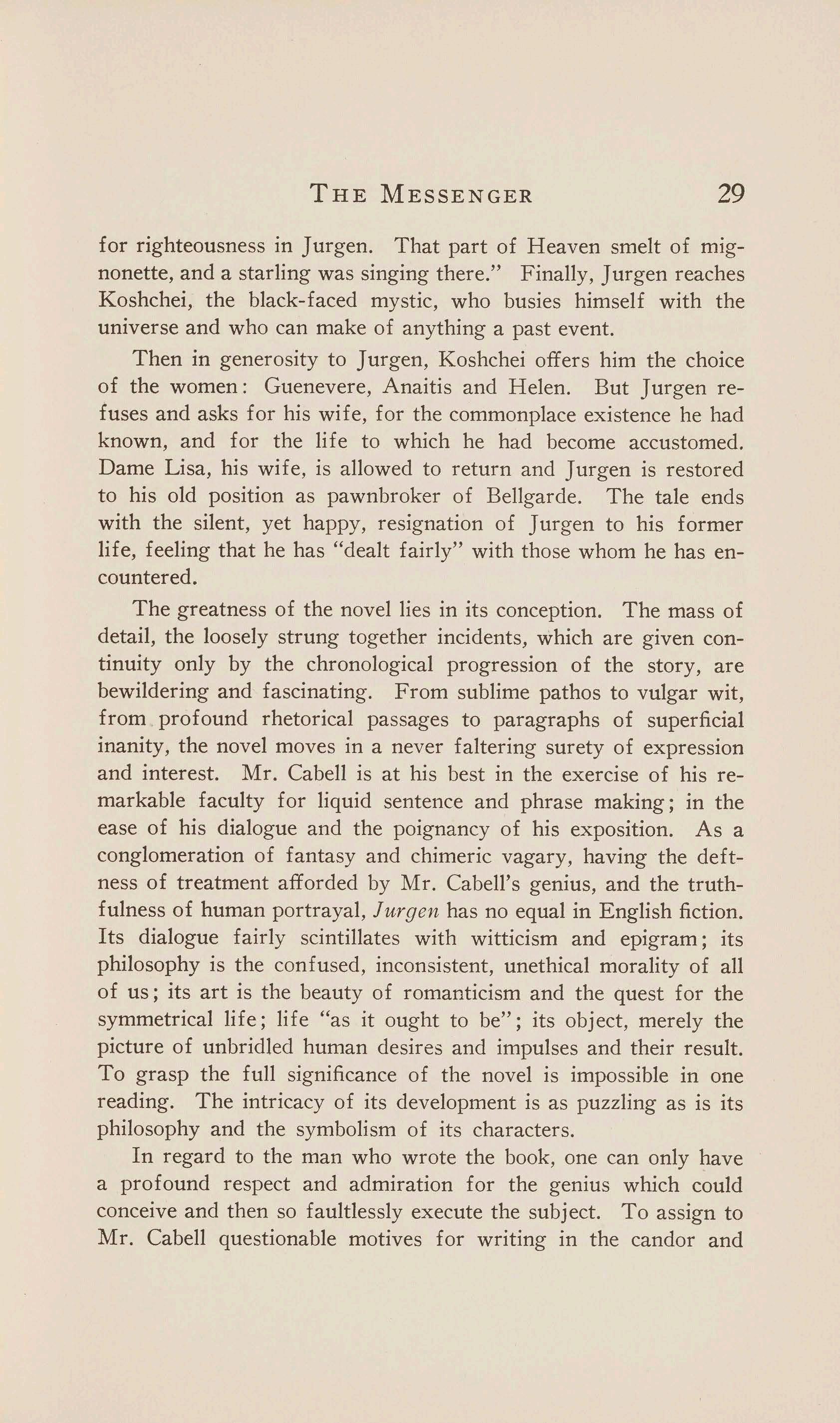
for righteousness in Jurgen. That part of Heaven smelt of mignonette, and a starling was singing there." Finally, Jurgen reaches Koshchei, the black-faced mystic, who busies himself with the universe and who can make of anything a past event.
Then in generosity to Jurgen, Koshchei offers him the choice of the women : Guenevere, Anaitis and Helen. But Jurgen refuses and asks for his wife, for the commonplace existence he had known, and for the life to which he had become accustomed. Dame Lisa, his wife, is allowed to return and Jurgen is restored to his old position as pawnbroker of Bellgarde. The tale ends with the silent, yet happy, resignation of Jurgen to his former life, feeling that he has "dealt fairly" with those whom he has encountered.
The greatness of the novel lies in its conception. The mass of detail, the loosely strung together incidents, which are given continuity only by the chronological progression of the story, are bewildering and fascinating. From sublime pathos to vulgar wit, from profound rhetorical passages to paragraphs of superficial inanity, the novel moves in a never faltering surety of expression and interest. Mr. Cabell is at his best in the exercise of his remarkable faculty for liquid sentence and phrase making; in the ease of his dialogue and the poignancy of his exposition. As a conglomeration of fantasy and chimeric vagary, having the deftness of treatment afforded by Mr. Cabell's genius, and the truthfulness of human portrayal, Jurgen has no equal in English fiction. Its dialogue fairly scintillates with witticism and epigram; its philosophy is the confused, inconsistent, unethical morality of all of us; its art is the beauty of romanticism and the quest for the symmetrical life; life "as it ought to be"; its object, merely the picture of unbridled human desires and impulses and their result. To grasp the full significance of the novel is impossible in one reading. The intricacy of its development is as puzzling as is its philosophy and the symbolism of its characters.
In regard to the man who wrote the book, one can only have a profound respect and admiration for the genius which could conceive and then so faultlessly execute the subject. To assign to Mr. Cabell questionable motives for writing in the candor and
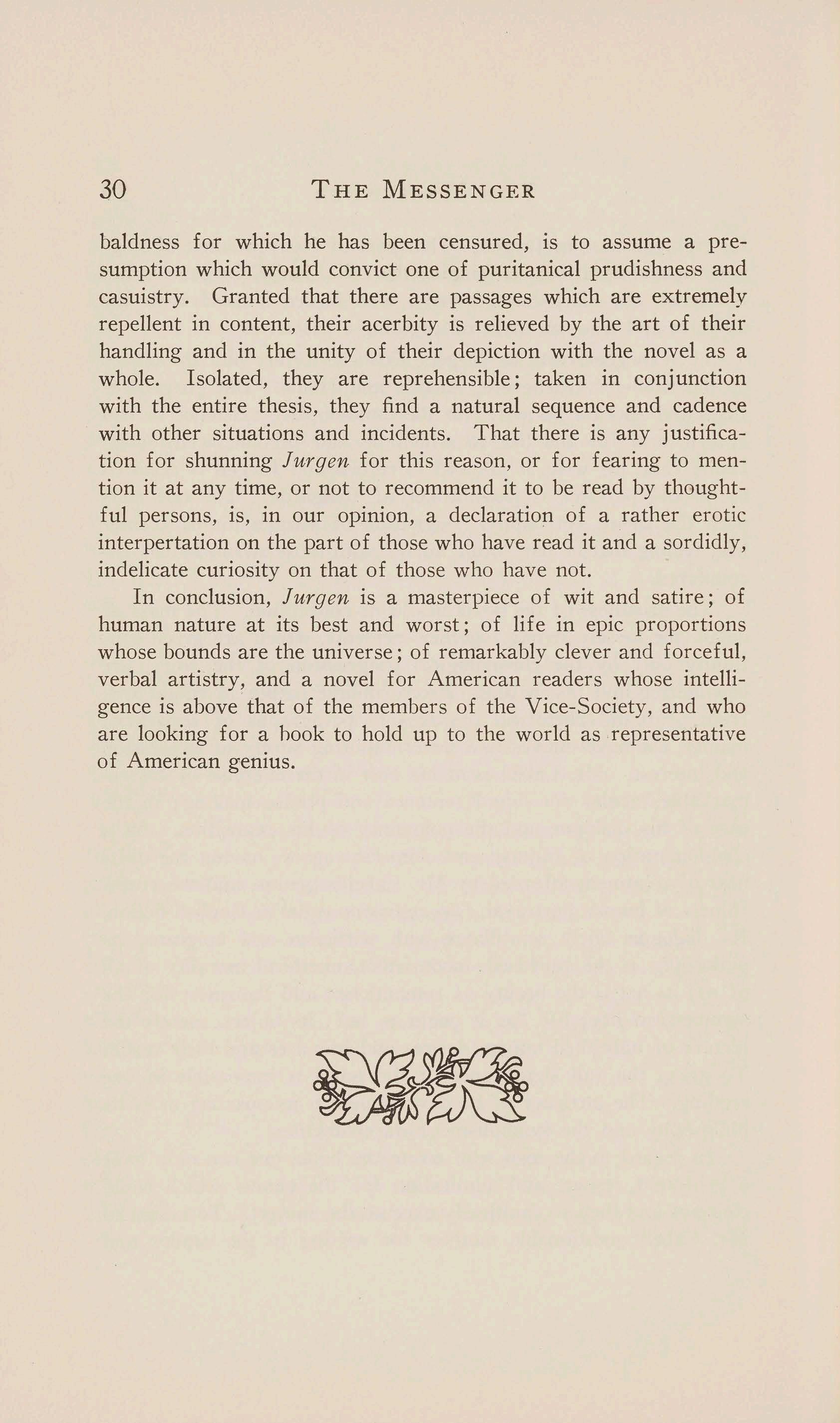
THE MESSENGER
baldness for which he has been censured, is to assume a presumption which would convict one of puritanical prudishness and casuistry. Granted that there are passages which are extremely repellent in content, their acerbity is relieved by the art of their handling and in the unity of their depiction with the novel as a whole. Isolated, they are reprehensible; taken in conjunction with the entire thesis, they find a natural sequence and cadence with other situations and incidents. That there is any justification for shunning Jurgen for this reason , or for fearing to mention it at any time, or not to recommend it to be read by thoughtful persons, is, in our opinion, a declaration of a rather erotic interpertation on the part of those who have read it and a sordidly, indelicate curiosity on that of those who have not.
In conclusion, Jurgen is a masterpiece of wit and satire; of human nature at its best and worst; of life in epic proportions whose bounds are the universe; of remarkably clever and forceful, verbal artistry, and a novel for American readers whose intelligence is above that of the members of the Vice-Society, and who are looking for a hook to hold up to the world as representative of American genius.
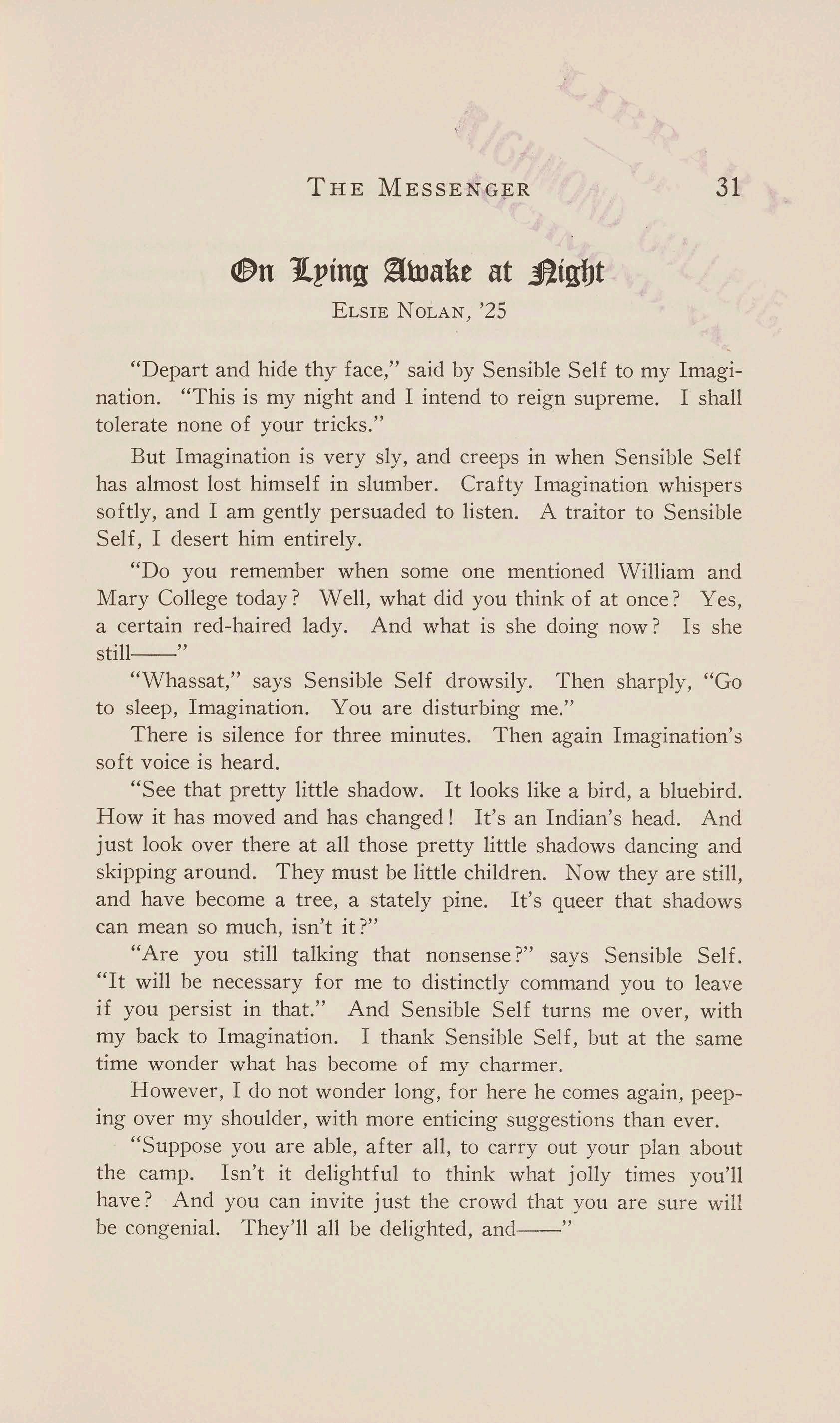
<!&nJLping~wake at ~igbt
ELSIE NOLAN, '25
"Depart and hide thy face," said by Sensible Self to my Imagination. "This is my night and I intend to reign supreme. I shall tolerate none of your tricks."
But Imagination is very sly, and creeps in when Sensible Self has almost lost himself in slumber. Crafty Imagination whispers softly, and I am gently persuaded to listen. A traitor to Sensible Self, I desert him entirely.
"Do you remember when some one mentioned William and Mary College today? Well, what did you think of at once? Yes, a certain red-haired lady. And what is she doing now? Is she still--"
"Whassat," says Sensible Self drowsily. Then sharply, "Go to sleep, Imagination. You are disturbing me."
There is silence for three minutes. Then again Imagination's soft voice is heard.
"See that pretty little shadow. It looks like a bird, a bluebird. How it has moved and has changed! It's an Indian's head. And just look over there at all those pretty little shadows dancing and skipping around. They must be little children. Now they are still, and have become a tree, a stately pine. It's queer that shadows can mean so much, isn't it?"
"Are you still talking that nonsense?" says Sensible Self. "It will be necessary for me to distinctly command you to leave if you persist in that." And Sensible Self turns me over, with my back to Imagination. I thank Sensible Self, but at the same time wonder what has become of my charmer.
However, I do not wonder long, for here he comes again, peeping over my shoulder, with more enticing suggestions than ever.
"Suppose you are able, after all, to carry out your plan about the camp. Isn't it delightful to think what jolly times you'll have? And you can invite just the crowd that you are sure will be congenial. They'll all be delighted, and--"
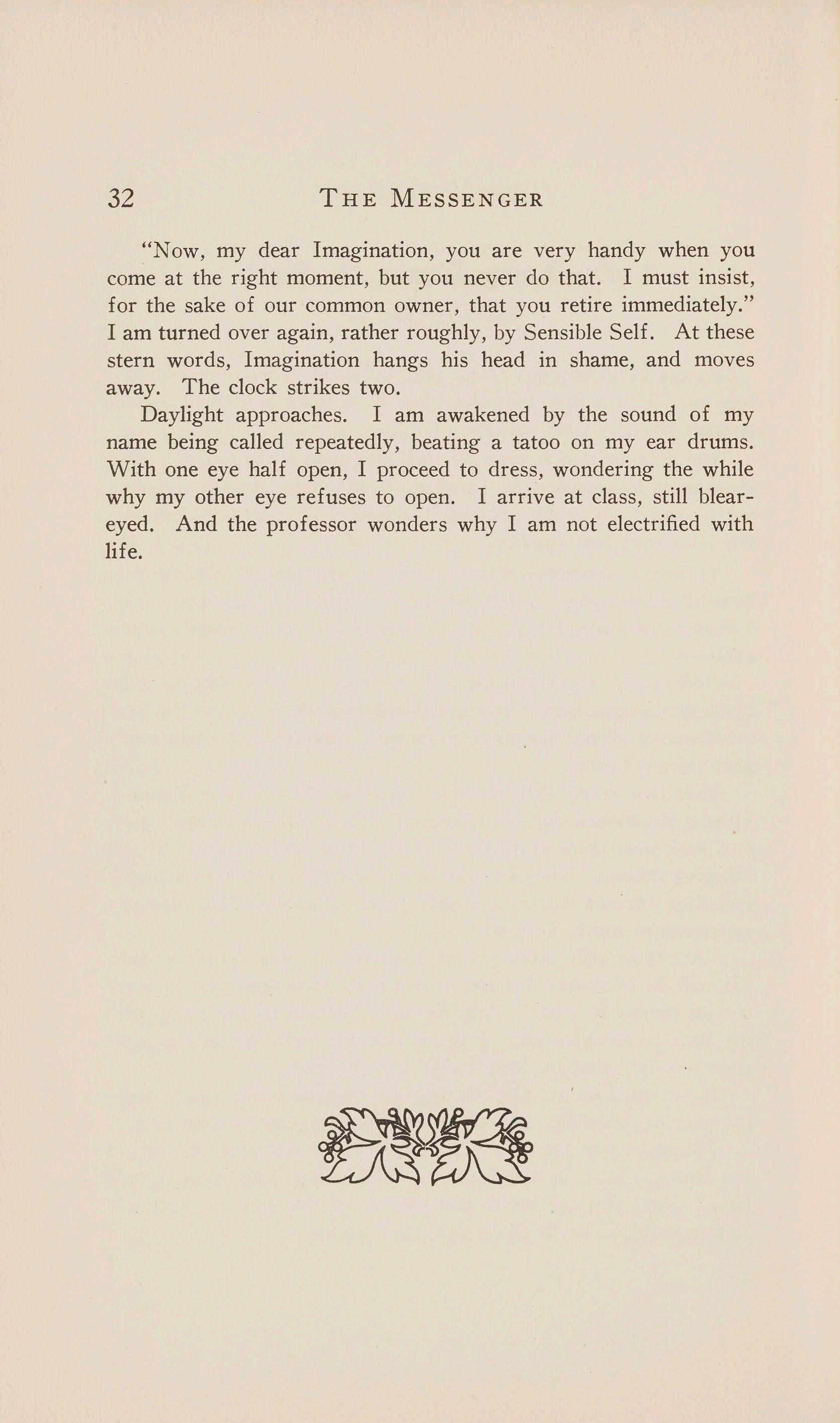
THE MESSENGER
"Now, my dear Imagination, you are very handy when you come at the right moment, but you never do that. I must insist, for the sake of our common owner, that you retire immediately." I am turned over again, rather roughly, by Sensible Self. At these stern words, Imagination hangs his head in shame, and moves away. The clock strikes two.
Daylight approaches. I am awakened by the sound of my name being called repeatedly, beating a ta too on my ear drums. With one eye half open, I proceed to dress, wondering the while why my other eye refuses to open. I arrive at class, still bleareyed. And the professor wonders why I am not electrified with life.
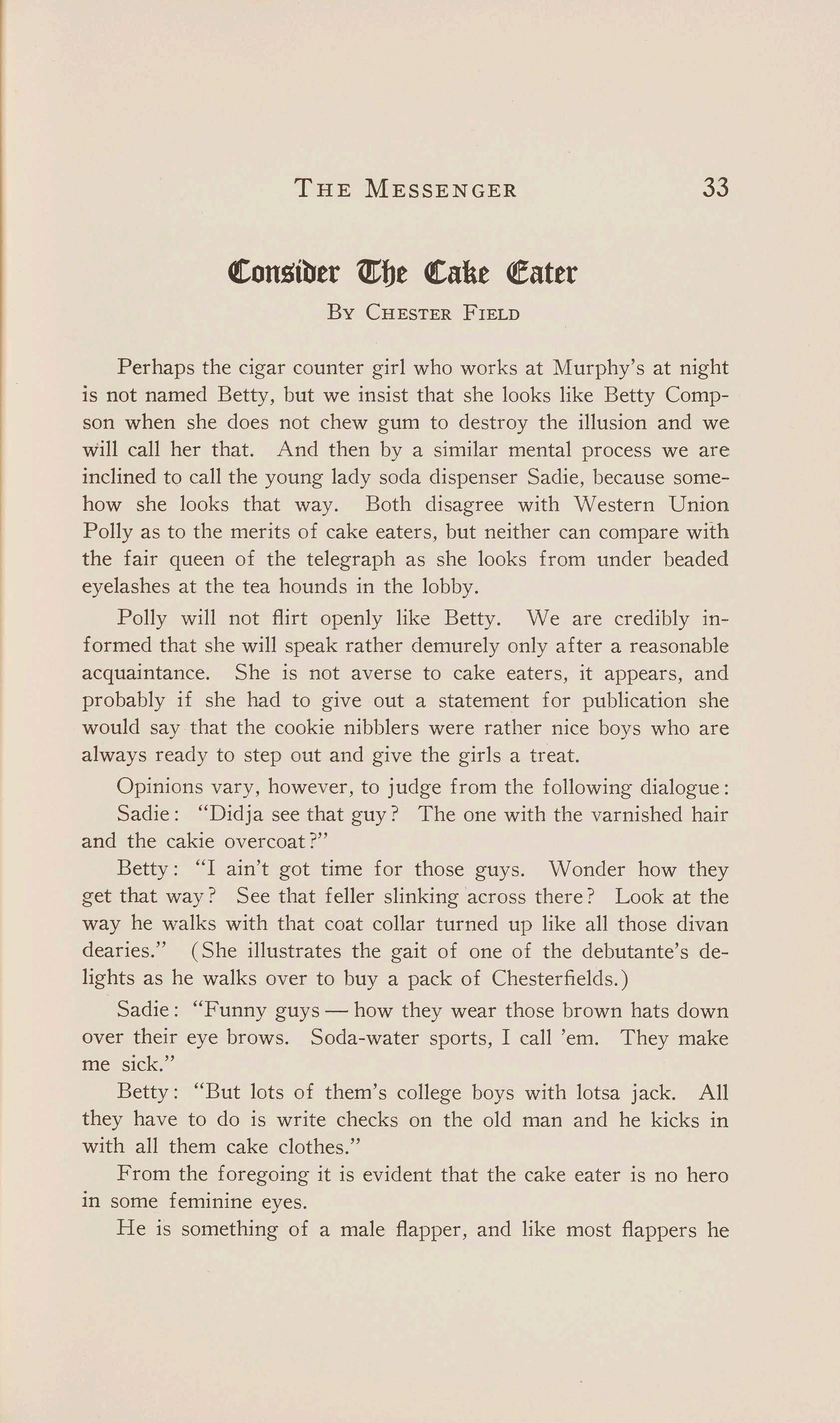
qton1,ibtr~bt qtakt ~attr
BY CHESTER FIELD
Perhaps the cigar counter girl who works at Murphy's at night is not named Betty, but we insist that she looks like Betty Compson when she does not chew gum to destroy the illusion and we will call her that. And then by a similar mental process we are inclined to call the young lady soda dispenser Sadie, because somehow she looks that way. Both disagree with Western Union Polly as to the merits of cake eaters, but neither can compare with the fair queen of the telegraph as she looks from under beaded eyelashes at the tea hounds in the lobby.
Polly will not flirt openly like Betty. We are credibly informed that she will speak rather demurely only after a reasonable acquaintance. She is not averse to cake eaters, it appears, and probably if she had to give out a statement for publication she would say that the cookie nibblers were rather nice boys who are always ready to step out and give the girls a treat.
Opinions vary, however, to judge from the following dialogue: Sadie: "Didja see that guy? The one with the varnished hair and the cakie overcoat?"
Betty : "I ain't got time for those guys. Wonder how they get that way? See that feller slinking across there? Look at the way he walks with that coat collar turned up like all those divan dearies." ( She illustrates the gait of one of the debutante's delights as he walks over to buy a pack of Chesterfields.)
Sadie : "Funny guys -how they wear those brown hats down over their eye brows. Soda-water sports, I call 'em. They make me sick."
Betty: "But lots of them's college boys with lotsa jack. All they have to do is write checks on the old man and he kicks in with all them cake clothes."
From the foregoing it is evident that the cake eater is no hero in some feminine eyes.
He is something of a male flapper, and like most flappers he
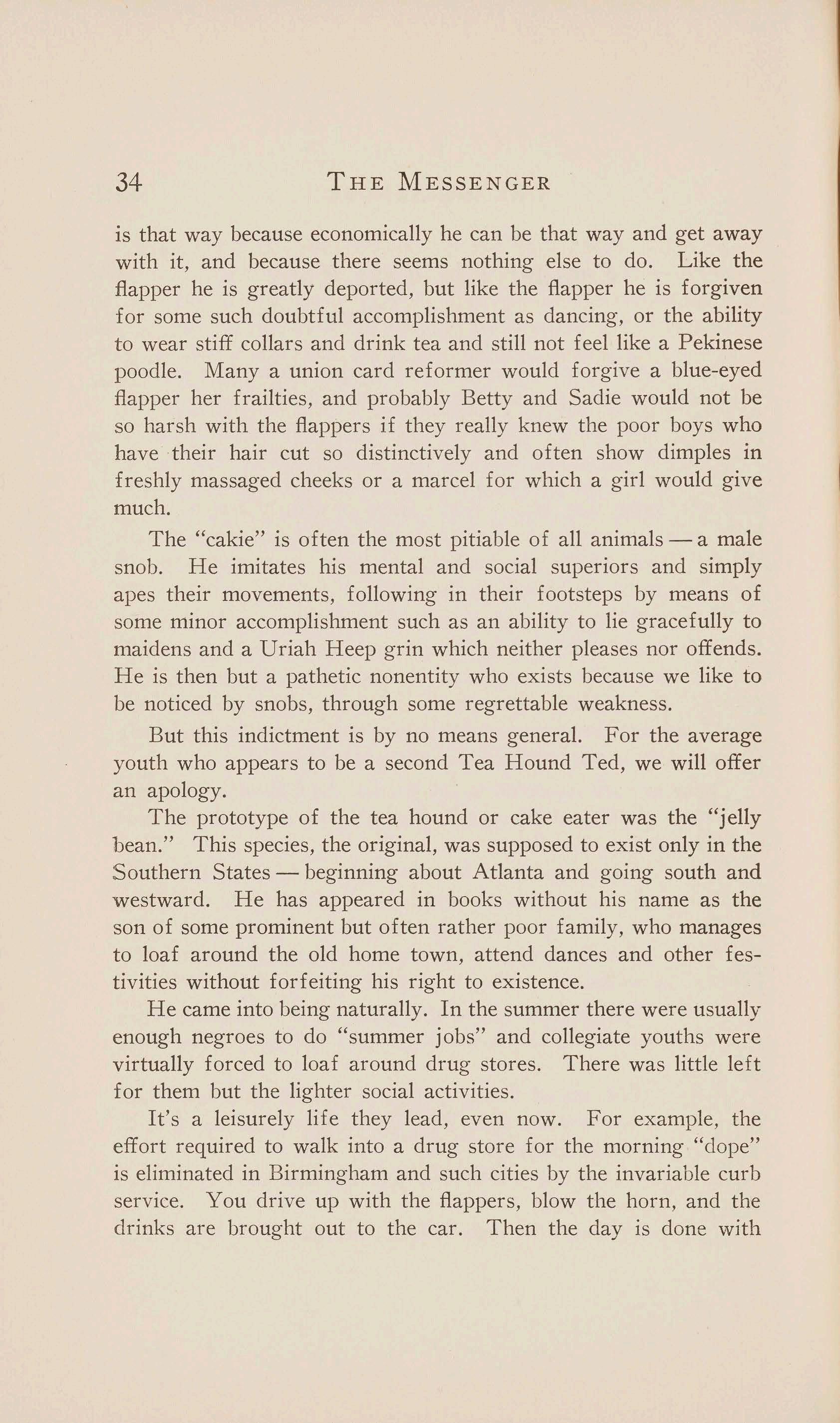
THE MESSENGER
is that way because economically he can be that way and get away with it, and because there seems nothing else to do. Like the flapper he is greatly deported, but like the flapper he is forgiven for some such doubtful accomplishment as dancing, or the ability to wear stiff collars and drink tea and still not feel like a Pekinese poodle. Many a union card reformer would forgive a blue-eyed flapper her frailties, and probably Betty and Sadie would not be so harsh with the flappers if they really knew the poor boys who have their hair cut so distinctively and often show dimples in freshly massaged cheeks or a marcel for which a girl would give much.
The "cakie" is often the most pitiable of all animals - a male snob. He imitates his mental and social superiors and simply apes their movements, following in their footsteps by means of some minor accomplishment such as an ability to lie gracefully to maidens and a Uriah Heep grin which neither pleases nor offends. He is then but a pathetic nonentity who exists because we like to be noticed by snobs, through some regrettable weakness.
But this indictment is by no means general. For the average youth who appears to be a second Tea Hound Ted, we will offer an apology.
The prototype of the tea hound or cake eater was the "jelly bean." This species, the original, was supposed to exist only in the Southern States - beginning about Atlanta and going south and westward. He has appeared in books without his name as the son of some prominent but often rather poor family, who manages to loaf around the old home town, attend dances and other f estivities without forfeiting his right to existence.
He came into being naturally. In the summer there were usually enough negroes to do "summer jobs" and collegiate youths were virtually forced to loaf around drug stores. There was little left for them but the lighter social activities.
It's a leisurely life they lead, even now. For example, the effort required to walk into a drug store for the morning "dope" is eliminated in Birmingham and such cities by the invariable curb service. You drive up with the flappers, blow the horn, and the drinks are brought out to the car. Then the day is done with
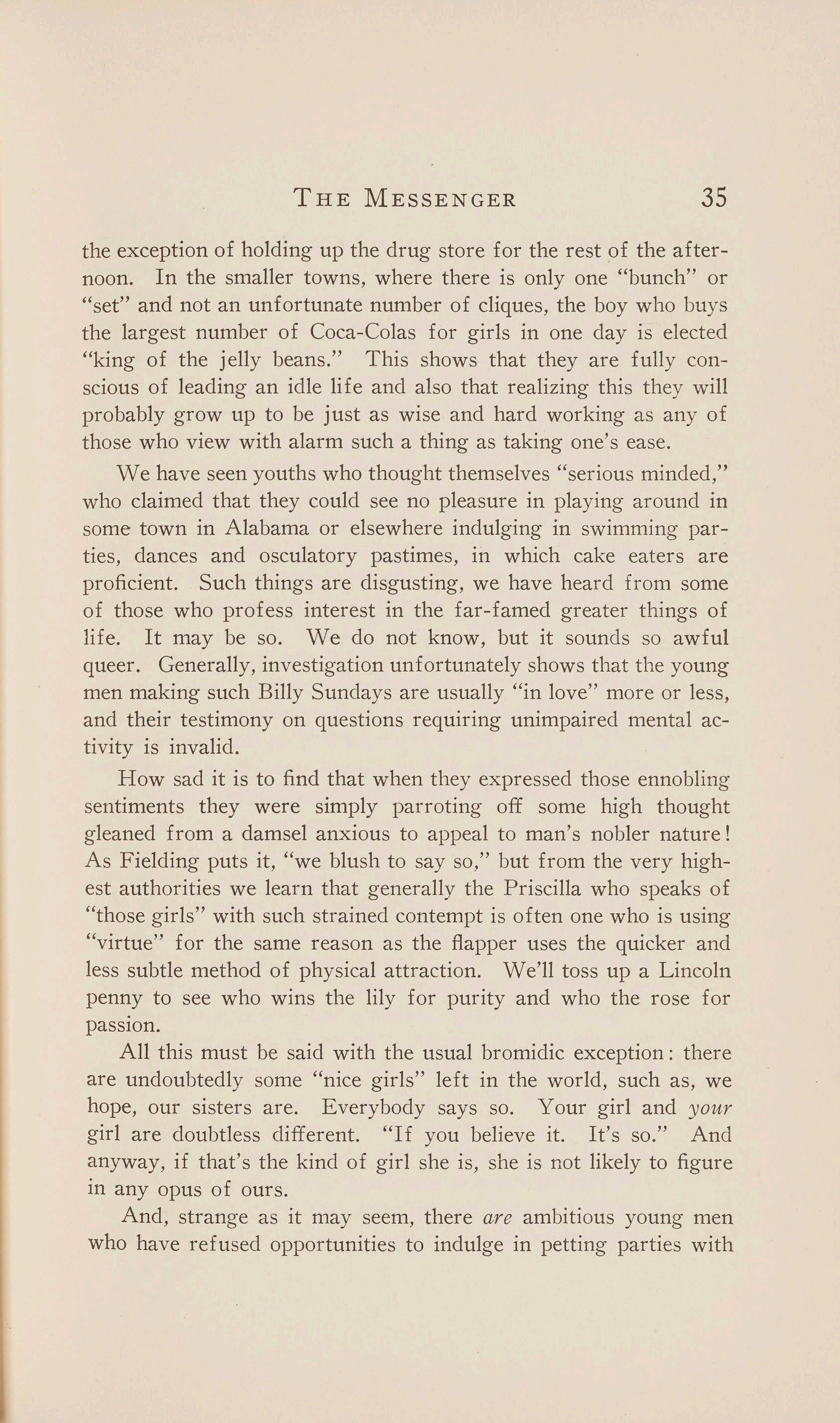
the exception of holding up the drug store for the rest of the afternoon. In the smaller towns, where there is only one "bunch" or "set" and not an unfortunate number of cliques, the boy who buys the largest number of Coca-Colas for girls in one day is elected "king of the jelly beans." This shows that they are fully conscious of leading an idle life and also that realizing this they will probably grow up to be just as wise and hard working as any of those who view with alarm such a thing as taking one's ease.
We have seen youths who thought themselves "serious minded," who claimed that they could see no pleasure in playing around in some town in Alabama or elsewhere indulging in swimming parties, dances and osculatory pastimes, in which cake eaters are proficient. Such things are disgusting, we have heard from some of those who profess interest in the far-famed greater things of life. It may be so. We do not know, but it sounds so awful queer. Generally, investigation unfortunately shows that the young men making such Billy Sundays are usually "in love" more or less, and their testimony on questions requiring unimpaired mental activity is invalid.
How sad it is to find that when they expressed those ennobling sentiments they were simply parroting off some high thought gleaned from a damsel anxious to appeal to man's nobler nature! As Fielding puts it, "we blush to say so," but from the very highest authorities we learn that generally the Priscilla who speaks of "those girls" with such strained contempt is of ten one who is using "virtue" for the same reason as the flapper uses the quicker and less subtle method of physical attraction. We'll toss up a Lincoln penny to see who wins the lily for purity and who the rose for passion.
All this must be said with the usual bromidic exception : there are undoubtedly some "nice girls" left in the world, such as, we hope, our sisters are. Everybody says so. Your girl and your girl are doubtless different. "If you believe it. It's so." And anyway, if that's the kind of girl she is, she is not likely to figure in any opus of ours.
And, strange as it may seem, there are ambitious young men who have refused opportunities to indulge in petting parties with
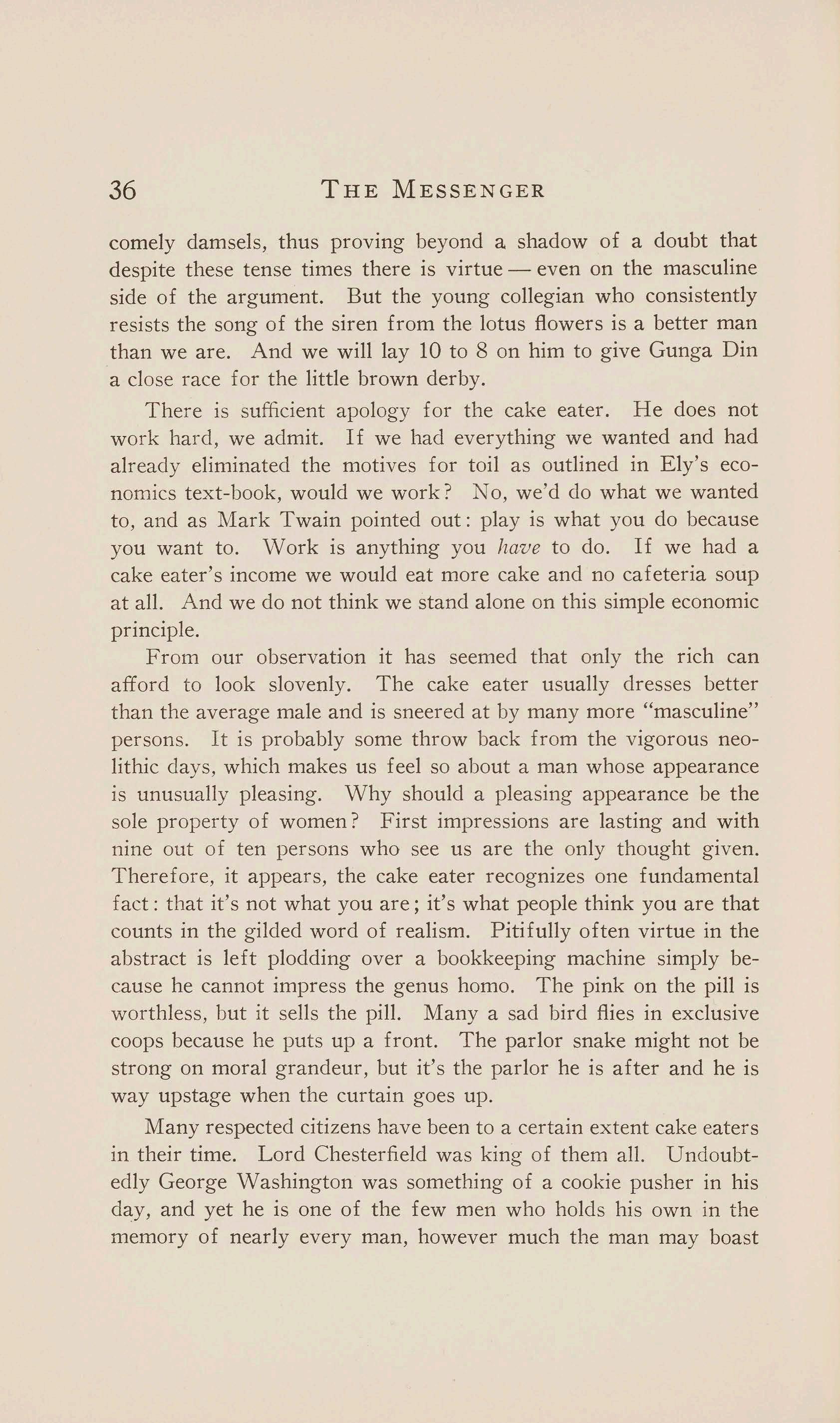
THE MESSENGER
comely damsels, thus proving beyond a shadow of a doubt that despite these tense times there is virtue - even on the masculine side of the argument. But the young collegian who consistently resists the song of the siren from the lotus flowers is a better man than we are. And we will lay 10 to 8 on him to give Gunga Din a close race for the little brown derby.
There is sufficient apology for the cake eater. He does not work hard, we admit. If we had everything we wanted and had already eliminated the motives for toil as outlined in Ely's economics text-book, would we work? N o, we'd do what we wanted to, and as Mark Twain pointed out: play is what you do because you want to. vVork is anything you have to do. If we had a cake eater's income we would eat more cake and no cafeteria soup at all. And we do not think we stand alone on this simple economic principle.
From our observation it has seemed that only the rich can afford to look slovenly. The cake eater usually dresses better than the average male and is sneered at by many more "masculine" persons . It is probably some throw back from the vigorous neolithic clays, which makes us feel so about a man whose appearance is unusually pleasing. Why should a pleasing appearance be the sole property of women? First impressions are lasting and with nine out of ten persons who see us are the only thought given. Therefore, it appears, the cake eater recognizes one fundamental fact: that it's not what you are; it's what people think you are that counts in the gilded word of realism. Pitifully often virtue in the abstract is left plodding over a bookkeeping machine simply because he cannot impress the genus homo. The pink on the pill is worthless, but it sells the pill. Many a sad bird flies in exclusive coops because he puts up a front. The parlor snake might not be strong on moral grandeur, but it's the parlor he is after and he is way upstage when the curtain goes up.
Many respected citizens have been to a certain extent cake eaters in their time. Lord Chesterfield was king of them all. Undoubtedly George Washington was something of a cookie pusher in his clay, and yet he is one of the few men who holds his own in the memory of nearly every man, however much the man may boast
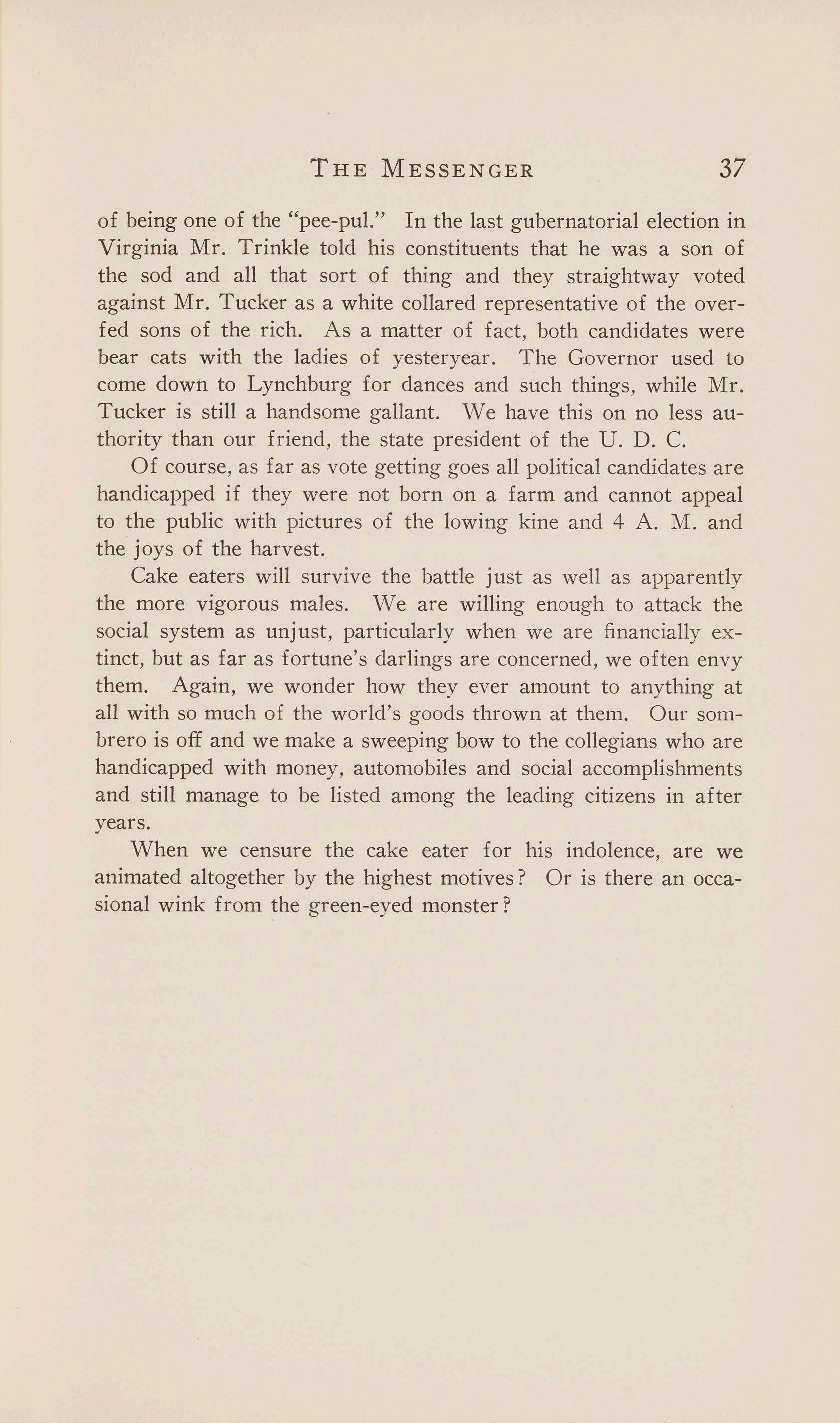
of being one of the "pee-pul." In the last gubernatorial election in Virginia Mr. Trinkle told his constituents that he was a son of the sod and all that sort of thing and they straightway voted against Mr. Tucker as a white collared representative of the over£ed sons of the rich. As a matter of fact, both candidates were bear cats with the ladies of yesteryear. The Governor used to come down to Lynchburg for dances and such things, while Mr. Tucker is still a handsome gallant. We have this on no less authority than our friend, the state president of the U. D. C.
Of course, as far as vote getting goes all political candidates are handicapped if they were not born on a farm and cannot appeal to the public with pictures of the lowing kine and 4 A. M. and the joys of the harvest.
Cake eaters will survive the battle just as well a s apparently the more vigorous males. We are willing en ough to attack the social system as unjust, particularly when we are financially extinct, but as far as fortune's darlings are concerned , we often envy them. Again, we wonder how they ever amount to anything at all with so much of the world's goods thrown at them. Our sombrero is off and we make a sweeping bow to the collegians who are handicapped with money, automobiles and social accomplishments and still manage to be listed among the leading citizens in after years.
When we censure the cake eater for his indolence, are we animated altogether by the highest motives? Or is there an occasional wink from the green-eyed monster P
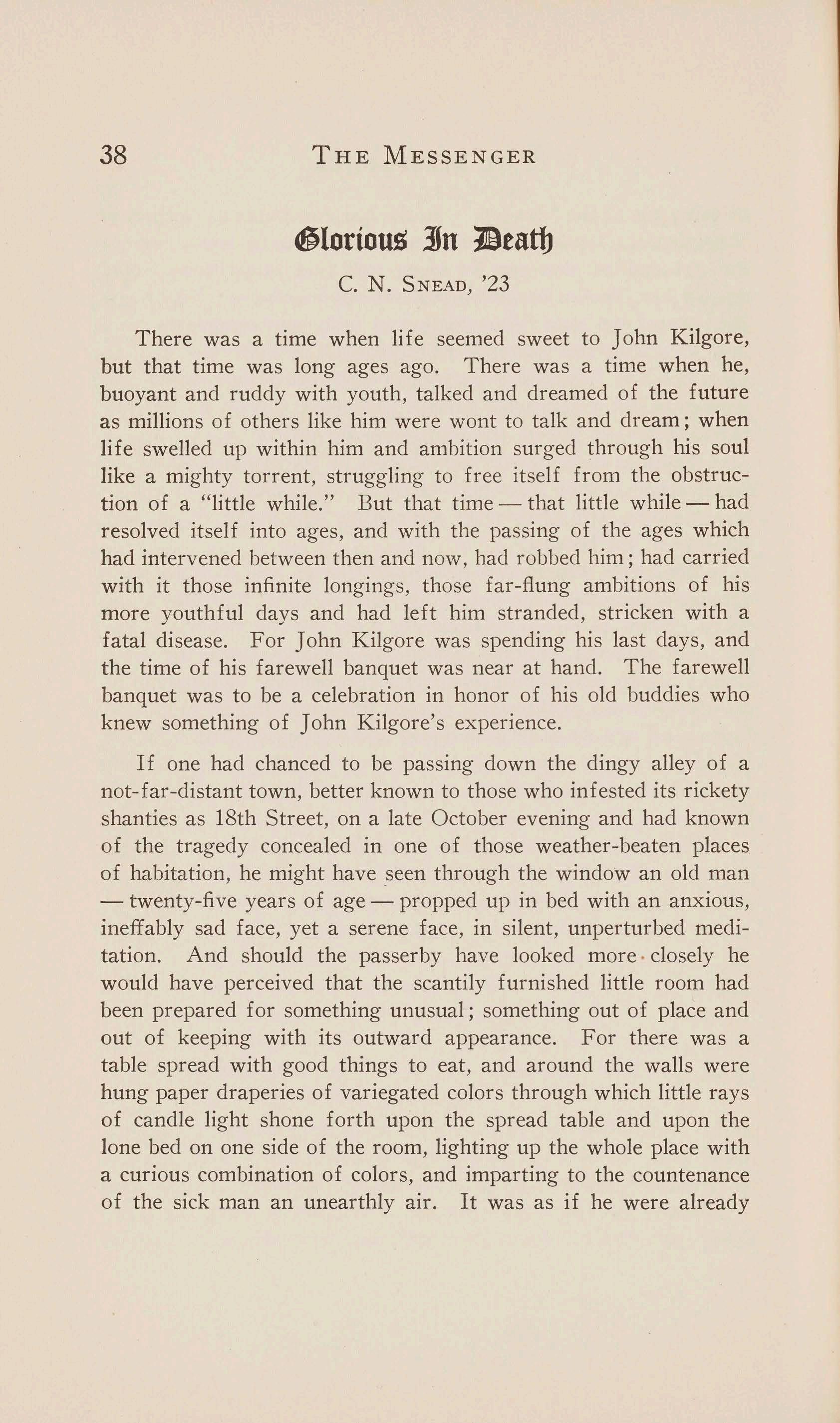
~loriou~3Jnj])eatfJ
C. N. SNEAD, '23
There was a time when life seemed sweet to John Kilgore, but that time was long ages ago. There was a time when he, buoyant and ruddy with youth , talked and dreamed of the future as millions of others like him were wont to talk and dream; when life swelled up within him and ambition surged through his soul like a mighty torrent, struggling to free itself from the obstruction of a "little while." But that time -that little while -had resolved itself into ages, and with the passing of the ages which had intervened between then and now, had robbed him; had carried with it those infinite longings, those far-flung ambitions of his more youthful days and had left him stranded, stricken with a fatal disease. For John Kilgore was spending his last clays, and the time of his farewell banquet was near at hand. The farewell banquet was to be a celebration in honor of his old buddies who knew something of John Kilgore's experience.
If one had chanced to be passing down the dingy alley of a not-far-distant town, better known to those who infested its rickety shanties as 18th Street, on a late October evening and had known of the tragedy concealed in one of those weather-beaten places of habitation, he might have seen through the window an old man -twenty-five years of age -propped up in bed with an anxious, ineffably sad face, yet a serene face, in silent, unperturbed meditation. And should the passerby have looked more • closely he would have perceived that the scantily furnished little room had been prepared for something unusual; something out of place and out of keeping with its outward appearance. For there was a table spread with good things to eat, and around the walls were hung paper draperies of variegated colors through which little rays of candle light shone forth upon the spread table and upon the lone bed on one side of the room, lighting up the whole place with a curious combination of colors, and imparting to the countenance of the sick man an unearthly air. It was as if he were already
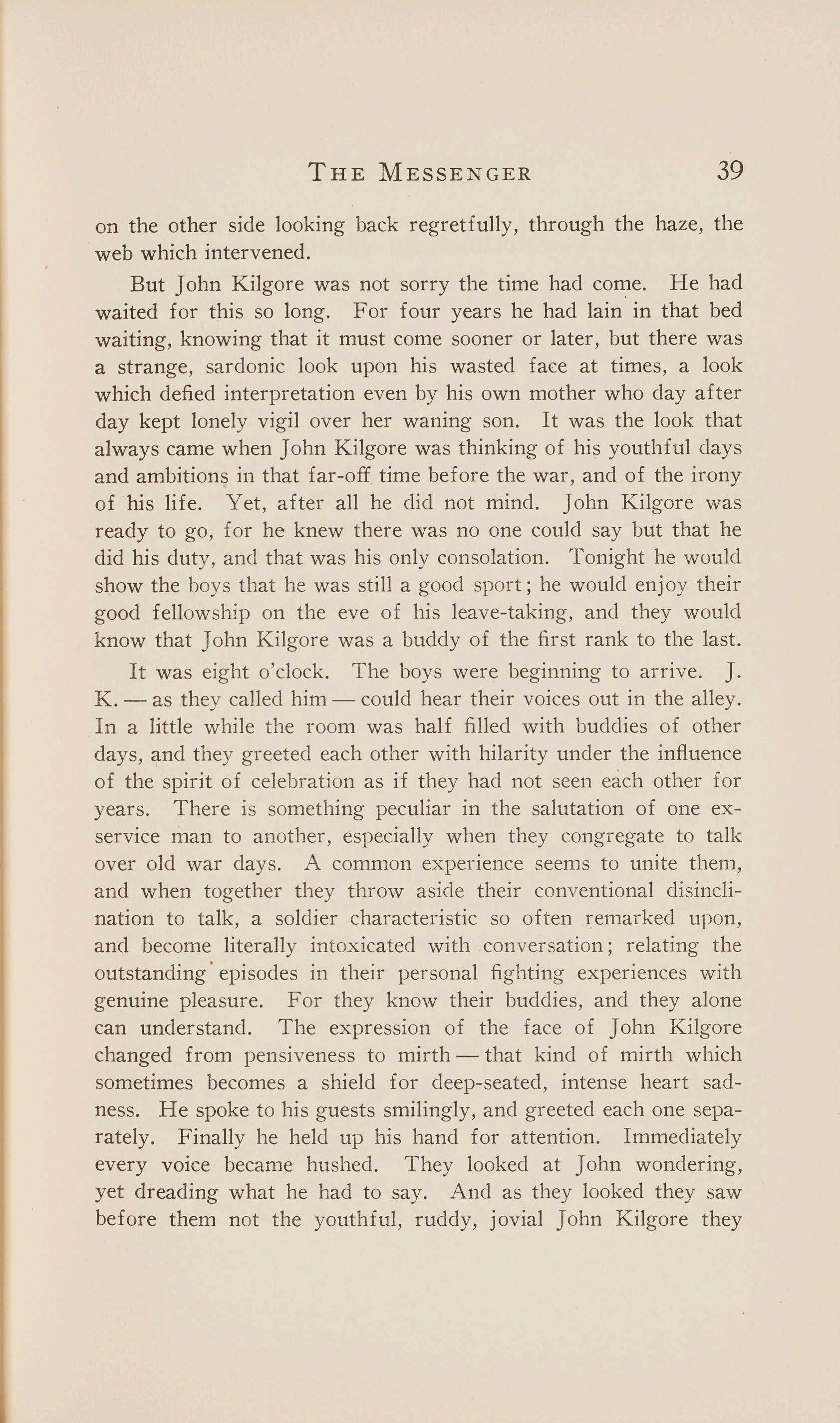
on the other side looking back regretfully, through the haze, the web which intervened.
But John Kilgore was not sorry the time had come. He had waited for this so long. For four years he had lain in that bed waiting, knowing that it must come sooner or later, but there was a strange, sardonic look upon his wasted face at times, a look which defied interpretation even by his own mother who day after day kept lonely vigil over her waning son. It was the look that always came when John Kilgore was thinking of his youthful days and ambitions in that far-off time before the war, and of the irony of his life. Yet, after all he did not mind. John Kilgore was ready to go, for he knew there was no one could say but that he did his duty, and that was his only consolation. Tonight he would show the boys that he was still a good sport; he would enjoy their good fellowship on the eve of his leave-taking, and they would know that John Kilgore was a buddy of the first rank to the last. It was eight o'clock. The boys were beginning to arrive. J. K. - as they called him - could hear their voices out in the alley. In a little while the room was half filled with buddies of other days, and they greeted each other with hilarity under the influence of the spirit of celebration as if they had not seen each other for years. There is something peculiar in the salutation of one exservice man to another, especially when they congregate to talk over old war days. A common experience seems to unite them, and when together they throw aside their conventional disinclination to talk, a soldier characteristic so often remarked upon, and become literally intoxicated with conversation; relating the outstanding · episodes in their personal fighting experiences with genuine pleasure. For they know their buddies, and they alone can understand. The expression of the face of John Kilgore changed from pensiveness to mirth - that kind of mirth which sometimes becomes a shield for deep-seated, intense heart sadness. He spoke to his guests smilingly, and greeted each one separately. Finally he held up his hand for attention. Immediately every voice became hushed. They looked at John wondering, yet dreading what he had to say. And as they looked they saw before them not the youthful, rudely, jovial John Kilgore they
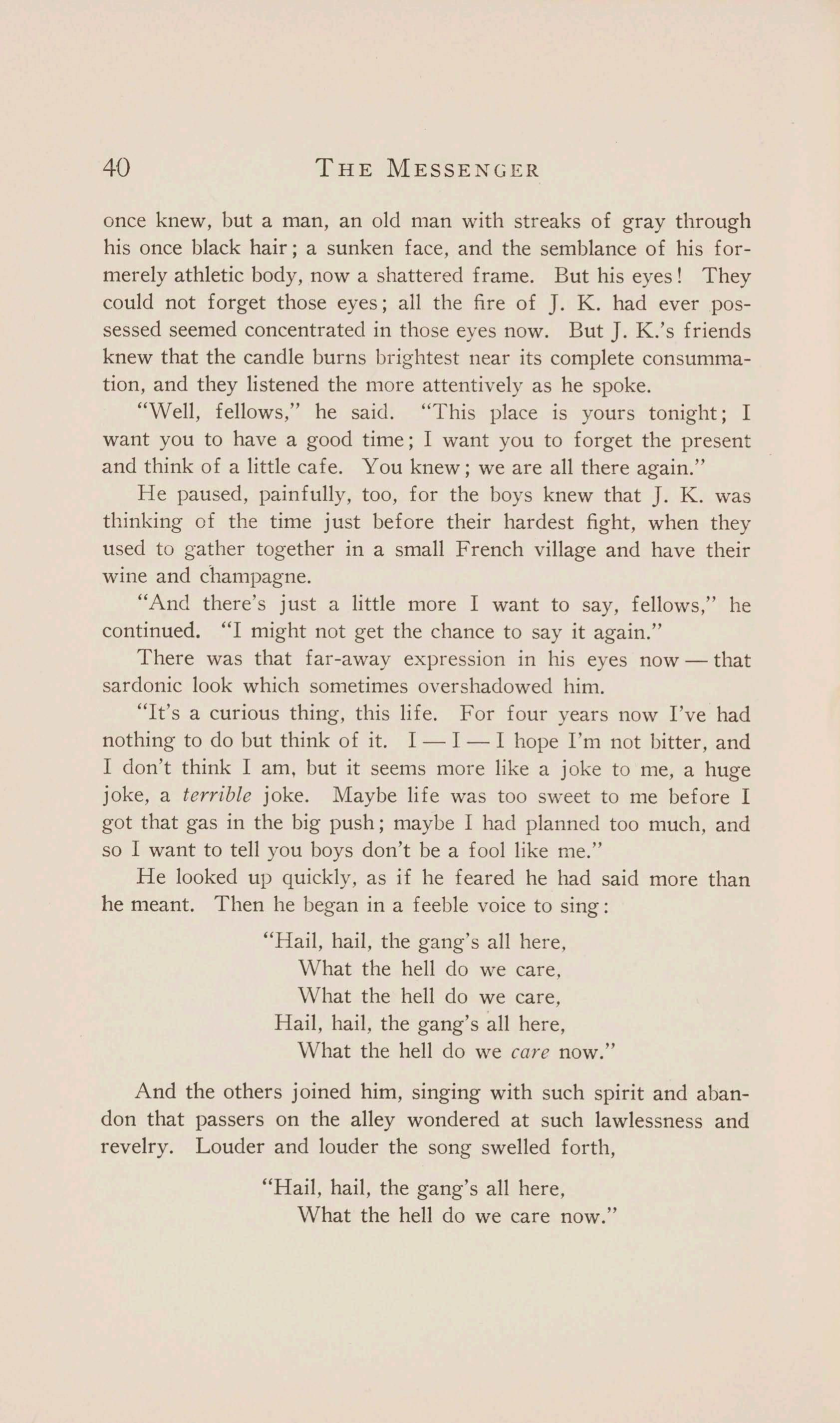
THE MESSENGER
once knew, but a man, an old man with streaks of gray through his once black hair; a sunken face, and the semblance of his formerely athletic body, now a shattered frame. But his eyes! They could not forget those eyes ; all the fire of J. K. had ever possessed seemed concentrated in those eyes now. But J. K.'s friends knew that the candle burns brightest near its complete consummation, and they listened the more attentively as he spoke.
"Well, fellows," he said. "This place is yours tonight; I want you to have a good time; I want you to forget the present and think of a little cafe. You knew; we are all there again.''
He paused, painfully, too, for the boys knew that J. K. was thinking of the time just before their hardest fight, when they used to gather together in a small French village and have their wine and champagne.
"And there's just a little more I want to say, fellows," he continued. "I might not get the chance to say it again."
There was that far-away expression in his eyes now - that sardonic look which sometimes overshadowed him.
"It's a curious thing, this life. For four years no,v I've had nothing to do but think of it. I - I - I hope I'm not bitter, and I don't think I am, but it seems more like a joke t o me, a huge joke, a terrible joke. Maybe life was too sweet to me before I got that gas in the big push; maybe I had planned too much, and so I want to tell you boys don't be a fool like me.''
He looked up quickly, as if he feared he had said more than he meant. Then he began in a feeble voice to sing:
"Hail, hail, the gang's all here, What the hell do we care, What the hell do we care, Hail, hail, the gang's all here, vVhat the hell do we care now.''
And the others joined him, singing with such spirit and abandon that passers on the alley wondered at such lawlessness and revelry. Louder and louder the song swelled forth,
"Hail, hail, the gang's all here, What the hell do we care now.''
And for the best part of the night the celebration continued. The farewell banquet was a huge success, and when morning came and the little room was empty again save for its lone occupant, there was a calm in the soul of John Kilgore, and peace had come to dwell in his lonely heart.
. They buried him not long after in a neighboring cemetery. A little slab of stone marks his resting place. The little old rickety shanty in which he had lain for so long still stands as if it treasured the secret it holds from the world. Even the mother of John Kilgore is gone. Where? No one stops to ask. But of ten a little woman in black still finds the time to search out the grave of the soldier, and keeps lonely vigil there. And just as often she will silently weep as she reads and rereads on the little stone slab this singular, official inscription :
JOHN KILGORE (No. 186439)
PRIVATE SOLDIER
Died October 20, 1922 «Glorious in death as in life , A soldier of Uncle Sam."
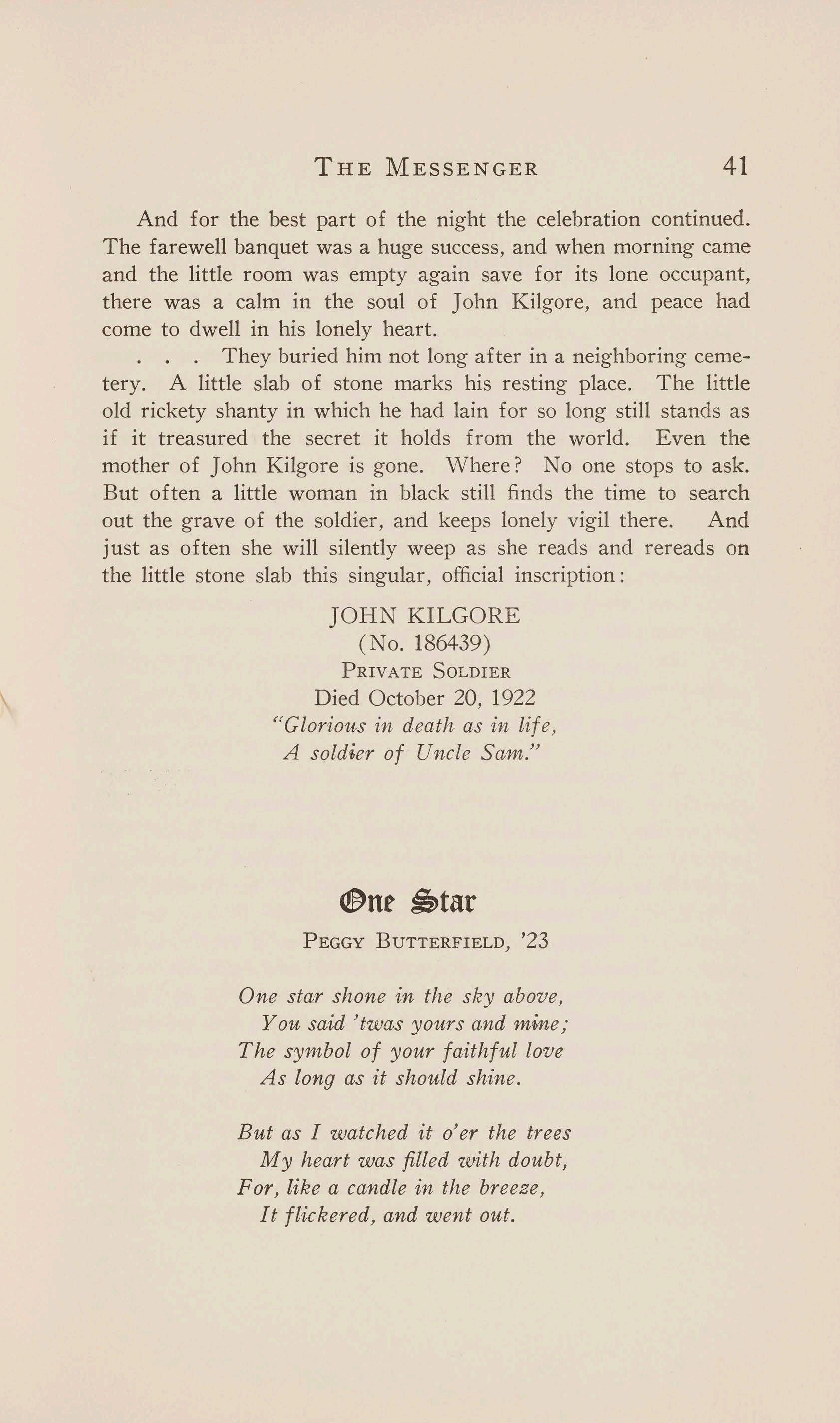
®nr ~tar
PEGGY BUTTERFIELD, '23
One star shone in the sky above , You said 'twas yours and mine; The symbol of your faithful love As long as it should shine.
But as I watched it o'er the trees My heart was filled with doubt, For, like a candle in the breeze, It flickered, and went out.
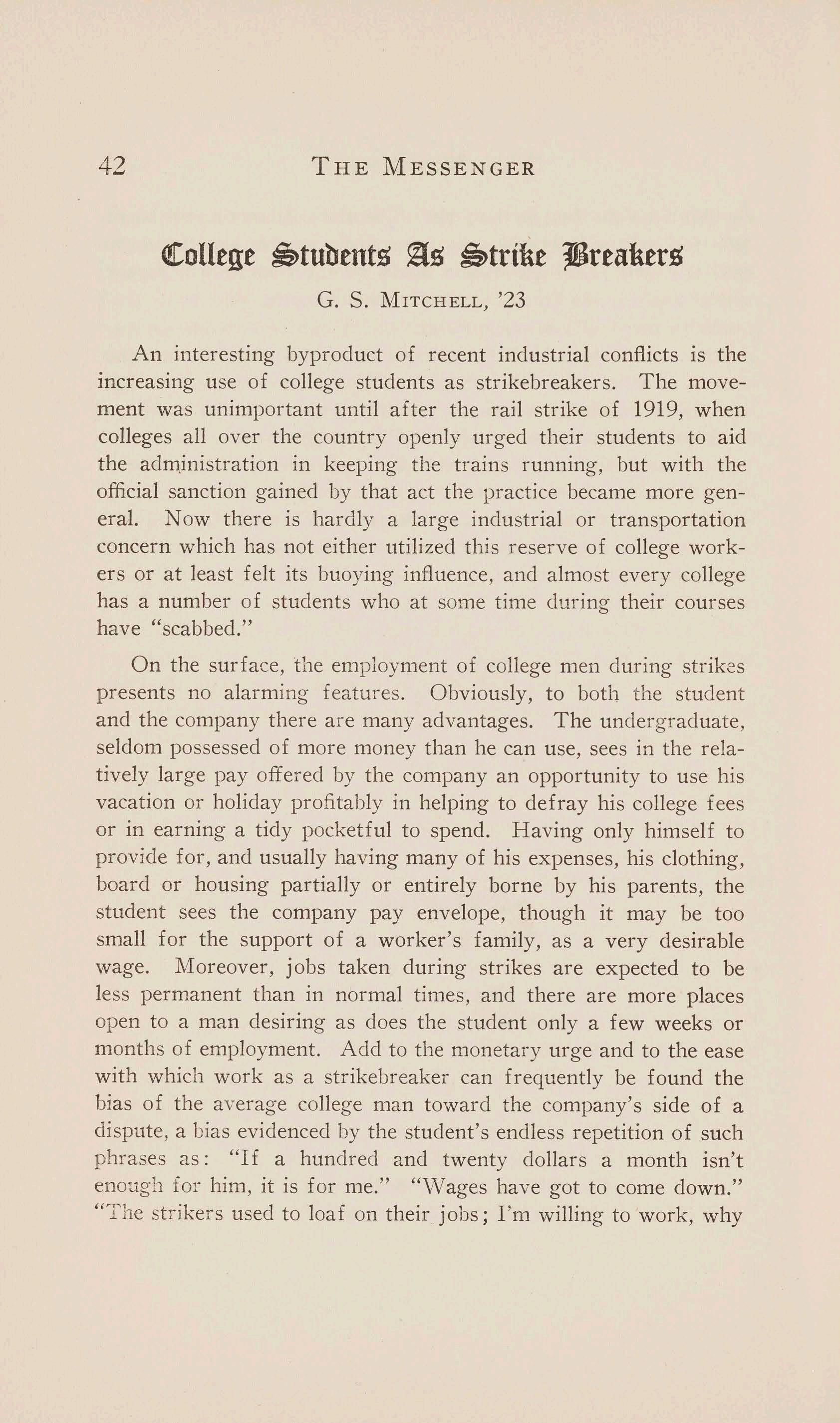
<tollege~tubents £ls ~trtke jireakers
G. s. MITCHELL, '23
An interesting byproduct of recent industrial conflicts is the increasing use of college students as strikebreakers. The movement was unimportant until after the rail strike of 1919, when colleges all over the country openly urged their students to aid the administration in keeping the trains running, but with the official sanction gained by that act the practice became more general. Now there is hardly a large industrial or transportation concern which has not either utilized this reserve of college workers or at least felt its buoying influence, and almost every college has a number of students who at some time during their courses have "scabbed."
On the surface, the employment of college men during strikes presents no alarming features. Obviously, to both the student and the company there are many advantages. The uncler gr acluate , seldom possessed of more money than he can use, sees in the relatively large pay offered by the company an opportunity to use his vacation or holiday profitably in helping to defray his college fees or in earning a tidy pocketful to spend Having only himself to provide for, and usually having many of his expenses, his clothing, board or housing partially or entirely borne by his parents, the student sees the company pay envelope, though it may be too small for the support of a worker's family, as a very desirable wage. Moreover, jobs taken during strikes are expected to be less permanent than in normal times, and there are more places open to a man desiring as does the studen t only a few weeks or months of employment. Acid to the monetary urge and to the ease with which work as a strikebreaker can frequently be found the bias of the average college man toward the company's side of a dispute, a bias evidenced by the student's endless repetition of such phrases as : "If a hundred and twenty dollars a month isn't enough for him, it is for me." "\,Vages have got to come down." "The strikers used to loaf on their jobs; I'm willing to work, why
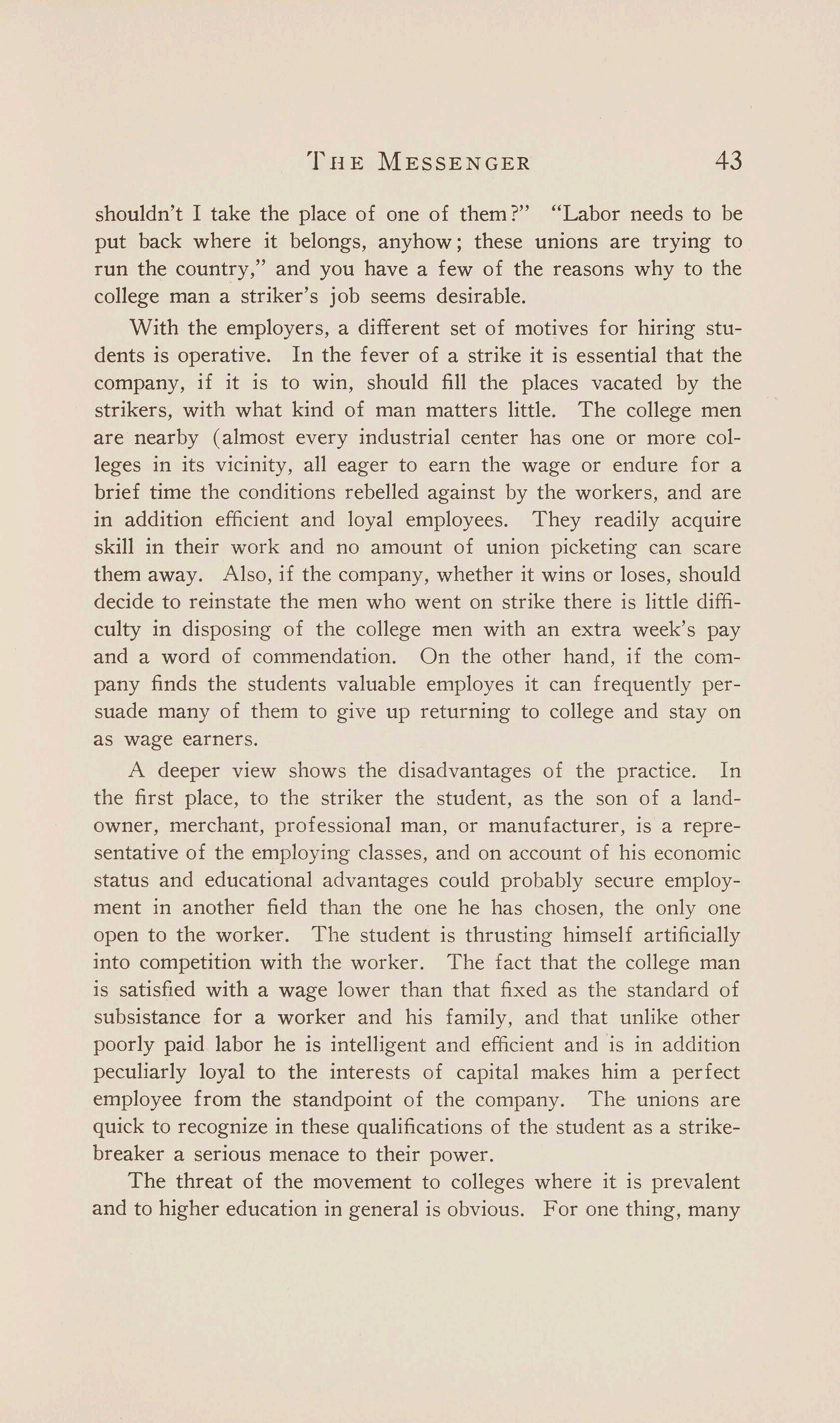
shouldn't I take the place of one of them?" "Labor needs to be put back where it belongs, anyhow; these unions are trying to run the country," and you have a few of the reasons why to the college man a striker's job seems desirable.
With the employers, a different set of motives for hiring students is operative. In the fever of a strike it is essential that the company, if it is to win, should fill the places vacated by the strikers, with what kind of man matters little. The college men are nearby ( almost every industrial center has one or more colleges in its vicinity, all eager to earn the wage or endure for a brief time the conditions rebelled against by the workers, and are in addition efficient and loyal employees. They readily acquire skill in their work and 110 amount of union picketing can scare them away. Also, if the company, whether it wins or loses, should decide to reinstate the men who went on strike there is little difficulty in disposing of the college men with an extra week's pay and a word of commendation. On the other hand, if the company finds the students valuable employes it can frequently persuade many of them to give up returning to college and stay on as wage earners.
A deeper view shows the disadvantages of the practice. In the first place, to the striker the student, as the son of a landowner, merchant, professional man, or manufacturer, is a representative of the employing classes, and on account of his economic status and educational advantages could probably secure employment in another field than the one he has chosen, the only one open to the worker. The student is thrusting himself artificially into competition with the worker. The fact that the college man is satisfied with a wage lower than that fixed as the standard of subsistance for a worker and his family, and that unlike other poorly paid labor he is intelligent and efficient and is in addition peculiarly loyal to the interests of capital makes him a perfect employee from the standpoint of the company. The unions are quick to recognize in these qualifications of the student as a strikebreaker a serious menace to their power.
The threat of the movement to colleges where it is prevalent and to higher education in general is obvious. For one thing, many
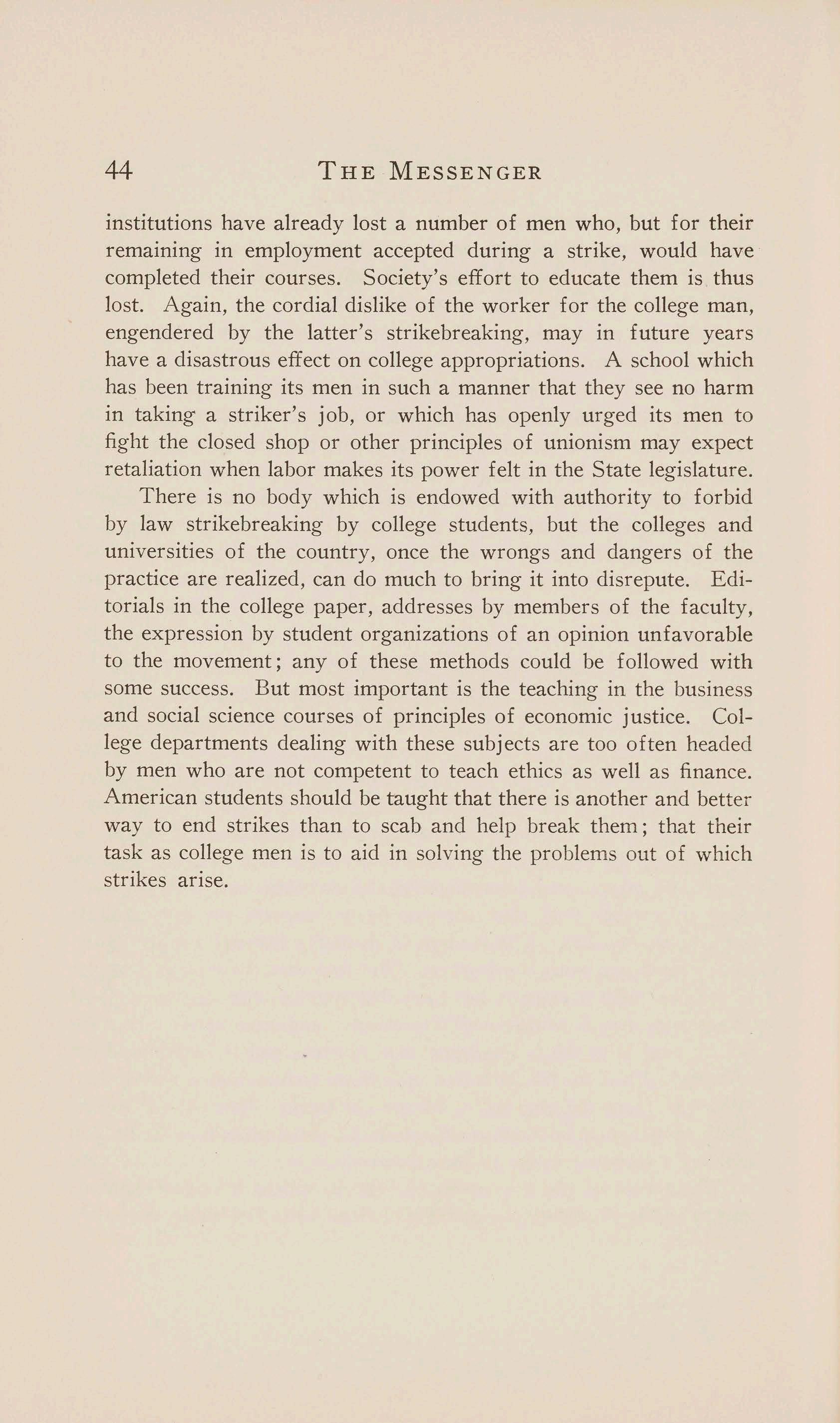
THE MESSENGER
institutions have already lost a number of men who, but for their remaining in employment accepted during a strike, would have completed their courses. Society's effort to educate them is thus lost. Again, the cordial dislike of the worker for the college man, engendered by the latter's strikebreaking, may in future years have a disastrous effect on college appropriations. A school which has been training its men in such a manner that they see no harm in taking a striker's job, or which has openly urged its men to fight the closed shop or other principles of unionism may expect retaliation when labor makes its power felt in the State legislature. There is no body which is endowed with authority to forbid by law strikebreaking by college students, but the colleges and universities of the country, once the wrongs and dangers of the practice are realized, can do much to bring it into disrepute. Editorials in the college paper, addresses by members of the faculty, the expression by student organizations of an opinion unfavorable to the movement; any of these methods could be followed with some success. But most important is the teaching in the business and social science courses of principles of economic justice. College departments dealing with these subjects are too often headed by men who are not competent to teach ethics as well as finance. American students should be taught that there is another and better way to end strikes than to scab and help break them; that their task as college men is to aid in solving the problems out of which strikes arise.
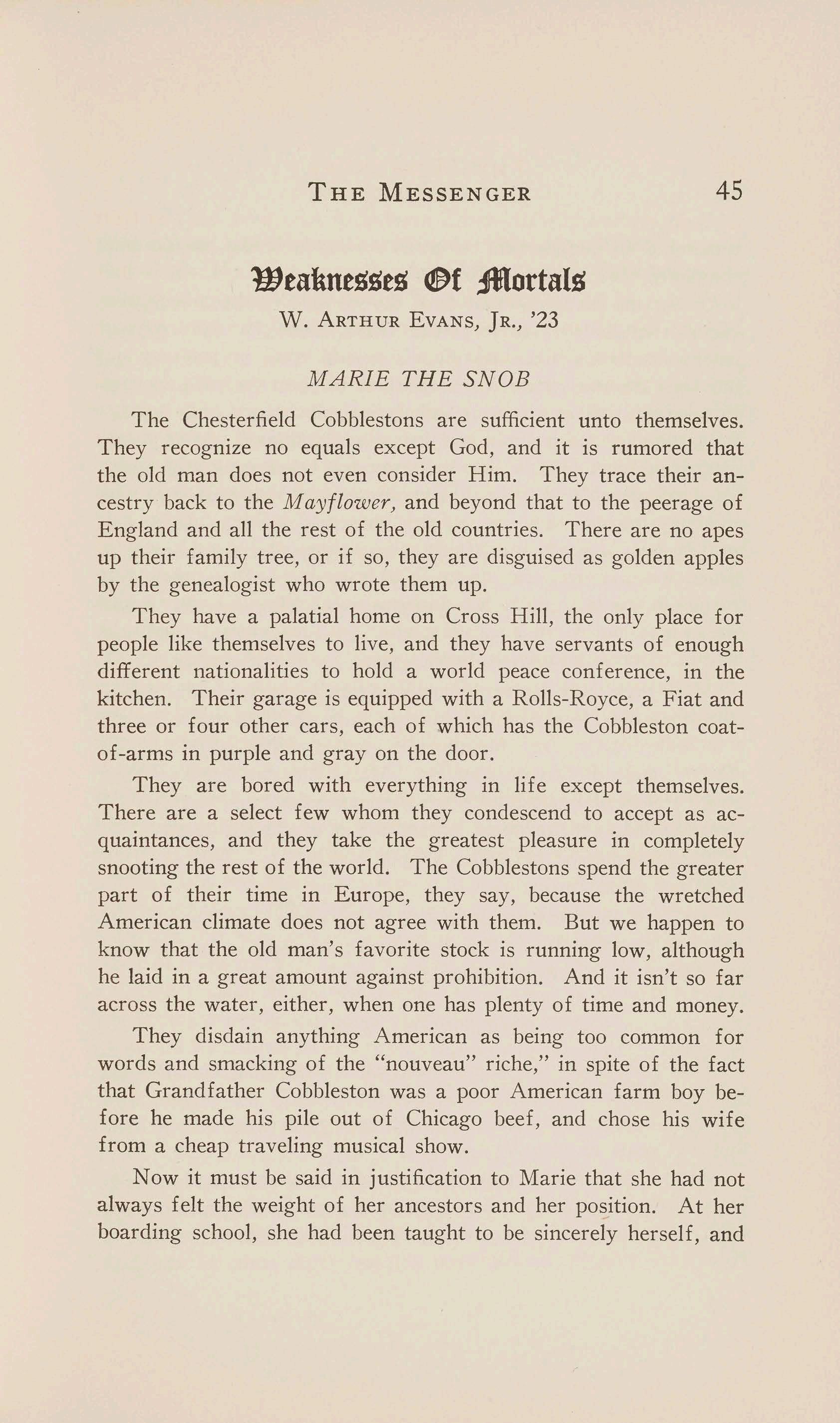
Wtaknt~~t~@f ~ortal~
W. ARTHUR EVANS, JR., '23
MARIE THE SNOB
The Chesterfield Cobblestons are sufficient unto themselves. They recognize no equals except God, and it is rumored that the old man does not even consider Him. They trace their ancestry back to the Mayflower, and beyond that to the peerage of England and all the rest of the old countries. There are no apes up their family tree, or if so, they are disguised as golden apples by the genealogist who wrote them up.
They have a palatial home on Cross Hill, the only place for people like themselves to live, and they have servants of enough different nationalities to hold a world peace con£erence, in the kitchen. Their garage is equipped with a Rolls-Royce, a Fiat and three or four other cars, each of which has the Cobbleston coatof-arms in purple and gray on the door.
They are bored with everything in life except themselves. There are a select few whom they condescend to accept as acquaintances, and they take the greatest pleasure in completely snooting the rest of the world. The Cobblestons spend the greater part of their time in Europe, they say, because the wretched American climate does not agree with them. But we happen to know that the old man's favorite stock is running low, although he laid in a great amount against prohibition. And it isn't so far across the water, either, when one has plenty of time and money.
They disdain anything American as being too common for words and smacking of the "nouveau" riche," in spite of the fact that Grandfather Cobbleston was a poor American farm boy before he made his pile out of Chicago beef, and chose his wife from a cheap traveling musical show.
Now it must be said in justification to Marie that she had not always felt the weight of her ancestors and her position. At her boarding school, she had been taught to be sincerely herself, and
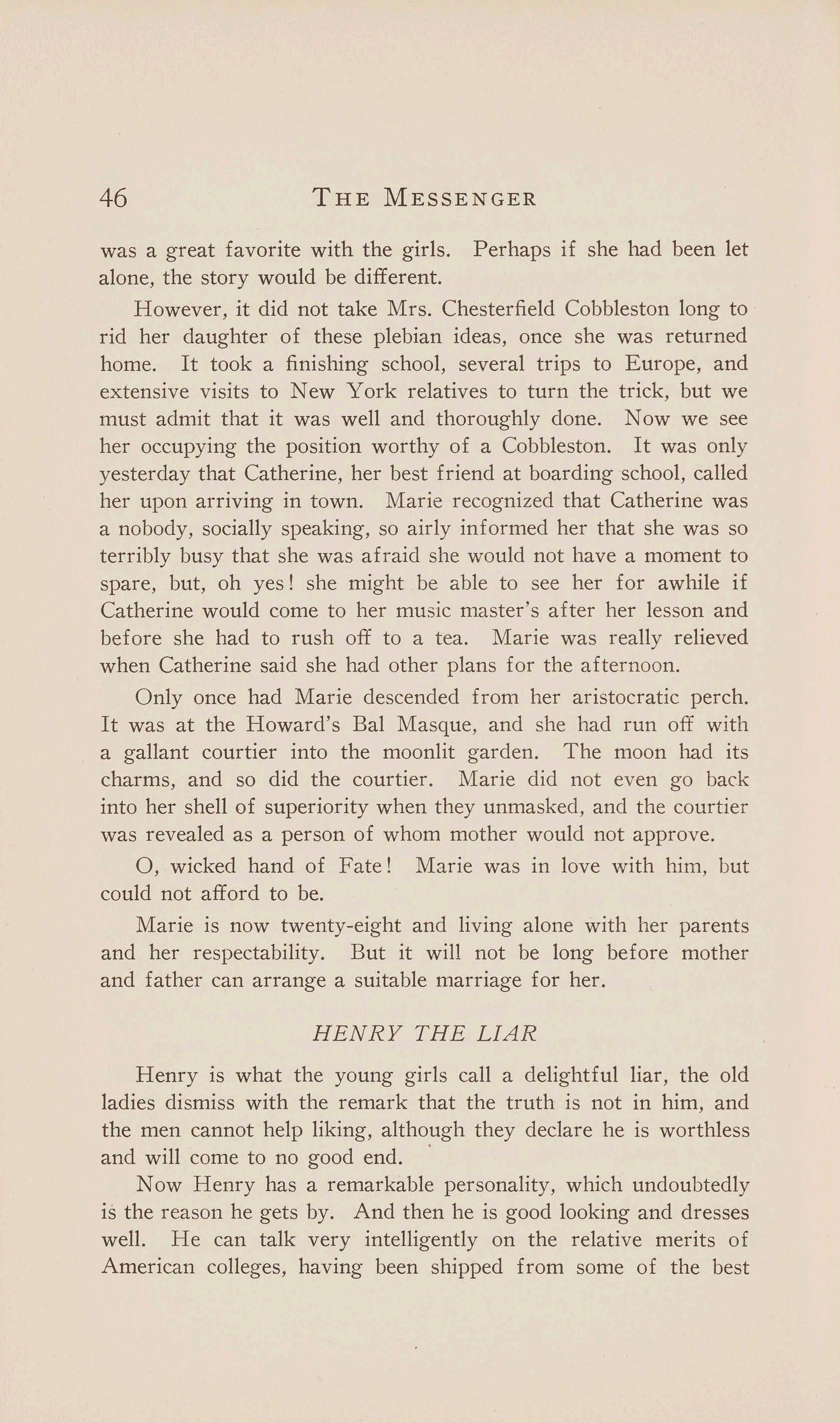
THE MESSENGER
was a great favorite with the girls. Perhaps if she had been let alone, the story would be different.
However, it did not take Mrs. Chesterfield Cobbleston long to rid her daughter of these plebian ideas, once she was returned home. It took a finishing school, several trips to Europe, and extensive visits to New York relatives to turn the trick, but we must admit that it was well and thoroughly done. Now we see her occupying the position worthy of a Cobbleston. It was only yesterday that Catherine, her best friend at boarding school, called her upon arriving in town. Marie recognized that Catherine was a nobody, socially speaking, so airly informed her that she was so terribly busy that she was afraid she would not have a moment to spare, but, oh yes! she might be able to see her for awhile if Catherine would come to her music master's after her lesson and before she had to rush off to a tea. Marie was really relieved when Catherine said she had other plans for the afterno on.
Only once had Marie descended from her aristocratic perch. It was at the Howard's Bal Masque, and she had run off with a gallant courtier into the moonlit garden. The moon had its charms, and so did the courtier. Marie did not ev en go back into her shell of superiority when they unmasked, and the courtie r was revealed as a person of whom mother would not approve.
0, wicked hand of Fate! Marie was in love with him, but could not afford to be.
Marie is now twenty-eight and living alone with her parents and her respectability. But it will not be long before mother and father can arrange a suitable marriage for her.
HENRY THE LIAR
Henry is what the young girls call a delightful liar, the old ladies dismiss with the remark that the truth is not in him, and the men cannot help liking, although they declare he is worthless and will come to no good encl. ·
Now Henry has a remarkable personality, which undoubtedly is the reason he gets by. And then he is good looking and dresses well. He can talk very intelligently on the relative merits of American colleges, having been shipped from some of the best
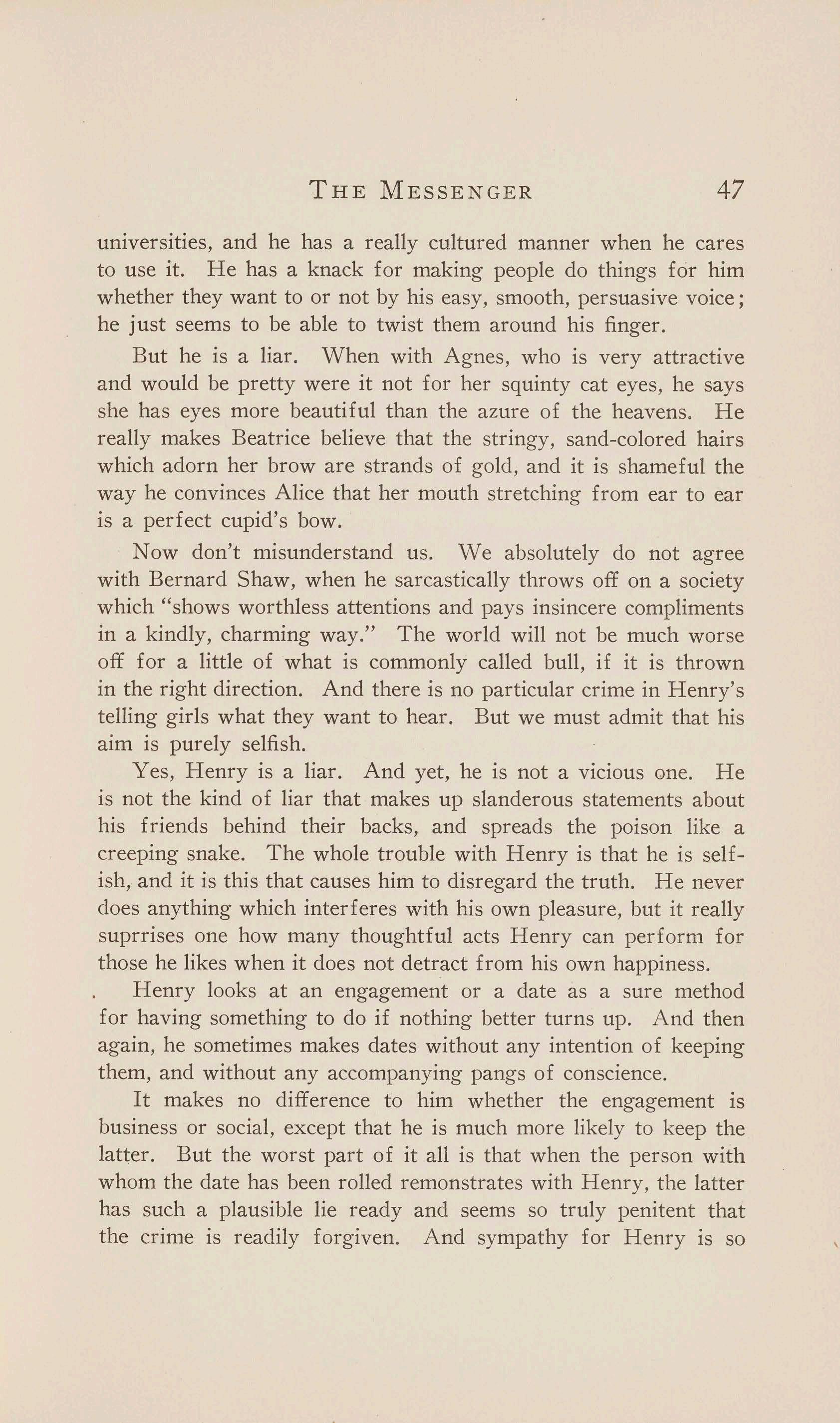
universities, and he has a really cultured manner when he cares to use it. He has a knack for making people do things for him whether they want to or not by his easy, smooth, persuasive voice; he just seems to be able to twist them around his finger.
But he is a liar. When with Agnes, who is very attractive and would be pretty were it not for her squinty cat eyes, he says she has eyes more beautiful than the azure of the heavens. He really makes Beatrice believe that the stringy, sand-colored hairs which adorn her brow are strands of gold, and it is shameful the way he convinces Alice that her mouth stretching from ear to ear is a perfect cupid's bow.
Now don't misunderstand us. We absolutely do not agree with Bernard Shaw, when he sarcastically throws off on a society which "shows worthless attentions and pays insincere compliments in a kindly, charming way." The world will not be much worse off for a little of what is commonly called bull, if it is thrown in the right direction. And there is no particular crime in Henry's telling girls what they want to hear. But we must admit that his aim is purely selfish.
Yes, Henry is a liar. And yet, he is not a vicious one. He is not the kind of liar that makes up slanderous statements about his friends behind their backs, and spreads the poison like a creeping snake. The whole trouble with Henry is that he is selfish, and it is this that causes him to disregard the truth. He never does anything which inter£ eres with his own pleasure, but it really suprrises one how many thoughtful acts Henry can perform for those he likes when it does not detract from his own happiness.
Henry looks at an engagement or a date as a sure method for having something to do if nothing better turns up. And then again, he sometimes makes dates without any intention of keeping them, and without any accompanying pangs of conscience.
It makes no difference to him whether the engagement is business or social, except that he is much more likely to keep the latter. But the worst part of it all is that when the person with whom the date has been rolled remonstrates with Henry, the latter has such a plausible lie ready and seems so truly penitent that the crime is readily forgiven. And sympathy for Henry is so
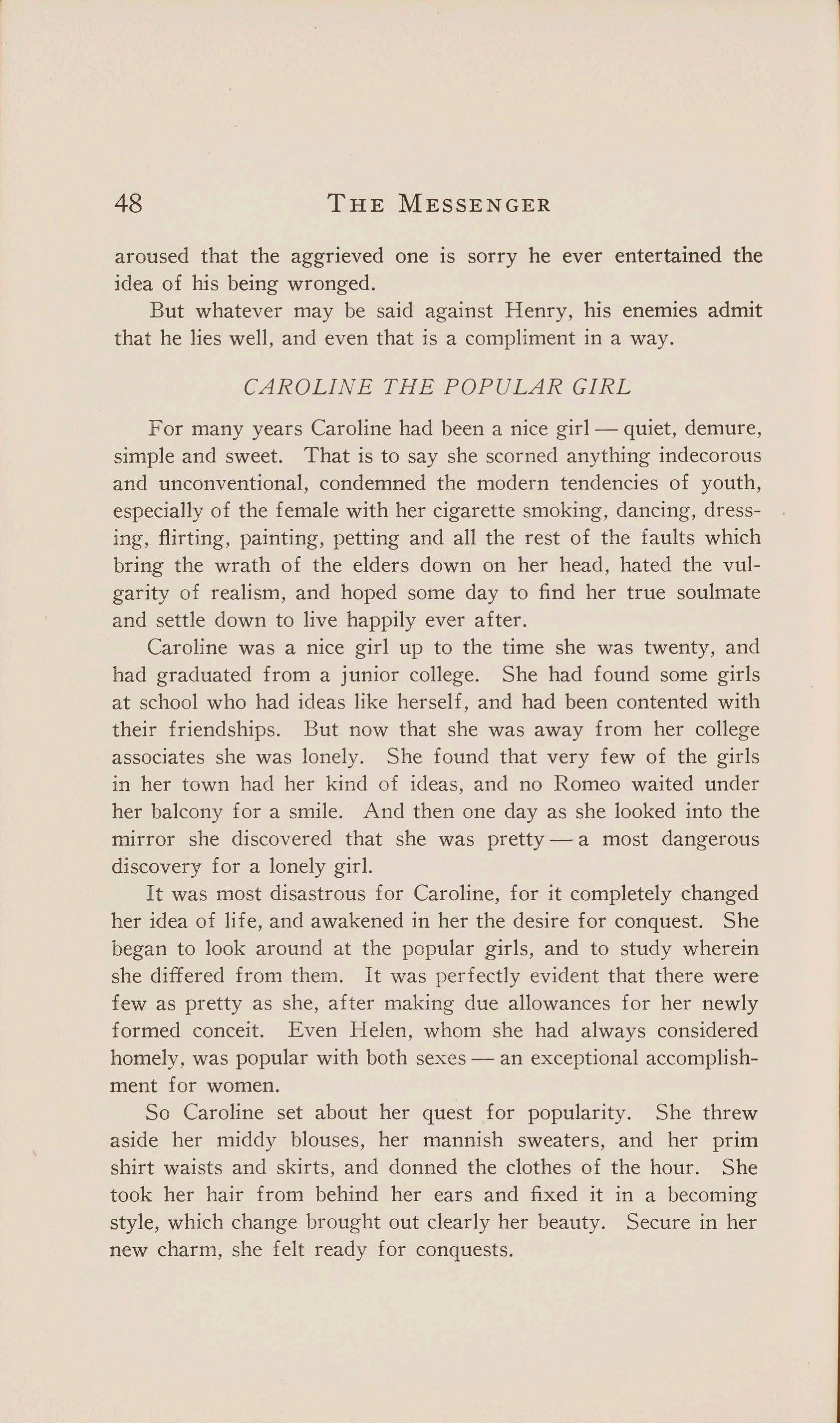
THE MESSENGER
aroused that the aggrieved one is sorry he ever entertained the idea of his being wronged.
But whatever may be said against Henry, his enemies admit that he lies well, and even that is a compliment in a way.
CAROLINE THE POPULAR GIRL
For many years Caroline had been a nice girl - quiet, demure, simple and sweet. That is to say she scorned anything indecorous and unconventional, condemned the modern tendencies of youth, especially of the female with her cigarette smoking, dancing, dressing, flirting, painting, petting and all the rest of the faults which bring the wrath of the elders down on her head, hated the vulgarity of realism, and hoped some day to find her true soulmate and settle down to live happily ever after.
Caroline was a nice girl up to the time she was twenty, and had graduated from a junior college. She had found some girls at school who had ideas like herself, and had been contented with their friendships. But now that she was away from her college associates she was lonely. She found that very few of the girls in her town had her kind of ideas, and no Romeo waited under her balcony for a smile. And then one day as she looked into the mirror she discovered that she was pretty - a most dangerous discovery for a lonely girl.
It was most disastrous for Caroline, for it completely changed her idea of life, and awakened in her the desire for conquest. She began to look around at the popular girls, and to study wherein she differed from them. It was perfectly evident that there were few as pretty as she, after making due allowances for her newly formed conceit. Even Helen, whom she had always considered homely, was popular with both sexes - an exceptional accomplishment for women.
So Caroline set about her quest for popularity. She threw aside her middy blouses, her mannish sweaters, and her prim shirt waists and skirts, and donned the clothes of the hour. She took her hair from behind her ears and fixed it in a becoming style, which change brought out clearly her beauty. Secure in her new charm, she felt ready for conquests.
Caroline is a popular girl. She is always full of pep, and never wants for breaks at dances, or for dates in between them. She keeps time to the music with her chewing gum, while she looks up at her partner in a dreamy fashion. The gum only stops long enough for her to ask where he has been all of her life. She can double shuffle to perfection and can give the railroad choo-choo in a particularly fetching way.
Everything to Caroline is the "bee's knees" or the "cat's pyjamas" and she answers the majority of questions with "ain't nothing previous," "ain't go'n do nothing else," and "ain't his brother."
Why is Caroline popular? We don't know. Suppose you ask those who rush her.
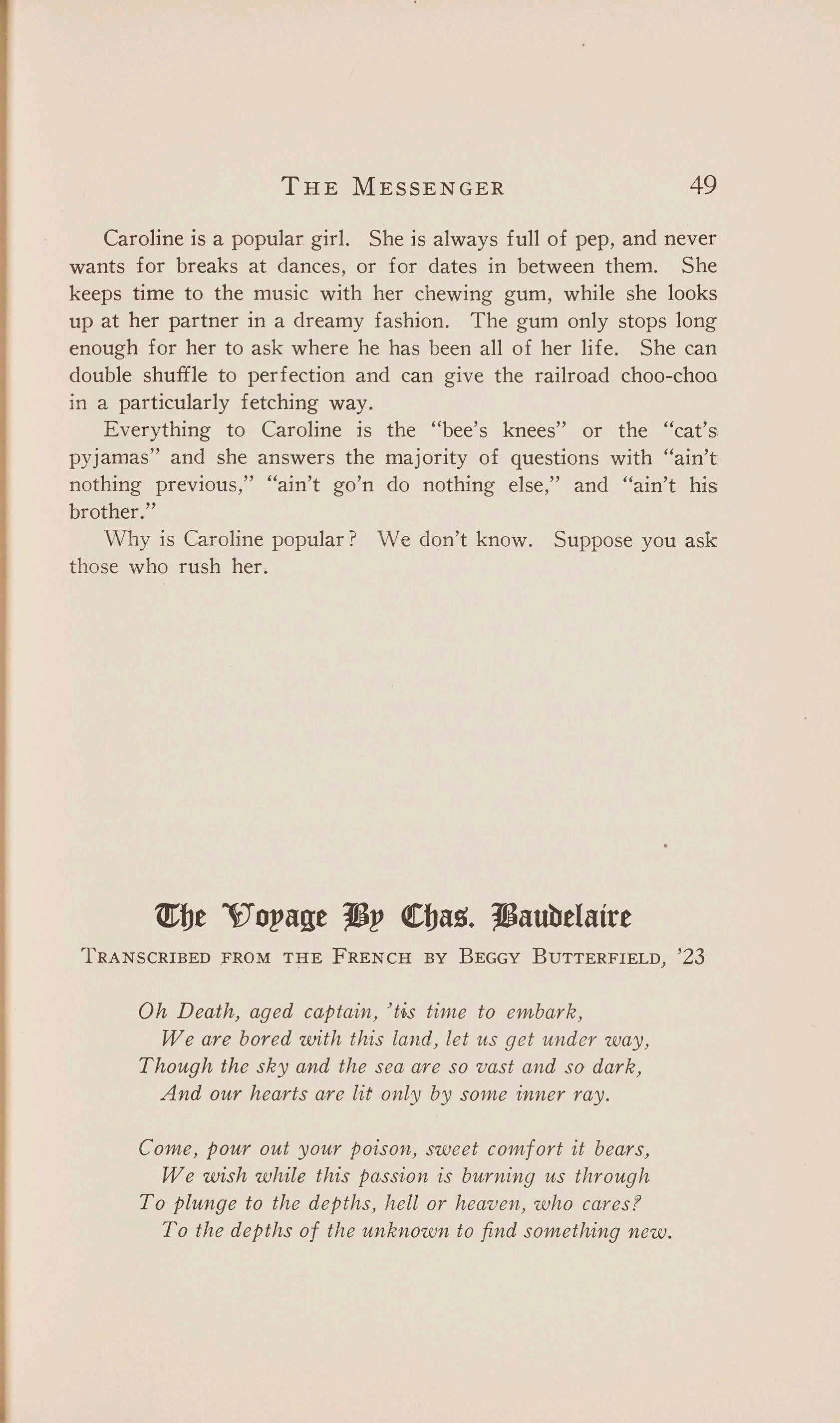
t!tbt 1vopagcJip (:ba~. J§aubtlairt
TRANSCRIBED .FROM THE FRENCH BY BEGGY BUTTERFIELD, '23
Oh Death, aged captain, 'tis time to embark, We are bored with this land, let us get under way, Though the sky and the sea are so vast and so dark, And our hearts are lit only by some inner ray.
Come, pour out your poison, sweet comfort it bears, We wish while this passion is burning us through To plunge to the depths, hell or heaven, who cares'! To the depths of the unknown to find something new.
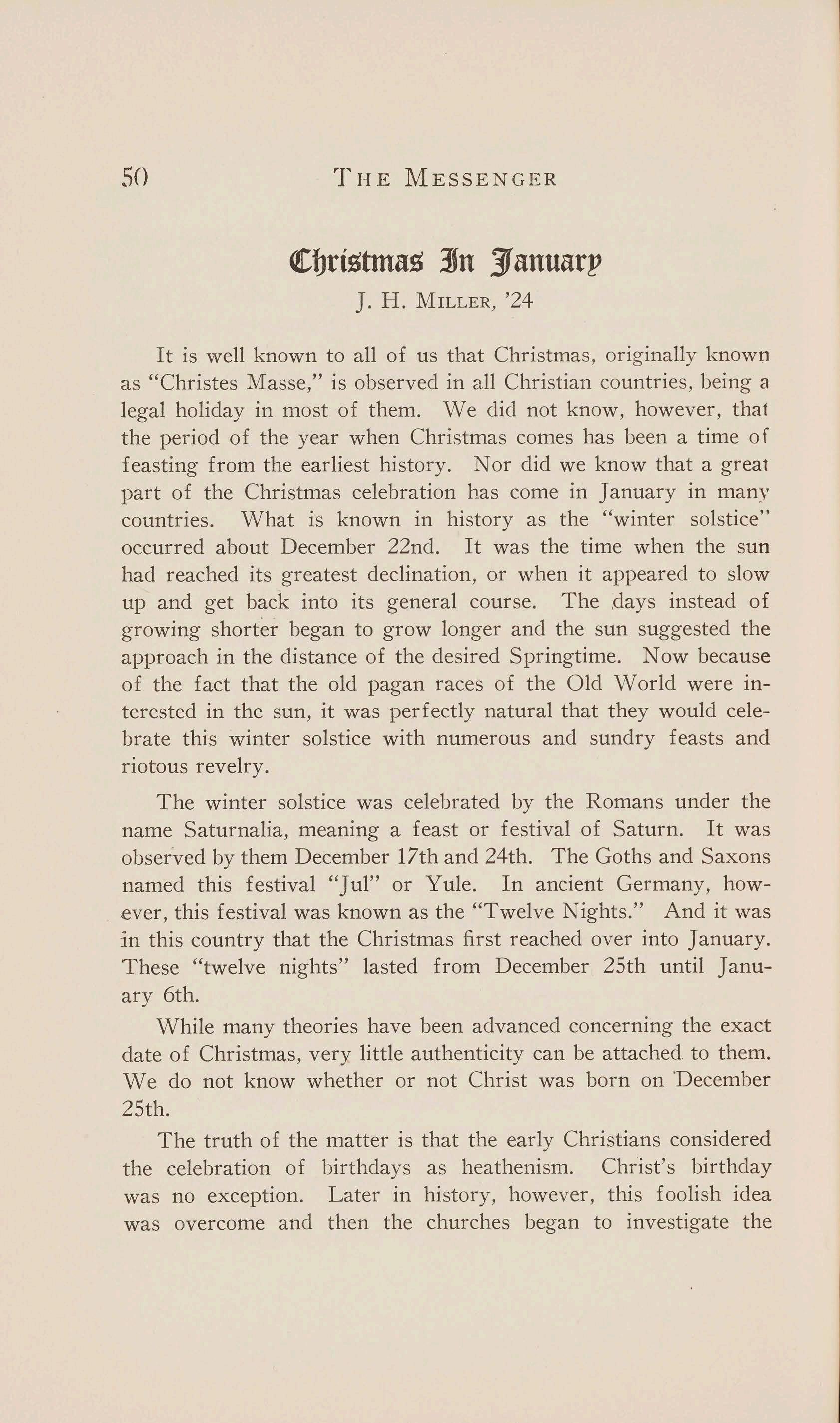
<!tbristmas3Jn3fanuarp
J. H. MILLER, '24
It is well known to all of us that Christmas, originally known as "Christes Masse," is observed in all Christian countries, being a legal holiday in most of them. We did not know, however, that the period of the year when Christmas comes has been a time of feasting from the earliest history. Nor did we know that a great part of the Christmas celebration has come in January in many countries. What is known in history as the "winter solstice" occurred about December 22nd. It was the time when the sun had reached its greatest declination, or when it appeared to slow up and get back into its general course. The ,days instead of growing shorter began to grow longer and the sun suggested the approach in the distance of the desired Springtime. Now because of the fact that the old pagan races of the Old World were interested in the sun, it was perfectly natural that they would celebrate this winter solstice with numerous and sundry feasts and riotous revelry.
The winter solstice was celebrated by the Romans under the name Saturnalia, meaning a feast or festival of Saturn. It was observed by them December 17th and 24th. The Goths and Saxons named this festival "Jul" or Yule. In ancient Germany, however, this festival was known as the "Twelve Nights." And it was in this country that the Christmas first reached over into January. These "twelve nights" lasted from December 25th until J anuary 6th.
While many theories have been advanced concerning the exact date of Christmas, very little authenticity can be attached to them. We do not know whether or not Christ was born on December 25th.
The truth of the matter is that the early Christians considered the celebration of birthdays as heathenism. Christ's birthday was no exception. Later in history, however, this foolish idea was overcome and then the churches began to investigate the
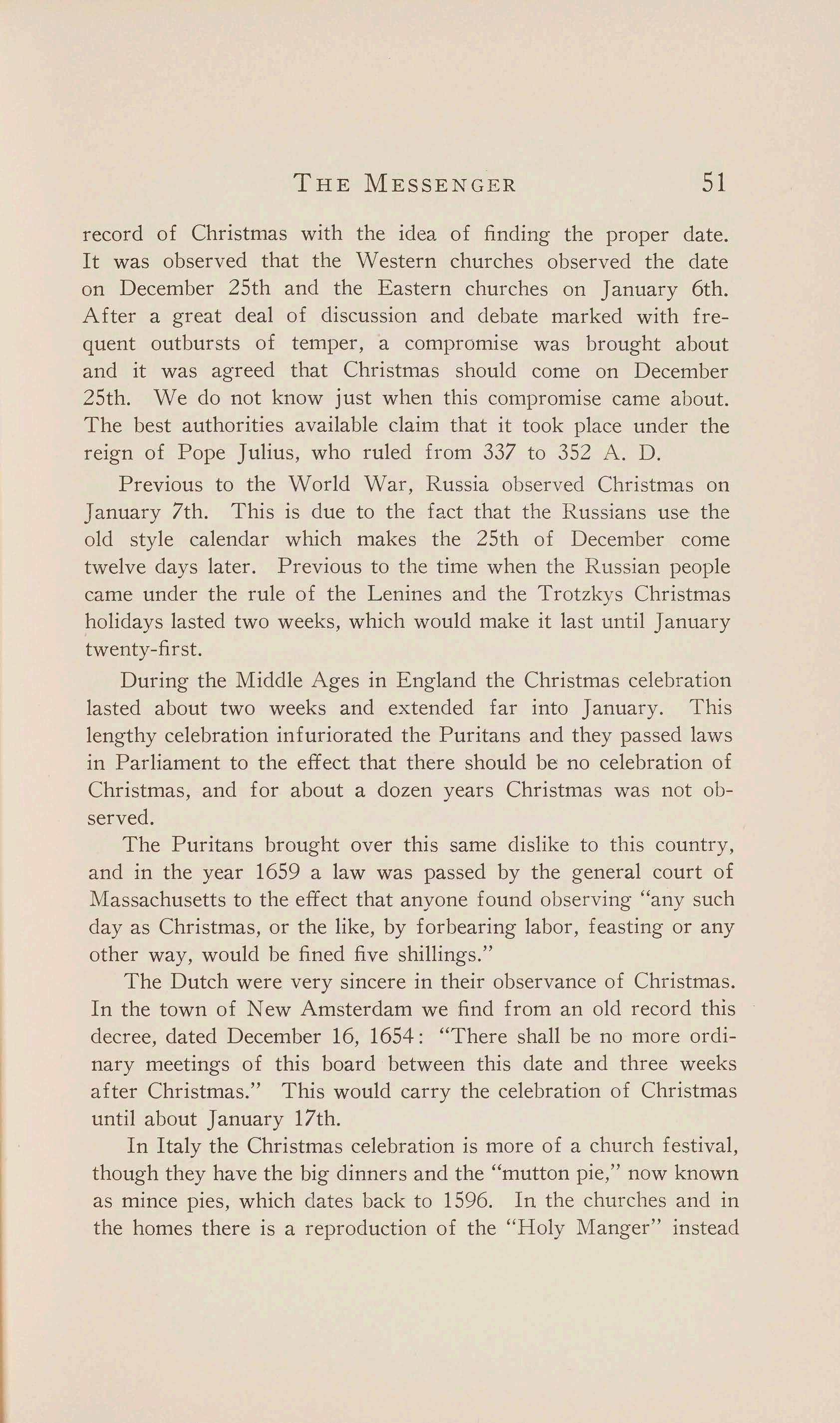
record of Christmas with the idea of finding the proper date. It was observed that the Western churches observed the date on December 25th and the Eastern churches on January 6th. After a great deal of discussion and debate marked with frequent outbursts of temper, a compromise was brought about and it was agreed that Christmas should come on December 25th. We do not know just when this compromise came about. The best authorities available claim that it took place under the reign of Pope Julius, who ruled from 337 to 352 A. D.
Previous to the World War, Russia observed Christmas on January 7th. This is due to the fact that the Russians use the old style calendar which makes the 25th of December come twelve days later. Previous to the time when the Russian people came under the rule of the Lenines and the Trotzkys Christmas holidays lasted two weeks, which would make it last until January twenty-first.
During the Middle Ages in England the Christmas celebration lasted about two weeks and extended far into January. This lengthy celebration infuriorated the Puritans and they passed laws in Parliament to the effect that there should be no celebration of Christmas, and for about a dozen years Christmas was not observed.
The Puritans brought over this same dislike to this country, and in the year 1659 a law was passed by the general court of Massachusetts to the effect that anyone found observing "any such day as Christmas, or the like, by forbearing labor, feasting or any other way, would be fined five shillings."
The Dutch were very sincere in their observance of Christmas . In the town of New Amsterdam we find from an old record this decree, dated December 16, 1654: "There shall be no more ordinary meetings of this board between this date and three weeks after Christmas." This would carry the celebration of Christmas until about January 17th.
In Italy the Christmas celebration is more of a church festival, though they have the big dinners and the "mutton pie ," now known as mince pies, which dates back to 1596. In the churches and in the homes there is a reproduction of the "Holy Manger" instead
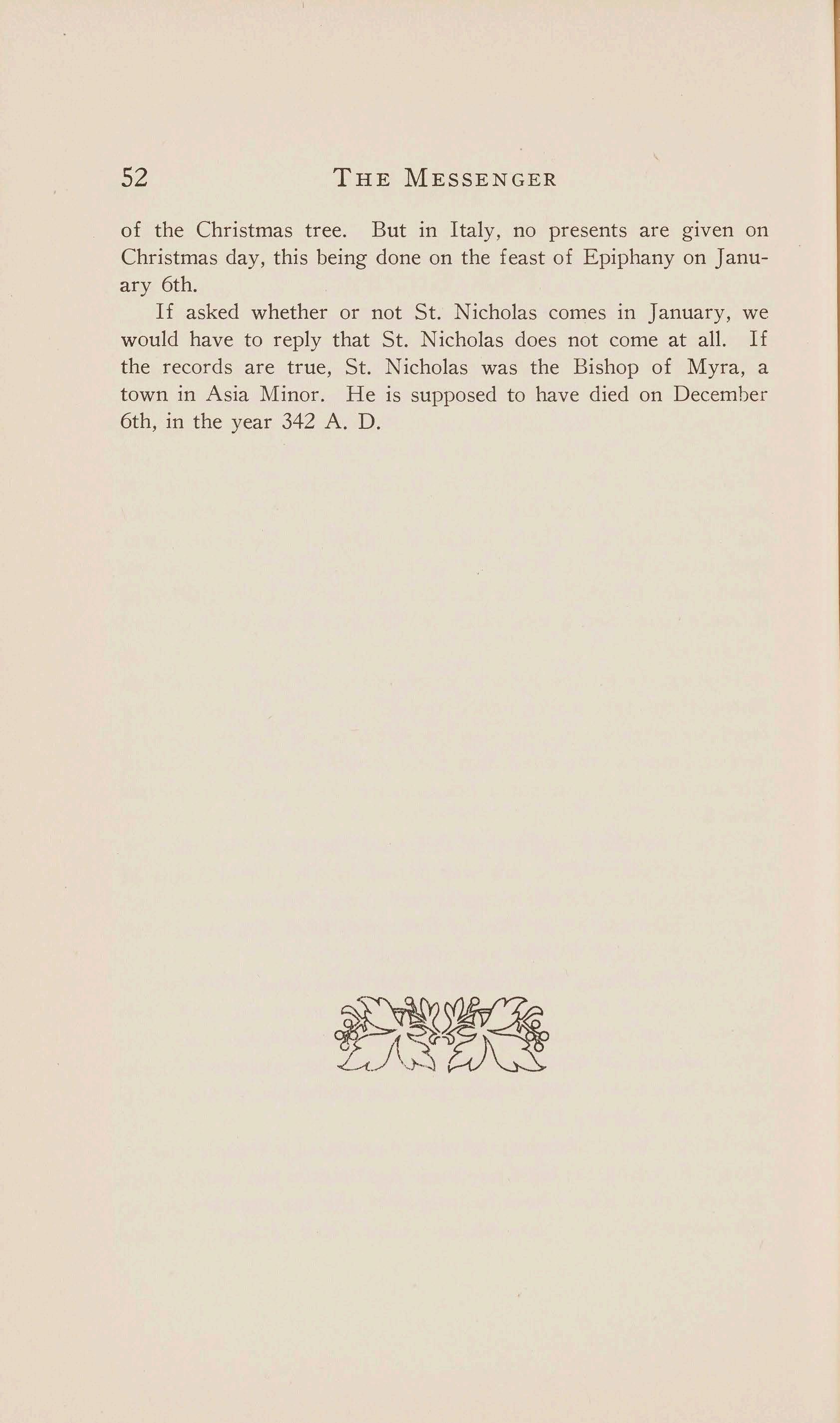
THE MESSENGER
of the Christmas tree. But in Italy, no presents are given on Christmas day, this being done on the feast of Epiphany on January 6th.
If asked whether or not St . Nicholas comes in January, we would have to reply that St. Nicholas does not come at all. If the records are true, St. Nicholas was the Bishop of Myra, a town in Asia Minor. He is supposed to have died on December 6th, in the year 342 A. D.
J"SookReuiew~
THE
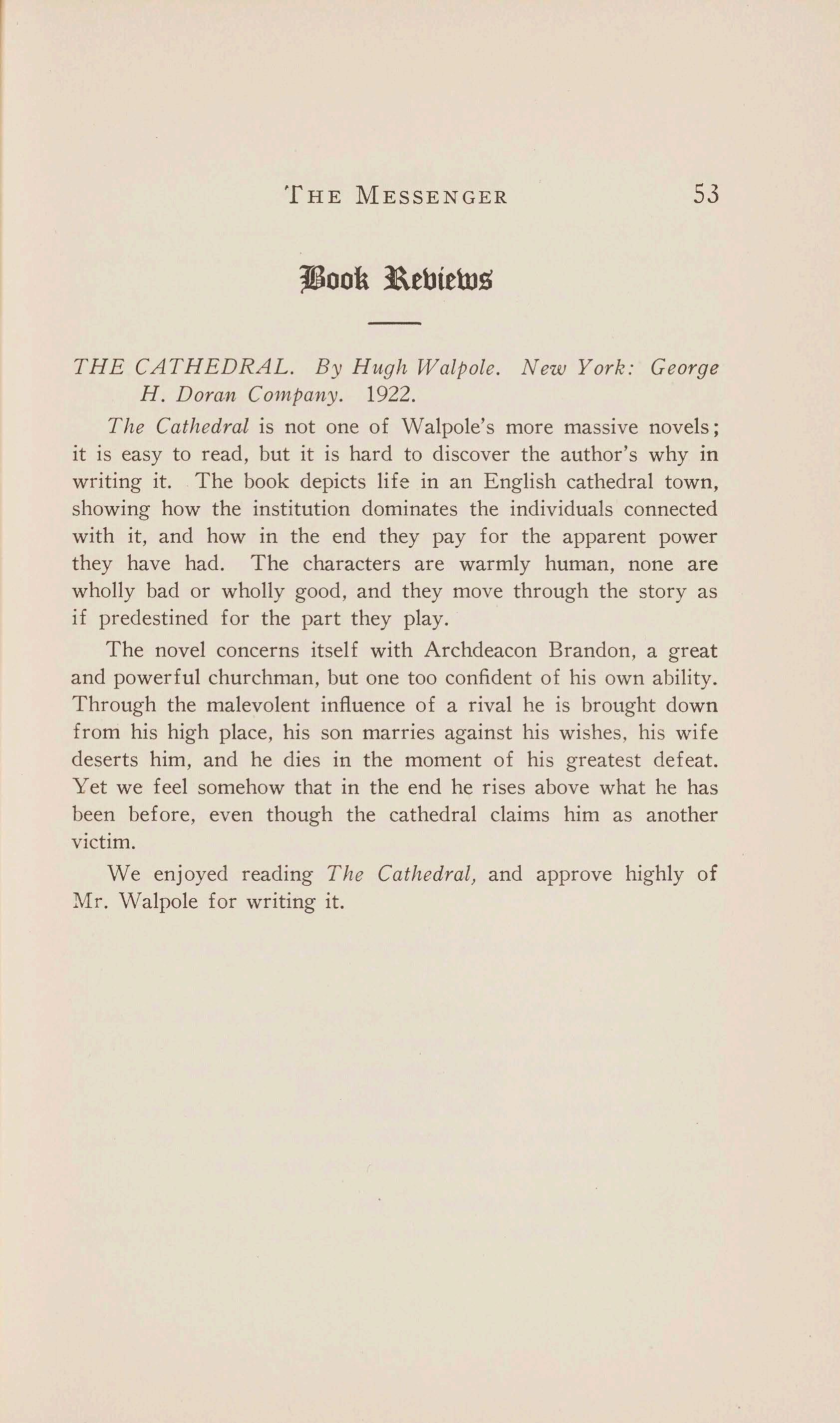
CATHEDRAL. By Hugh Walpole. New York: George H. Doran Company. 1922.
The Cathedral is not one of Walpole's more massive novels; it is easy to read, but it is hard to discover the author's why in wntmg it. The book depicts life in an English cathedral town, showing how the institution dominates the individuals connected with it, and how in the end they pay for the apparent power they have had. The characters are warmly human, none are wholly bad or wholly good, and they move through the story as if predestined for the part they play.
The novel concerns itself with Archdeacon Brandon, a great and powerful churchman, but one too confident of his own ability. Through the malevolent influence of a rival he is brought down from his high place, his son marries against his wishes, his wife deserts him, and he dies in the moment of his greatest def eat. Yet we feel somehow that in the end he rises above what he has been before, even though the cathedral claims him as another victim.
We enjoyed reading The Cathedral, and approve highly of Mr. Walpole for writing it.
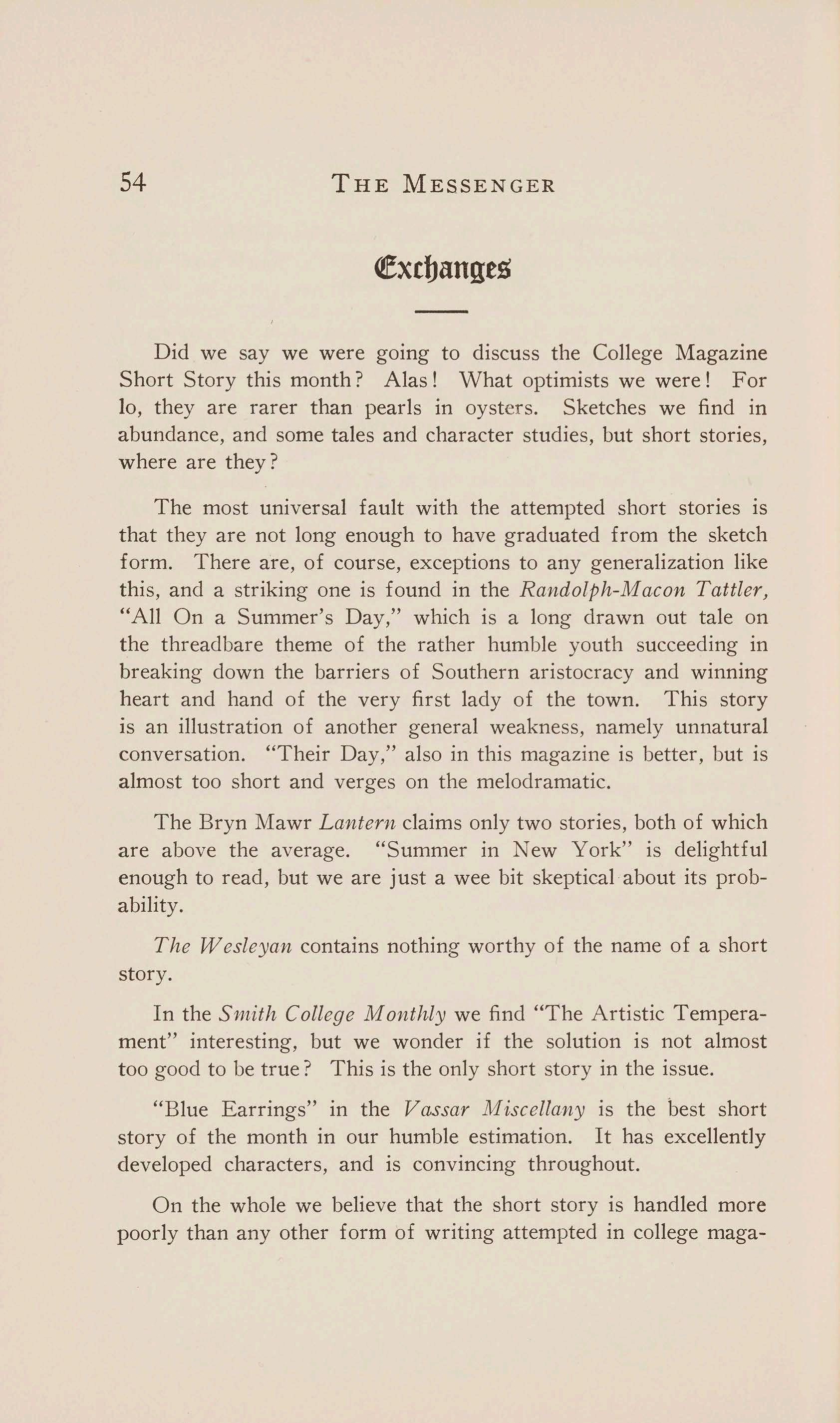
C!Excbange!i
Did we say we were going to discuss the College Magazine Short Story this month? Alas! What optimists we were! For lo, they are rarer than pearls in oyst er s. Sketches we find in abundance, and some tales and character studies, but short stories, where are they?
The most universal fault with the attempted short stories is that they are not long enough to have graduated from the sketch form. There are, of course, exceptions to any generalization like this, and a striking one is found in the Randolph-M aeon Tattler , "All On a Summer's Day," which is a long drawn out tale on the threadbare theme of the rather humble youth succeeding in breaking clown the barriers of Southern aristocracy and winning heart and hand of the very first lady of the town. This story is an illustration of another general weakness, namely unnatural conversation. "Their Day," also in this magazine is better, but is almost too short and verges on the melodramatic.
The Bryn Mawr Lantern claims only two stories, both of which are above the average. "Summer in New York" is delightful enough to read, but we are just a wee bit skeptical about its probability.
The W esleyan contains nothing worthy of the name of a short story.
In the Smith C allege Monthly we find "The Artistic Temperament" interesting, but we wonder if the solution is not almost too good to be true? This is the only short story in the issue.
"Blue Earrings" in the Vassar Miscellany is the best short story of the month in our humble estimation. It has excellently developed characters, and is convincing throughout.
On the whole we believe that the short story is handled more poorly than any other form of writing attempted in college maga-
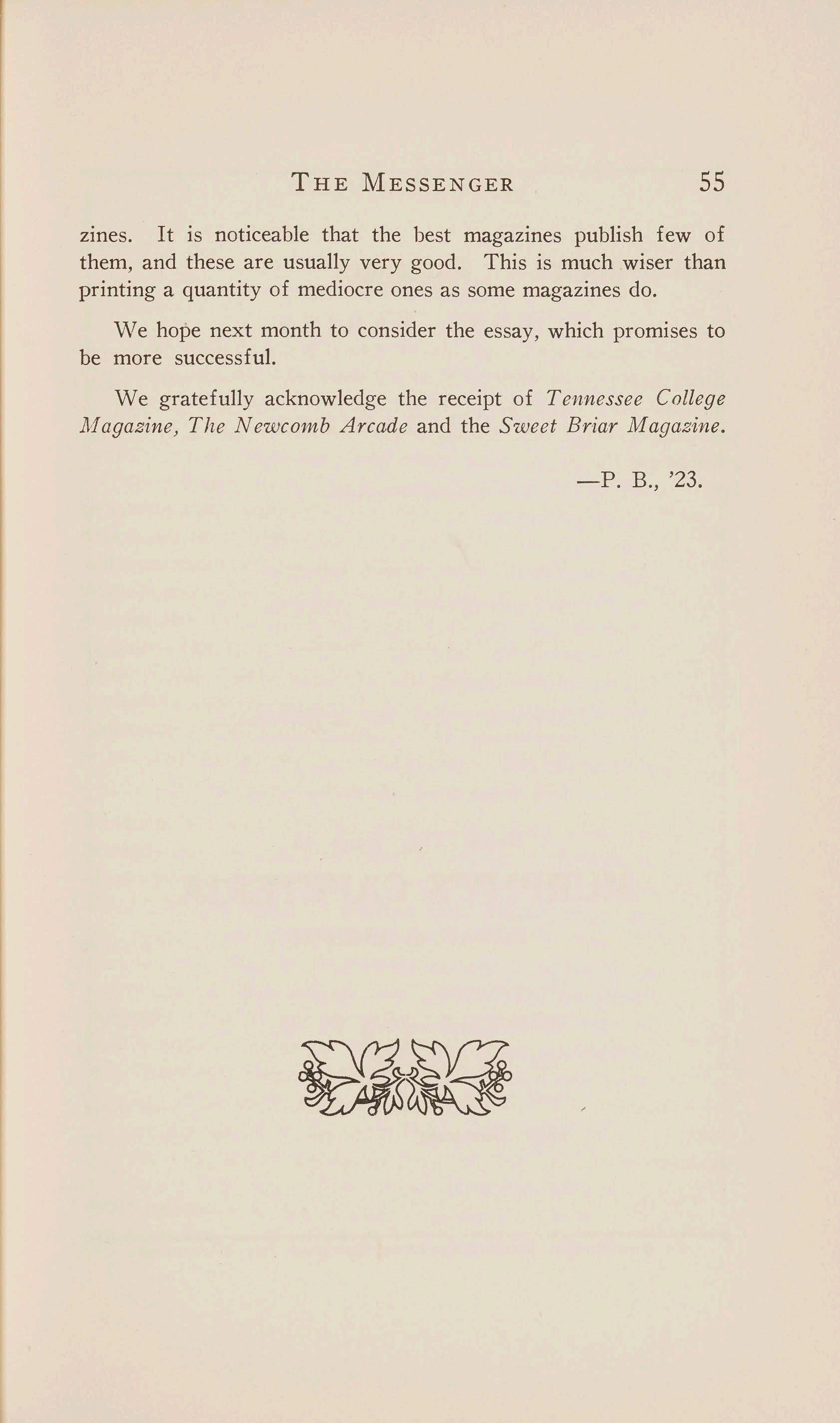
zines. It is noticeable that the best magazines publish few of them, and these are usually very good. This is much wiser than printing a quantity of mediocre ones as some magazines do.
We hope next month to consider the essay, which promises to be more successful.
We gratefully acknowledge the receipt of Tennessee College Magazine, The Newcomb Arcade and the Sweet Briar Magazine.
-P . B., '23.
RECIPROCITYLOW TARIFF or HIGH TARIFF?
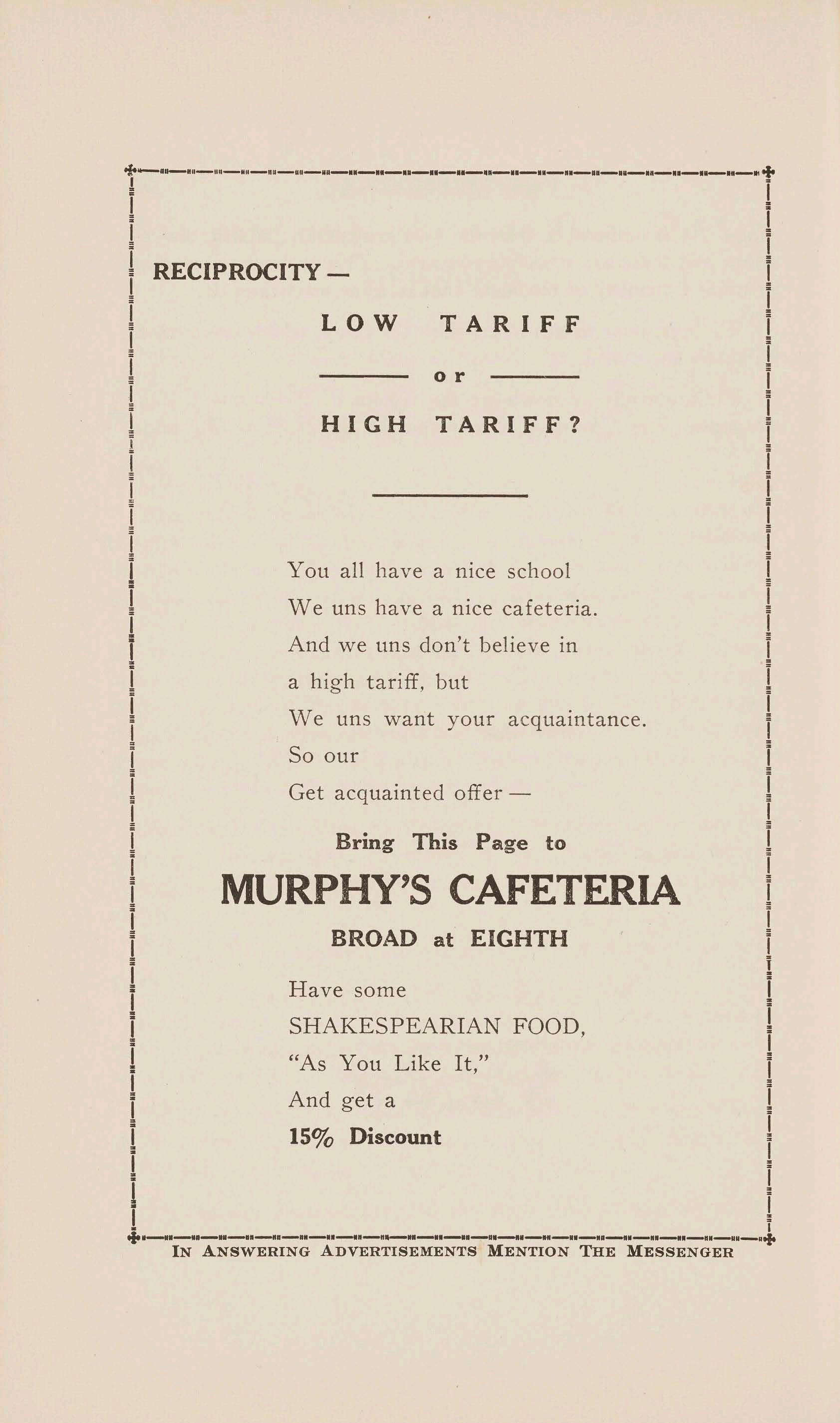
You all have a 111ceschool We uns have a nice cafeteria. And we uns don't believe in a high tariff, but We uns want your acquaintance. So our Get acquainted offerBring This
And
